
Title: America in the War
Author: Louis Raemaekers
Release date: July 21, 2021 [eBook #65889]
Most recently updated: October 18, 2024
Language: English
Original publication: United States: The Century Co, 1918
Credits: Charlene Taylor, Alan and the Online Distributed Proofreading Team at https://www.pgdp.net (This file was produced from images generously made available by The Internet Archive/American Libraries.)

AMERICA
IN THE WAR
BY
LOUIS RAEMAEKERS
EACH CARTOON FACED WITH A PAGE
OF COMMENT BY A DISTINGUISHED
AMERICAN, THE TEXT FORMING AN
ANTHOLOGY OF PATRIOTIC OPINION

NEW YORK
THE CENTURY CO.
1918
Copyright, 1918, by
The Century Co.
Published, October, 1918
List of Cartoons
| PAGE | ||
| The Stars and Stripes in the Service of Humanity |
2 | |
| “When I was a Child, It was You Who Saved Me” |
Hon. Myron T. Herrick | 4 |
| The Hun: “Keep Neutral” | Robert Underwood Johnson | 6 |
| Peace Plots Revealed in America and France |
John Jay Chapman | 8 |
| Belgium, 1918 | Ralph Adams Cram | 10 |
| “We will not Wear Convicts’ Stripes, Wear Them Yourselves” |
Poultney Bigelow | 12 |
| The Final Argument | Charles Hanson Towne | 14 |
| The End of the Hindenburg Line | Meredith Nicholson | 16 |
| “Something’s Wrong. She Doesn’t Seem to Inspire Confidence” |
Robert Grant | 18 |
| Angels of the War Zone | Gertrude Atherton | 20 |
| As Thou Sowest, so Shalt Thou Reap | Hon. A. S. Burleson | 22 |
| “Don’t Stop, Old Chap, Keep It Up!” | John Philip Sousa | 24 |
| “So We Are Only a Dollar-making People, Are We?” |
John Kendrick Bangs | 26 |
| “No, Thanks, I Know These Princes of Yours Too Well” |
Herbert Adams Gibbons | 28 |
| Speeding Up | 30 | |
| Toward the Valley of Decision | Rev. Stephen S. Wise, Ph.D., LL.D. | 32 |
| Wake Up, America! | Mary E. Wilkins Freeman | 34 |
| “There are Plenty of Lamp-posts!” | Hudson Maxim | 36 |
| “We Don’t Seem to Inspire Enough Confidence” |
Hon. Henry Cabot Lodge | 38 |
| German Submarines Fire on Open Boats |
Alice Brown | 40 |
| Not This Time! | 42 | |
| The President to the Workers | 44 | |
| “Well Done, Fellows! Keep the Home Fires Burning!” |
Hon. Lindley M. Garrison | 46 |
| A Bit of the Hindenburg Line | David Bispham | 48 |
| The Rats in Our Home Trenches | E. S. Martin | 50 |
| Seeing Stars | Booth Tarkington | 52 |
| The Two Giants | Hon. James W. Gerard | 54 |
| “Will They Last, Father?” | George W. Cable | 56 |
| “The Ugly Talons of the Sinister Power” |
John Burroughs | 58 |
| Restitution and Reparation | Ellis Parker Butler | 60 |
| The Only Possible Position for Traitors |
H. C. Chatfield-Taylor | 62 |
| “Do You Mean to Make a Real War?” | 64 | |
| Justice! | Basil Lanneau Gildersleeve | 66 |
| Another Peace Proposal | Henry Dwight Sedgwick | 68 |
| The Fine American Spirit | G. E. Woodberry | 70 |
| Poisoning the Well of Public Opinion | 72 | |
| The Enemy Within | William Roscoe Thayer | 74 |
| Count Von Bernstorff: “Noblesse Oblige” |
George Trumbull Ladd | 76 |
| Peter the Hermit | Ida M. Tarbell | 78 |
| The Germ-Man | Albert Bigelow Paine | 80 |
| “A Tid-Bit for ‘The Sick Man’” | Hon. George W. Wickersham | 82 |
| Plain Language from Truthful James | 84 | |
| Helping Hindenburg Home | 86 | |
| A Bad Prophet | 88 | |
| At the Holland Frontier | Hon. William Jennings Bryan | 90 |
| A Rehearsal | 92 | |
| The Path of Kultur | Edwin Markham | 94 |
| To the Victor! | Geraldine Farrar | 96 |
| The Eyes of the Army | Thomas Mott Osborne | 98 |
| “Is It Nothing to You, All Ye Who Pass By?” |
Rachel Crothers | 100 |
| The Rainbow Division Leaves for France |
Hon. Frederic Courtland Penfield | 102 |
| Russia Reborn | Edward Alsworth Ross | 104 |
| Higher Than a Sour Apple Tree | Samuel Hopkins Adams | 106 |
| “What a Mean Trick to Turn on That Strong Light!” |
108 | |
| Christmas, 1917 | Henry Mills Alden | 110 |
| Helping Uncle Sam to Get Up Speed | 112 | |
| The Wind of Democracy | 114 | |
| “This One for the Babies!” | Rev. Lyman Abbott | 116 |
| A Scene on the Somme | 118 | |
| Hollweg as Robespierre | J. G. Phelps Stokes | 120 |
| President Wilson’s Declaration | John Luther Long | 122 |
| “Don’t Stand in Our Way to Victory!” | George Haven Putnam | 124 |
| “German Soldiers Cut the Throat of an American Sentry” |
Cleveland Moffett | 126 |
| Bang! | 128 | |
| “I Must Break in Here Before That Comes Down” |
Palmer Cox | 130 |
| Bring Her In! | Charles Edward Russell | 132 |
| Germany’s “Peace” With Russia | Arthur Train | 134 |
| The Better Fighter | 136 | |
| The Dungeon of Autocracy | Hon. Maurice Francis Egan | 138 |
| “Hurrah for Peace, Lads!” | S. Stanwood Menken | 140 |
| Ecce Homo! | Robert W. Chambers | 142 |
| “We Must so Destroy France That She Can Never Resist Us” |
Rev. Hugh Black | 144 |
| The Japanese Mouse | 146 | |
| “Ueber Alles” and Underneath | 148 | |
| Expostulation and Reply | 150 | |
| The Second Election | 152 | |
| The Mad Shepherd | Alice Hegan Rice | 154 |
| “Sink Without a Trace” | Oliver Herford | 156 |
| Changing the Guard | Agnes Repplier | 158 |
| The Penitent Artist | 160 | |
| Peace Angels of Doubtful Purity | 162 | |
| The Black Flag | 164 | |
| The Annexation of America | Rear Admiral Robert E. Peary | 166 |
| “Welcome, Mate; You’re Just in Time!” | 168 | |
| The Editor | 170 | |
| German Intrigues in Mexico | Albert Bushnell Hart | 172 |
| German “Militarist” Socialism | William English Walling | 174 |
| The Old Hammer and the New | 176 | |
| The Spirit of Washington | 178 | |
| The Massacre of the Innocents | William Dean Howells | 180 |
| In the Ring to Stay | Harvey O’Higgins | 182 |
| “We Attacked the ‘Fortress of London’” | 184 | |
| Not a Bad Start! | Hon. Thomas R. Marshall | 186 |
| An Echo of the Luxberg Case | 188 | |
| German Chivalry to Wounded Officers | Hamilton Holt | 190 |
| Socialism in Germany | John Spargo | 192 |
| The Spirit of German Science | J. Mark Baldwin | 194 |
| Humanity and Her German Lovers | 196 | |
| The Strikers | Carrie Chapman Catt | 198 |
| 1776-1917 | William Allen White | 200 |
| “Now, Hindenburg, Bring on the Rest of My People” |
Hon. David Jayne Hill | 202 |
| The Master of the Hounds | 204 | |
| Processional | Cale Young Rice | 206 |
AMERICA
IN THE WAR[Pg 2]
“WE have no selfish ends to serve. We desire no conquest, no dominion. We seek no indemnities for ourselves, no material compensation for the sacrifices we shall freely make. We are but one of the champions of the rights of mankind. We shall be satisfied when those rights have been as secure as the faith and the freedom of the nation can make them.”
From President Wilson’s Message to Congress, April 2, 1917.
[Pg 3]

[Pg 4]
WHETHER it is that an invigorating climate has given our Anglo-Saxon blood a piquant Gallic flavor or because Europe sent us for ancestors only those light-hearted and adventurous souls with a spirit akin to that we admire in the French people, true it is that Americans have always had an especial liking for France and the French. They were our first allies as they are the latest. From Lafayette and Rochambeau to Joffre and Viviani, a host of Frenchmen have won the affectionate regard of Americans and are numbered with our national heroes.
But our relation to the French has a deeper foundation than admiration for a courageous and accomplished race which for centuries has made generous contribution to the sum of the world’s knowledge and achievement. The French were early settlers on this continent; LaSalle and Champlain were the forerunners of a host of French explorers and settlers whose descendants are today taking active and honorable part in the life of community and nation.
Before the war one of the foremost French statesmen said to me, with a certain note of sadness, that in the course of two thousand years of advancing civilization his countrymen had lost something of their initiative: that he believed it would not now, for instance, be possible to build up in France vast industrial organizations like those which are so effectual in establishing the commercial prestige of the United States.
If that were true before the war, it can scarcely be credited now. France has never failed to provide effective military organization for the protection of western civilization against the repeated attacks of her enemies from the east. She defeated the forces of Mohammedanism and saved Christianity. Time and again through the Middle Ages she beat back the invading Huns and kept them from overrunning Europe. The victory at the Marne which definitely stopped their latest irruption is only the latest and greatest of many such victories by which France has laid mankind under lasting obligation. And the industrial organization which supplies the armies of France with the products of farm and factory, and even produces a surplus for her allies, including the United States, is additional proof that the genius of the French race is neither decadent nor limited, but as broad as all human activity and as ardent today as when Joan of Arc inspired kings and peasants alike with her mystic fervor.
With their French allies Americans can work in most cordial understanding and sympathy. That subtle spirit of unselfish dedication to country which has won for the French the admiration of the world consecrates the alliance of the peoples who are giving their sons in common sacrifice to save liberty to the world. Out of the heat and turmoil of war bonds are being forged between the Allied nations which time and circumstance can never sever. On that alliance the hope of civilization depends; from it may come, in God’s good time, some great forward step in the march of progress which began at a manger in Bethlehem.
MYRON T. HERRICK.
Cleveland, Ohio,
March, 1918.
[Pg 5]

[Pg 6]
EVERY great event is an occasion for the moral education of the world. Froude, in his essay “On the Science of History,” says that the value of history is that it sounds across the centuries the eternal note of right and wrong. Along with the unbelievable calamities that have come in the train of the war that in August, 1914, was shamelessly, dishonorably and with malice aforethought precipitated by the Kaiser and his fellow highwaymen, there stands out one colossal good: it has made the world increasingly ethical. The flaunting by the German military party of all that we associate with fair play, chivalry, democracy, humanity, even Christianity itself, has aroused the Allied peoples to the fact that the foundation principles of happiness are at stake.
The brutality of the Teutons—Austrians and Germans alike—their willingness, in order to win, to throw away everything we think admirable in conduct, created a reaction in America by arousing us from our laissez-faire attitude to the conviction that there can be no neutrality between right and wrong. The opportunity should not be lost to enforce this lesson upon the young, who should be taught to hate the devilish spirit by which the Teutons are obsessed. In due time, when their defeat is accomplished, a reaction will set in among themselves. The cost is appalling, but I believe that nations, like men, can
Meantime, with what pride we realize that—as eventually even German historians will admit—our own part in the war is on a higher plane of disinterestedness than we have ever reached before, a level of altruism that has rarely, if ever, been attained by any other nation!
ROBERT UNDERWOOD JOHNSON.
February 22, 1918.
[Pg 7]

[Pg 8]
MR. RATHOM, Editor of the “Providence Journal,” whose exposure of von Bernstorff’s plots seemed to show a gift of necromancy, states that his information came to him through men and women (often Bohemians and Slavs) “who not only took grave risks in the work—for they were braving German vengeance—but gave up their time and in many cases their own funds, without a dollar of compensation from the ‘Journal’ or anyone else, in order to give us the facts which would prove to the American people the manner in which they were being tricked and fooled.”
If this cartoon of Mr. Raemaekers shall serve to make the native American take seriously a situation which is serious in the extreme, it will not have been made in vain. Whenever an American hears or overhears any one in any station of life uttering treasonous language, he should report the matter and give the name of the culprit immediately to the Secret Service,—not content himself with repeating the words at the club as a good story.
JOHN JAY CHAPMAN.
[Pg 9]

[Pg 10]
YOU, who on the tree of shame show forth again the Sacrifice of Calvary: you for whom scourge and thongs and the mockery of dull beasts are the circumstance of martyrdom: you who freely offered yourself that man might be saved, “yet so as by fire”:—Belgium! in the depth of your agony and the long torment of a red martyrdom, remember that the Cross of your own Passion endures only until the Resurrection that comes after the third day.
God, in mercy Incarnate, as Man suffered the shameful death of the Cross that the world might be saved from the penalty of its sins. The Tree of Scorn is raised up on Calvary, becoming the instrument of shame and of death, yet “the leaves of that Tree shall be for the healing of the Nations.”
Nails and spear, scourge and thongs, crumble and fall away; the obscene mockers “that watched Him there,” and watch you, O Belgium, go hence to that place prepared for them by Eternal Justice, but with the sun of Easter morning, behold a great wonder! The Cross, that was a dead engine of death, is transformed by Divine miracle. It lives, it throws out branches and leaves; it is now the Tree of Mercy, “and the leaves of that Tree shall be for the healing of the Nations.”
RALPH ADAMS CRAM.
[Pg 11]

[Pg 12]
[Mr. Raemaekers refers in this cartoon to the insulting proposal of the German Government, just before the entrance of the United States into the war, that American ships at the rate of one a week would be permitted to pass the submarine “blockade” if they were painted in stripes in a specified manner.]
WHEN Attila laid Rheims in ashes, cut the throats of his hostages, tortured his prisoners, and thus earned fame as the Scourge of God, he found priests and professors to justify his acts and to predict the speedy Hunnification of the world. Attila is to-day popular in Prussia—mothers have their babes called Etzel and when William II sends forth his armies he bids them be worthy of their illustrious namesake.
Attila was the first of the great Junkers. His army was largely German and he held court in the centre of Thuringia. He is the hero of Germanic song and legend; and his spirit animates the Hymn of Hate, the murder of Edith Cavell, the sinking of the Lusitania and above all the hired criminals who have been operating in America in the disguise of patriotic citizens.
POULTNEY BIGELOW.
Malden-on-Hudson.
Washington’s Birthday, 1918.
[Pg 13]

[Pg 14]
IN the now happily distant days of August, 1914, the people of the United States found themselves facing an opaque wall of neutrality. But we are an emotional people; and the rape of Belgium had hit us emotionally. Though we were asked not to applaud the pictures of Allied soldiers that flashed across the screen in every motion-picture theatre of the country, we did clap our hands; and, what is more, we valiantly hissed the Kaiser when he strutted before our view. Let the American people ever rejoice that in those first tragic days they had eyes of the heart. Oh, those months of shame for us who felt that the cause of England and France and Belgium was the cause of the United States of America! They have passed now, thank God; and the man of vision who first brought home to us what Belgium’s sorrow meant, was Louis Raemaekers. Each line he drew was a full platoon of soldiers advancing toward Berlin. His vivid, ironic pencil was a gun thrust at Prussian autocracy. His art opened the door in that opaque wall I have spoken of; and it was a garden that we looked upon—though a garden filled only with red flowers: the poppies of everlasting sleep; crimson blooms that spoke of the blood so nobly shed in the name of national honor; fiery blossoms that burst upon our gaze through the smoke of German guns; dark passion-flowers that breathed pain, but never despair. The sad garden of Belgium—this it was that one man of genius revealed to us, in all its pity and sorrow. And America looked, and wept, and sent messengers into that place of desolation. For never for an instant had we been neutral, never had we really dreamed of standing by and letting this agony go on. Had we done so, the years to be would have held only grief for us. We could not have lifted up our heads in the world of nations if we had not seized our splendid opportunity.
Who has ever doubted the integrity of the American people? As one man we rose when war was at last declared, and as one man we will fight, in the name of Democracy, in the name of Humanity, until the Prussian yoke is lifted from the Belgium we love and reverence. A task lies before us of unbelievable magnitude. But we shall not falter, we shall not fail; for if we fail, life itself must crumble in ashes on the hearthstone of the world. With a triumphant Kaiser, existence would be unbearable. The pacifists lay all the emphasis on mere living. They forget that most of us do not wish to live on a Prussian-ruled earth. Surely it is not much to die for a principle that is higher than the stars.
Louis Raemaekers, you have opened a door on life. You have brought news to thousands who had not heard and seen. And great is your reward.
CHARLES HANSON TOWNE.
[Pg 15]

[Pg 16]
THE Hindenburg line is a menace to every courthouse in America. In my recent journeys through the West I have never seen a courthouse tower printed against the sky without relating it to the great world conflict. We are fighting for all that is embodied and expressed and safeguarded in these citadels of democracy. A little while ago I looked with reverence at a log hut preserved at Decatur, Illinois, the first courthouse of the county. In that little room Abraham Lincoln appeared as attorney for pioneer citizens who understood perfectly the promise of American democracy. The laws invoked to preserve their rights were a crystallization of the thought and the hope of liberty-loving peoples, and no settler in wilderness or prairie, no matter how humble, but felt himself a partner in the benefits of American institutions and the great tradition of English law. Every American courthouse is founded upon Magna Charta. If we are indebted for anything in our democracy to the Teutonic-Turkish combination I am unaware of it. Dull of wit indeed, the Hohenzollern BEAST, to think his mailed fist could ever splinter the door of one of these American courthouses! The price our forefathers paid for their liberty was too great for any yielding to a devil gone mad and attempting to bestride the world. During the Civil War Lincoln once remarked to Seward, speaking of Weems’ “Life of Washington” which he had read before the fireplace in his father’s cabin in Spencer County, Indiana, “It occurred to me that it must have been something pretty fine those men were fighting for.” It was; and it is for that same fine thing that America has again drawn the sword.
MEREDITH NICHOLSON.
[Pg 17]

[Pg 18]
IT is Germany’s “Kultur,” her spiritual code, that is responsible for America’s entrance into the war; her gruesome sacrifice to Moloch of all which distinguishes humanity from the brute and the savage. It is her philosophy which has made us her horrified but resolute foe.
The fruits of her spirit stand forth alike in her speech and acts. “Kultur is a spiritual organization of the world, which does not exclude bloody savagery. It raises the daemoniac to sublimity. It is above morality, reason, science,” so wrote a Teutonic expounder in the first year of the war. “We have become a nation of wrath; we think only of the war. We execute God Almighty’s will, and the edicts of His justice we will fulfil, imbued with holy rage, in vengeance upon the ungodly. God calls us to murderous battles, even if worlds should thereby fall to ruins,” so wrote one of Germany’s poets. “Whoever cannot prevail upon himself to approve from the bottom of his heart the sinking of the Lusitania, whoever cannot conquer his sense of the gigantic cruelty to unnumbered perfectly innocent victims—and give himself up to honest delight at this victorious exploit of German defensive power—him we judge to be no true German,” so wrote one of her pastors. And for hideous, ruthless deeds which violate every sanctity and deify falsehood we need but cite her slaughter of children and the aged, her poisoning of wells, her shooting of nurses, her sinking of hospital ships, her brutal deportations and all the revolting sinuosities of her spy system.
It is this catalogue of crimes committed in the name of moral superiority that has incensed the American people. It is to combat “Kultur” which Germany extols as the quintessence of civilization, this gospel which constitutes military might the only inviolable law, that we have pledged our precious sons, our abundant resources, our supreme, indefatigable energies. If Prussian arrogance be not rebuked, Christian civilization fails. Hence the growing and embattled sentiment that a world in ruins yet free for man would be preferable to the sway of Satanic Teuton efficiency.
ROBERT GRANT.
[Pg 19]

[Pg 20]
I HAVE sometimes wondered if it is really possible to hate a country for which one has such unbounded contempt and disgust as one has for Germany. It is quite possible to fear without hate; one would not hate a rattlesnake or a shark, even at close quarters. On the other hand it is conceivable that you might hate a fearsome but still noble beast like the lion, if you were camping on the desert and he sat persistently in front of your tent, alternately licking his chops and shaking your soul with his loud anticipatory roars.
Usually we do fear what we hate. But the Germans have overshot the mark. They have been so dully and unchangeably brutal, that many of us have come to feel for them the same mental condition of loathing we should feel for an obscene, flat-headed giant running amok, while doing our best to hit him in a vulnerable spot. Even if they reached these shores and went automatically about disciplining the natives I feel sure we should continue to despise them and to find them ridiculous.
It is possible that if they had won the war in three months we should feel differently. Then we might have hated them for devastating France, but she it would have been who received our contempt. Her course in history would have been run; she would have been as degenerate as the Germans so fondly hoped. We might have hated Germany for subjugating so vast and potential a country as Russia, but we should have respected her might, the magnificence of her great army. We should have hated her roundly, and the hate would have done us all good, for it would have been a great emotion provoked by a great cause.
But Germany as a fighting machine is a failure. She has been defeated where she has been compelled to depend upon force of arms alone. Her only striking successes have been won by hitting below the belt, cowardly underhand methods, sneaking propaganda, millions expended upon buying human tools, and furnishing them with other millions necessary to work wholesale destruction, and sacrifice the helpless proletariat.
In the Death House at Sing Sing the robust murderers have no sympathy for the poisoner, refuse to admit him to that last tragic companionship. So it is with Germany. She is the poisoner, the Medici, among nations. From strangling her enemy with gas to bombing unfortified towns, torpedoing passenger ships and firing on the life boats, or sinking hospital ships, often carrying her own wounded to ease and plenty, she has merely shown herself the super-snake, supercharged with venom, not the lion, who proudly stands in the open spaces and challenges his enemy to battle. The bewildered expression on the faces of these German clods in the act of being rescued by British women nurses, while a home torpedo burrows in the vitals of the ship, is a fair portent of the minds of the German people after the war when they learn that they have been fooled, and martyred, and crushed, not by the enemy but by their own unregenerate rulers in Berlin. If they annihilate that caste and set up a Republic they may win back the respect of the world. Otherwise not. We sometimes forgive those we hate, but only a miracle forces a man to respect where he has both instinctively and thinkingly despised.
GERTRUDE ATHERTON.
[Pg 21]

[Pg 22]
CREEPING behind a mask—stooping, cringing and cowardly—the planter of sedition sows his seed in the dark. The masks behind which he hides are numerous and of great variety. No sooner is his identity disclosed than he assumes another disguise. Behind “Freedom of Speech,” “Liberty of the Press,” “Conscientious Objector,” and “Pacifism” he hides. He makes his masks similitudes of virtue. Whispered rumors, distortion of truth, appeals to fear, and appeals to prejudice are mixed with even the grosser seeds he sows. When other disguises are torn away he may fashion a mask of spurious patriotism. Most dangerous of all traitors is he who keeps just within the law of trespass while scattering afar his seed of sedition throughout the Land of Liberty.
A. S. BURLESON,
Postmaster-General of the United States.
[Pg 23]
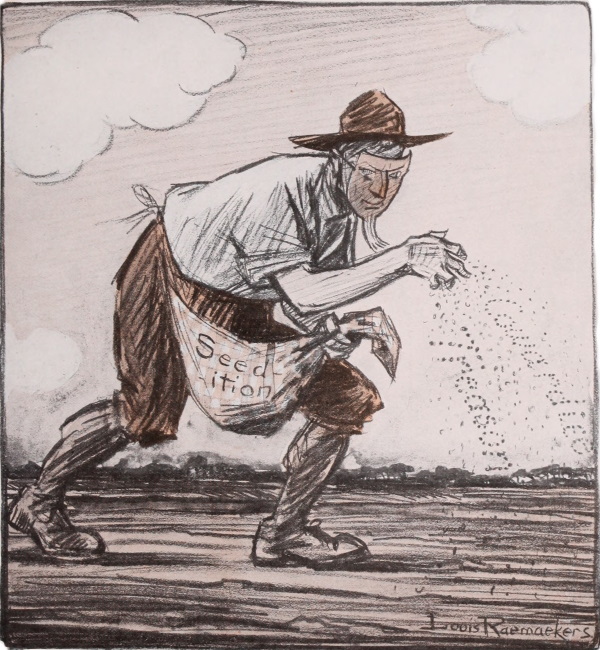
[Pg 24]
“CHEER up, Willie, the worst is yet to come. Don’t view me with alarm and suspicion. Don’t avert your eyes from my smile. It may be sardonic, but I cannot control my facial expression. I must look as I think. I am not like you, Wilhelm, looking God and thinking devil. Oh, but you are a cute one, friend of mine! I love you for a thousand things you have done, but don’t fool yourself, friend of my heart,—I beg pardon, I forgot, I have no heart. In that and some other aspects, Willie, we are as alike as two peas in a pod. Willie, we are so close in our method of working that I am going to give you permission to call me ‘Du’ hereafter.
“How in the world could or can you, for all these years, make the German people believe that the firm name of their Empire is ‘Me and God.’ You and I know that God withdrew His Name, His Goodness, His Honor and His Capital from the firm when you signed up as Emperor. God is a one-price God. God never adulterates His goods; God never advertises one quality and sells another. Since you have been Kaiser, Wilhelm, a multitude of firm names could be exhibited on the sign board; none of them, I imagine would rate high with Bradstreet, but they would be truthful. ‘Me and Ambition,’ ‘Me and Power,’ ‘Me and Ruin’ are a few I would suggest. Of course, your people would have shunned you just as a mother shuns a house with a Board of Health sign on it, had you given the real name of the firm. You are the most worried looking potentate I have ever met, Wilhelm. Yes, Wilhelm, there will be Hell to pay when your people awake to the fact that you have no partnership with God, but are simply a vassal of mine. I’d be scared out of my wits if I were in your place. While you are thinking of the horrible mess you have made of your manifold opportunities be good enough to note a deadly parallel. Once I was a prince, a prince in a vast and beautiful Empire where all was tranquillity, peace, holiness and bliss. I was called Lucifer, Son of the Morning—I had an all-absorbing ambition to rule or ruin. I revolted and seduced some restless spirits to ally themselves with me, fellows like your von Tirpitz. I rebelled against the King and Kingdom of Heaven. The King of Heaven still reigns and the Kingdom of Heaven still retains all its tranquillity and beauty. After the row was over I found myself in Chaos. From there I was rushed to Pandemonium, and it is needless to tell you that I am now in Hell—and it lives up to its name. Note the deadly parallel, Wilhelm, and while you are getting it into your noddle, I will whistle the music of our national Hymn of Hate so you can memorize it. Try it on your piano. The words are—
“‘Strafe Hope. Strafe Manhood. Strafe Womanhood. Strafe Everything
But
ME.’”
JOHN PHILIP SOUSA.
[Pg 25]

[Pg 26]
IT has for many years been a favorite gibe of thousands of foreigners, living for the most part upon inherited wealth, and taking the customary snobbish attitude of the consumer toward the producer, that Americans are “only a dollar-making people,” as Mr. Raemaekers has it in his forceful cartoon. Barring the word “only” perhaps the indictment is true—I hope it is. One of the fondest of my many fond wishes for my fellow-Americans is that they may all become successful dollar-makers, since he who makes his own dollars is able always to maintain his independence, to look his creditors large and small squarely in the eye, and live by grace of his own powers, and not by favor of potentate or patron.
There is nothing disgraceful about a dollar, and it may be said on its behalf that it differs from the Sovereign Incarnate of the Germans in that it is redeemable always at par, being worth the full one-hundred cents that it calls for; in that it rings true; in that whether it be of gold, of silver, or of paper, that which it promises it fulfills, and has never yet been known to dishonor itself. It may occasionally be seen in bad company, but it never falls below the level of its evil associations, and is genuine to the core. Loose thinkers sometimes speak of the “tainted dollar,” but there is no such thing. If any taint lingers near it is not in the dollar itself, but in the holder. So excellent, indeed, and so immune to the effects of evil association is the character of the dollar, intrinsically, that any one of Uncle Sam’s many billions could pass from the pocket of a Burglar into that of a Bishop, and be worthy of its latter estate.
I have yet to meet an American who confounds this true and honest servant of his well-being with his God, but, alas, I have met countless Germans who call it our American King, and themselves bow ignobly down to a Lord and Master whose assumption of a divine relationship has made of his life a prolonged blasphemy; a King whose deeds of savagery are a complete negation of his hypocritical pretensions to the possession of lofty ideals; whose ring is the ring of a brazen counterfeit, and whose word has been so dishonored by himself that it has become the synonym for worthlessness throughout the world.
If Kings or Masters of any sort must be endured who would not rather abase himself before the American Dollar, true and honest to the core, than debase himself by bending the knee to a Kaiser who by his infamies has made an Attila appear to be an Angel of Peace, a Bill Sykes a Gentleman, and the word of an Ananias a Bond of Faith?
JOHN KENDRICK BANGS.
[Pg 27]
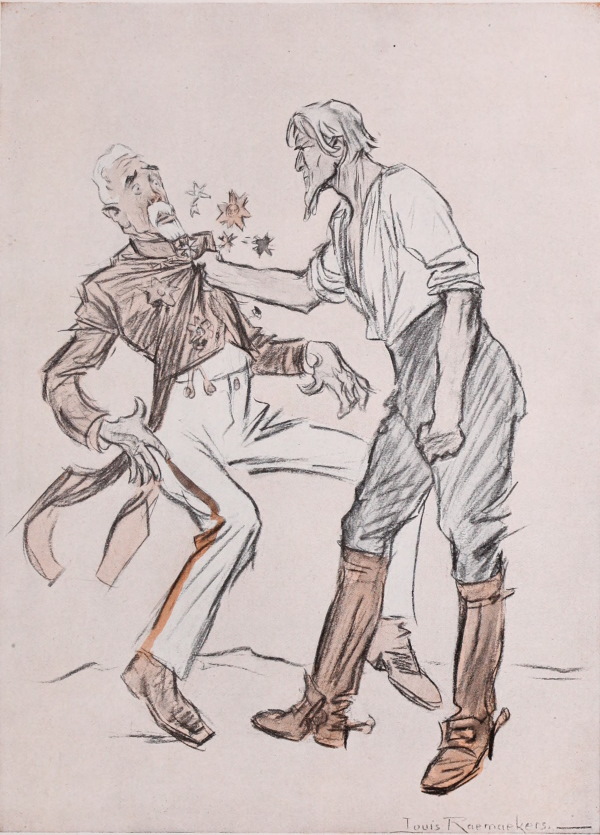
[Pg 28]
ON November 5, 1916, Poland was “restored” by Germany and Austria-Hungary to her old place as an independent member of the family of nations. High hopes were aroused in the hearts of the Poles. They had suffered for over a hundred years, and in this war of liberation, which was to form the Society of Nations, the Austro-German proclamation was the first recognition of their aspirations. The Entente Powers had committed the serious blunder of refusing to encourage the Poles for fear of offending Czarist Russia. But very soon the Poles realized that the Central Empires were playing them false. The “independence” was for to-morrow and not for to-day, and even for to-morrow it was contingent upon “being good.”
At the beginning of 1917, which was the year of national rebirth, hatred of Russia and resentment against the policy of expediency of France and Great Britain, as well as the necessity to accept the de facto Austro-German occupation, influenced most of the Poles to trust—in defiance of history and experience,—the good faith of Germany and Austria-Hungary. At the beginning of 1918, they had learned the lesson Raemaekers’ pencil eloquently depicts—not to put their trust in German princes. At Brest-Litovsk, “independent” Poland was refused a place in the peace negotiations. Answering President Wilson and Premier Lloyd George, Chancellor von Hertling impudently asserted that the future status of Poland concerned only her conquerors.
The cartoon, drawn to illustrate the scepticism of the Poles, should drive home a truth to the Americans. We must realize that camouflage is not confined to military operations. Its use to deceive armies is not so dangerous as its use to deceive the nations behind armies. From bitter experience the Poles are learning that behind the prince put forward as ruler is hidden German militarism and German imperialism.
This form of political camouflage is as dangerous for the United States as for Poland. Peace proposals may come to us—they will come to us—in plausible and appealing form. They will have the appearance of fairness and justice. What is behind them? What inspires them?
Our mission in this war is sanctified by its goal. To attain that goal we have consented to make sacrifices unprecedented in the history of our nation. From a purely military standpoint, no camouflage can possibly obscure the path to the goal, and the method of reaching the goal. The German armies, as yet unconquered, stand in front of us, defending the loot of German imperialism, won by German militarism. We must dispossess these armies of their loot, and punish them for having looted. But—alas!—diplomacy is at work in 1918 to attempt to save by wile what cannot indefinitely continue to be held by force. Every means of diplomatic camouflage will be used by our enemies. Our inspiration, our determination to pursue the struggle to the bitter end, will be kept alive only if we see, through various forms of camouflage, the spiked helmet hidden behind them. To make peace with Germany wearing the spiked helmet would mean to consecrate the success of her imperialistic policy.
HERBERT ADAMS GIBBONS.
[Pg 29]
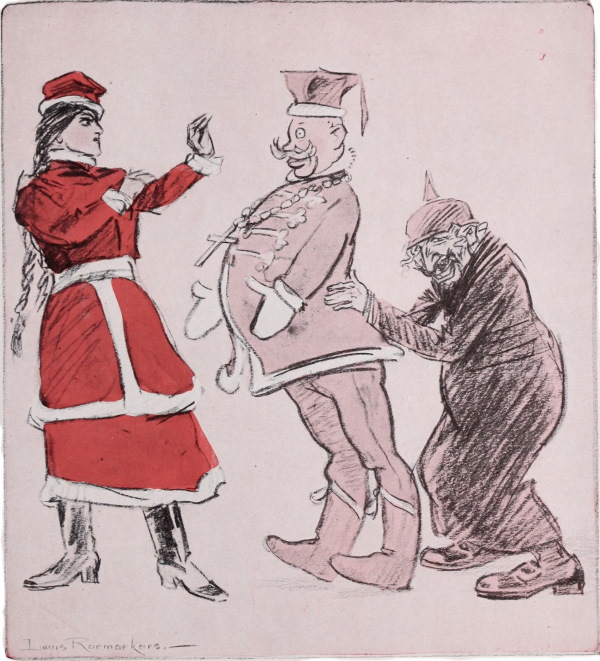
[Pg 30]
Uncle Sam: “I think I had better speed up and build a ship or two!”
| April | 8. | Keel laid. |
| 4th | day. | Double bottom completed. |
| 6th | ” | Frames and bulkheads erected and portion of shell plating finished. |
| 7th | ” | Stern-frame in place. |
| 14th | ” | Boilers put on board. |
| 21st | ” | Stern-post bored and stern-tube put in place. |
| 22d | ” | Masts stepped and engine installation begun. |
| 24th | ” | Funnel put in place. |
| 26th | ” | Machinery all in and engines completely installed. |
| Finishing touches. | ||
| May | 5 | (27th day). Launched. |
The building of the “Tuckahoe,” April-May, 1918, at Camden.
[Pg 31]
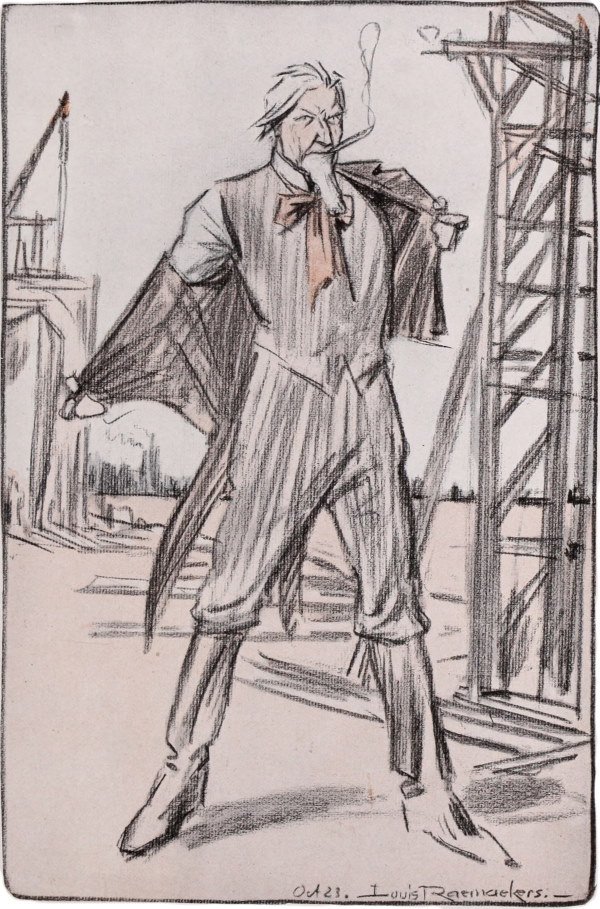
[Pg 32]
THEY shall go down to the Valley of Decision, multitudes of young Americans from East and West, from North and South, some slow to have gone into the war but none ever to go out until a Decision shall have been reached.
Into the Valley of Decision,—for a Decision final and irrepealable we are battling. Not a Decision as to the victor in the war, but a Decision that shall give us victory over war, its defenders and glorifiers! For the German Empire which wars made this war shall unmake.
We go down to the Valley of Death for a Decision whether the world shall be ruled by Germany or by civilization, be subject to Prussianism or master of its own fate and freedom.
And America knows the cost, which it refuses to count,—knows its sons must be slain if liberty and justice are to live.
To the God of Justice, America lifts its heart in prayer, beseeching not security for its beloved sons but vowing that the sun shall perish out of the heavens ere we and our Allies surrender our liberty, the freedom of the least of men, to the barbarism of force and the forces of barbarism.
Out of the Valley of the Shadow of Death shall emerge the Decision,—Never again. The war against war has brought freedom to nations, and secured peace to them that seek public right as the law of mankind.
STEPHEN S. WISE, Ph.D., LL.D., Rabbi of the Free
Synagogue, New York.
[Pg 33]
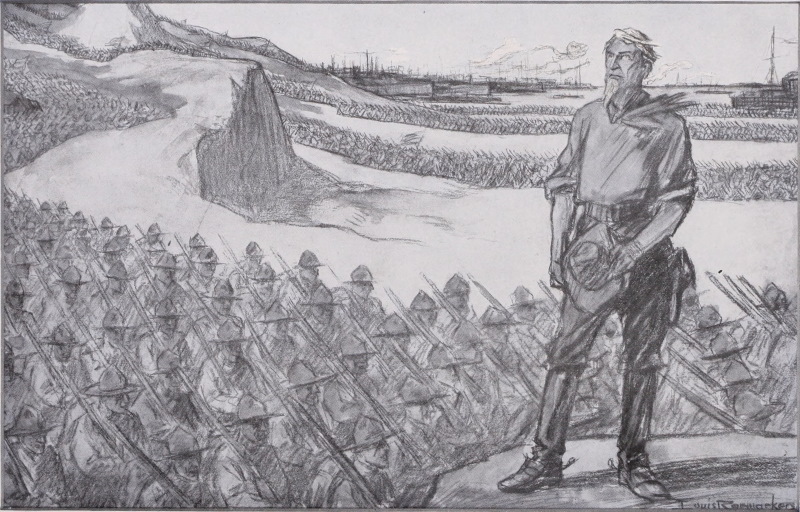
[Pg 34]
This was done to Canadians by the Huns
MARY E. WILKINS FREEMAN.
[Pg 35]
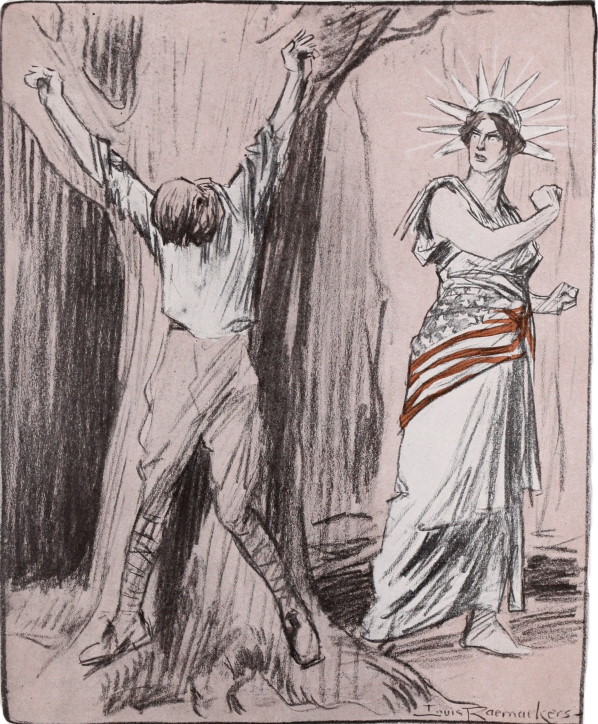
[Pg 36]
THERE are creatures that to be hated need but to be seen.
The sight of the serpent awakens all the dead, old body-memories of ancient ages, when that reptile was man’s ever-present, mortal enemy.
The domestic horse, made unafraid by a thousand generations, when he smells his ancient enemy, the bear, will rear and plunge to break and run for his life.
The face features a man’s character, his eyes window his soul. There are faces that instantly beckon all our better nature and bind us in loving thrall. There are other faces that repel us as the snake repels. There are human tongues voiced with the serpent’s hiss. There are persons about whom hangs an odor of the reptile that wakens all the dead old memories of primal hate.
The poet is born the poet. Genius is an inheritance. Human character is a summation of ancestral traits. So the traitor-spy is an atavic embodiment of all that is reptilian in a line of ancestry back to the serpent of Eden.
Though after-acquaintance may camouflage him to our eyes, still the first sight, the first impression of the traitor-character has in it the temper of aversion. One who has in him the heart and taste for atrocious conduct, one who has in him the grass-lurking viper’s soul, wears a warning in his face for the safety of others.
The true caricaturist—and Raemaekers is one—sees and accentuates what God has placed in the face of the scoundrel, the traitor, the spy, for our protection.
Great occasions are great opportunities for great genius. War exacts the supreme from all men and all women. Only the superlative poet can give the inevitable expression to master deeds on the stage of war, and only the supreme artist can picture them with the due and true inevitable expression, which is more aptly and more truly given in caricature than in any other form, because in caricature that and only that which is supremely characteristic is portrayed. Of all the artists of this world war, none has, better than Raemaekers, given in clean and lucid unit view, the true character of what he has pictured.
HUDSON MAXIM.
[Pg 37]
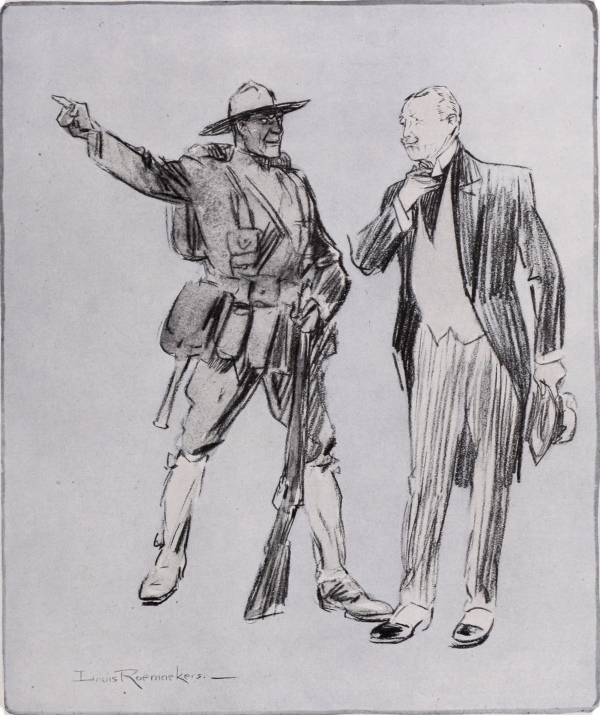
[Pg 38]
THE one memorable contribution to art produced by the great war is to be found in the cartoons of Louis Raemaekers. It is not necessary here to analyze the qualities of his fine and powerful drawings as art. They must be apparent to everyone who looks at them with considerate eyes. But Raemaekers’ cartoons also have a high literary and historic quality. I do not mean by this that they tell or suggest stories, which are used generally as an attraction for very commonplace pictures, but that they have that quality of enduring literature which awakens the deepest feelings and points to the loftiest ideals which are as enduring as the history of the race in its striving to reach the heights of achievement. Hogarth was one of the few men in the history of art who possessed these qualities, but great as Hogarth was, Raemaekers has always been upon a higher level. Raemaekers has the poetic imagination and we can feel in his work the
In his cartoons we find the appeal to all that is best in human nature, to the finest impulses of man, to his deepest passions and his noblest emotions.
All Raemaekers’ work is marvellously effective, but I take one single example, not perhaps the most important—his treatment of the rulers of Germany and Austria—in order to show his genius. By the power of his cartoons Raemaekers has fixed in the public mind a truer and deeper conception of the two emperors and the German crown prince than endless pages of print could possibly produce. The brutality, the over-weening arrogance, the hideous religious cant of the Emperor of Germany, with the touch of lunacy upon him, will live forever in Raemaekers’ portraits. The feeble senility of the late Emperor of Austria—joined as he frequently is with the Sultan and the King of Bulgaria, kindred spirits—a senility marked by the drivelling insensibility of extreme old age—those unlovely attributes are all there. As for the Crown Prince, he is known through these cartoons to millions who have never seen him and never will see him and will have only this image of him graven in their minds. As depicted by Raemaekers, he has a figure and face of low dissipation in which degeneracy and ferocity contend for mastery. And yet all these figures harmonize with the rest of the cartoons in teaching the one overpowering lesson as to the meaning of German victory. The barbarism, the belief in might as against right, the faith in brute force, the absence of human feeling,—these cry out to us through the pencil of the great artist that a world in which Germany should be dominant would be a world of slaves in which no free man could wish to live.
HENRY CABOT LODGE.
[Pg 39]
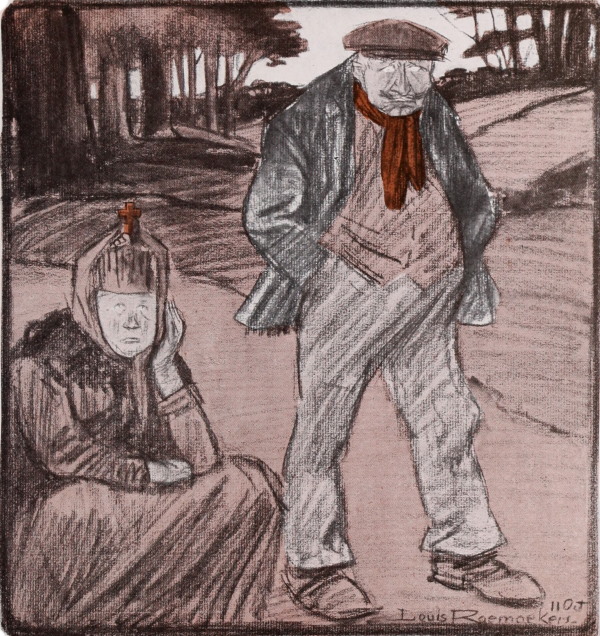
[Pg 40]
ALICE BROWN
Hill, N. H.
July 18, 1918.
[Pg 41]
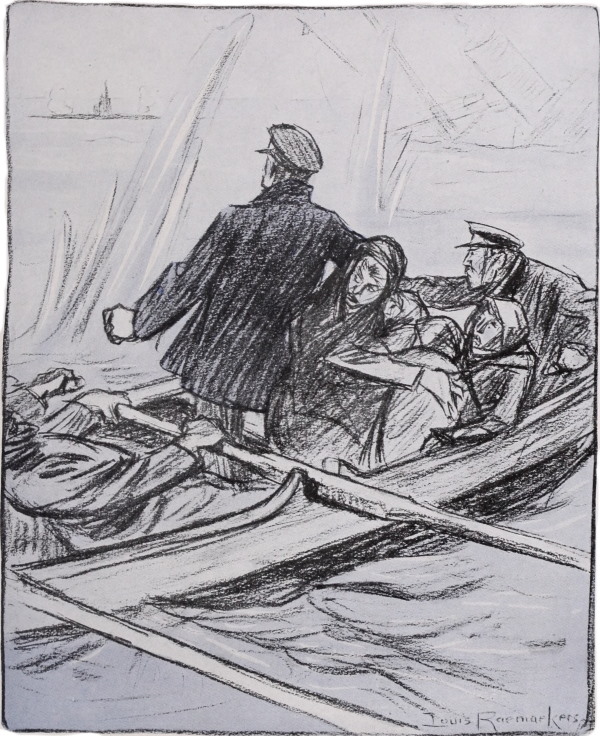
[Pg 42]
Raemaekers the Prophet
“FOR twenty years I have clearly foreseen Germany’s present attack on the world. For twenty years I have been drawing and publishing the same type of cartoons which have attracted so much notice since the war. Seven years before the war I was already being called ‘ein feind Deutschland’ by the German press. I cannot possibly express to you the unhappiness which I felt at being absolutely certain of the impending doom, and at the same time being incapable of making people foresee and believe it. My friends used to call me ‘the man who can see ghosts even in sunshine.’ Yet it was I, not they, who really knew the beasts as all the world knows them today; I was born in the little town of Lemberg near Roermond, at a distance of only a few miles from the German frontier, and have known the beasts all my life, not only in my own country, but also in theirs, which I have visited many times. I might almost say that I have visited it every year of my life. In Holland we have a saying that ‘even the best German has stolen a horse.’ I do not believe that there is any German who is not a pan-German. All of them suffer from this national and nation-wide megalomania.”
—From a conversation with Raemaekers reported in Eric
Fisher Wood’s “Note-Book of an Intelligence Officer.”
[Pg 43]
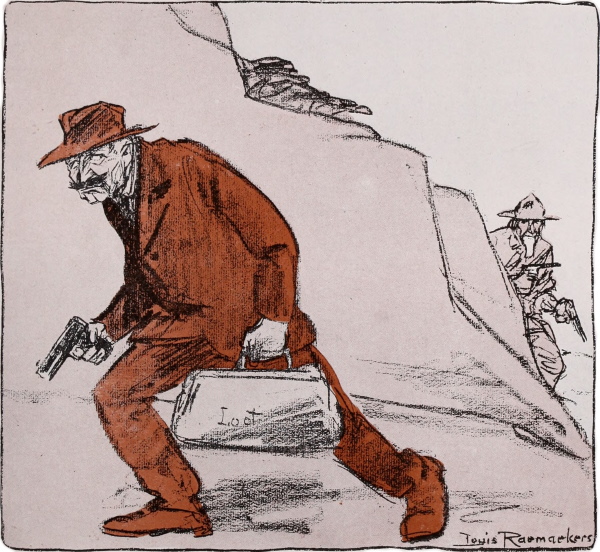
[Pg 44]
“If you are with me, I am with you.”
“IF we are true friends of freedom—our own or anybody else’s—we will see that the power of this country, the productivity of this country, is raised to its absolute maximum and that absolutely nobody is allowed to stand in the way of it. When I say that nobody is allowed to stand in the way, I don’t mean that they shall be prevented by the power of the Government, but by the power of the American spirit. If we are to do this great thing and show America to be what we believe her to be, the greatest hope and energy of the world—then we must stand together night and day until the job is finished.”
From President Wilson’s speech before the American Federation
of Labor, November 12, 1917.
[Pg 45]
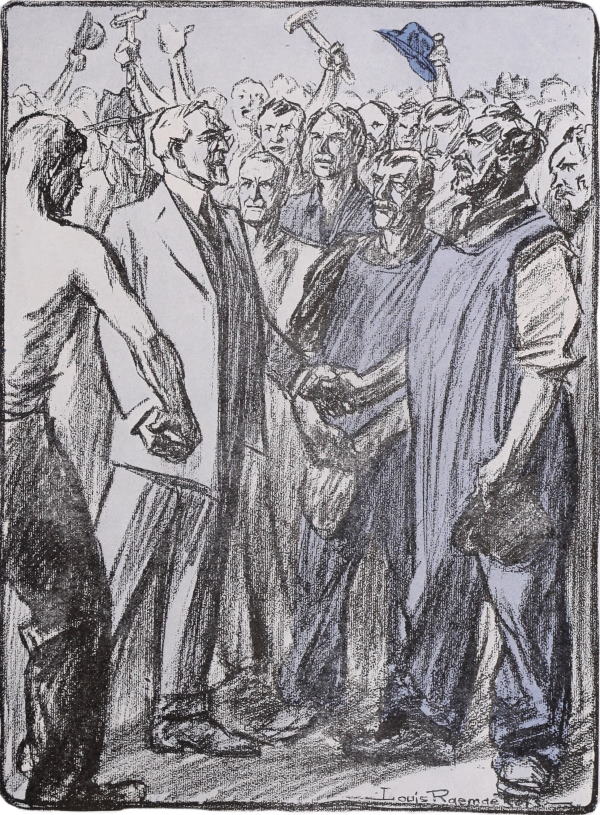
[Pg 46]
THIS cartoon brings home to us the imperative necessity of putting our own house in order and keeping it in order. If the world is to be made safe for democracy, our own conspicuous example of democracy must be made safe for those who dwell under its protection. If we cannot conquer and control the enemy within our gates, we will be but impotent instruments of conquest over him abroad. Both at home and abroad we must rid ourselves of all hampering and distracting illusions and stare the facts in the face. The facts are that we are at war,—the grim and grimy business of killing or being killed.
The issues involved in this war have been appealed to the sword, and he who lives by the sword must die by the sword. The time for doubt, debate, discussion or diplomacy is past. The only thing left to do is to fight,—fight for all that is in us,—fight as long as we can and as hard as we can, and until there is no fight left in our enemies. Then and not until then is it worth while to consider other aims,—so-called war aims. The only real war aim now is victory. We must not let anything distract us from that essential aim.
LINDLEY M. GARRISON.
[Pg 47]
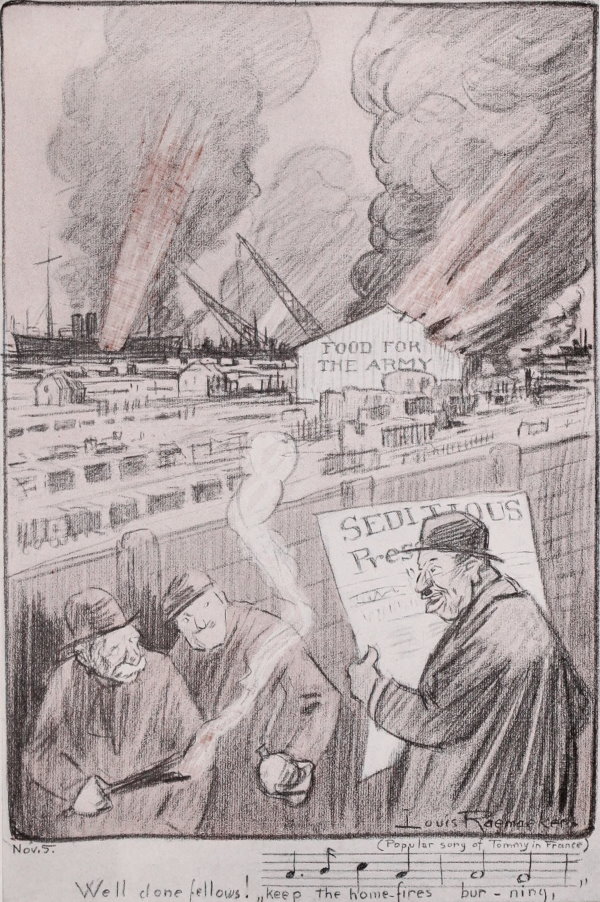
(Popular song of Tommy in France)
Well done fellows! “keep the home-fires bur-ning,”
[Pg 48]
THESE fellows are hot on
the trail. Let us follow
suit.
Wherever you find a Hun you
find an enemy. Get him!
DAVID BISPHAM.
[Pg 49]
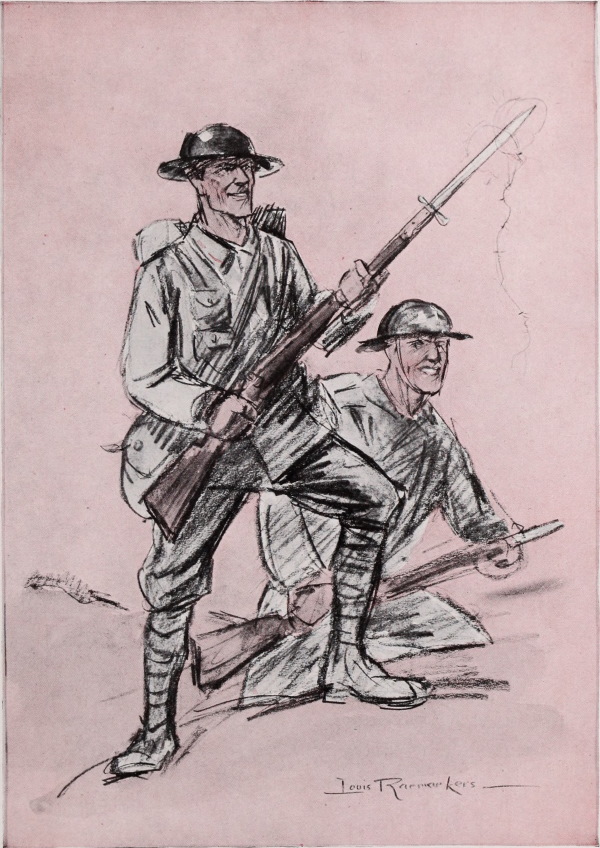
[Pg 50]
REALLY, the great question of the war is: What kind of people are the Germans?
Can they be reformed, or are they incurable?
All Germans are not alike. There are those who distinguish between North and South Germans, and tell us that the Saxons, in particular, have in them the making of excellent people. Doubtless all Prussians are not alike; doubtless all Bavarians are not of the type of the “Black Bavarians” whose exploits in the war have had unfavorable mention. But what has come to be the image that “German” calls up in the mind? It is an image of ruthlessness, of frightfulness, of poison gas and traceless sinkings; of murder, pillage, spies and lies; of a black and formidable ambition for mastery on any terms and at any cost; of treachery; of a tireless industry that gets up early to fetch away by work or wile whatever in the world is worth taking from any one who has it! The current image of the German is an image of an enemy—a savage enemy. Since 1914 German descent has been terribly prejudiced. As to every man of German blood the observer asks himself: What manner of man is this?
The Hohenzollerns did not invent the Germans. They found, acquired, trained and used them. For centuries—a thousand years at least—the Germans have had a known and demonstrated rating for brutality and brutishness. They have been cruel in war and destructive and greedy in pillage beyond most other nations that were their neighbors. When one hears it said that the trouble with Germany is Germans, there comes to mind abundant basis for that suggestion.
Yet the Germans are far too many and too useful to exterminate, and even if that were possible, no nation but Germany could seriously entertain the idea of exterminating a whole people.
So what do we come to?
To this: that Germany’s fate rests in the hands of the Germans. Their qualities will determine their destiny. Along with their abilities go enormous disabilities. They must do according to what is in them. They must obey the demon that drives them until, out of the extreme of suffering, they gain the courage to expel it. They must destroy, and so invite destruction, until their racial propensity has wrought its own correction. They must keep on accumulating enemies, exasperating neutrals, alienating allies, until blind and wicked policies have perfected their work.
What the German has most to fear is what is inside of him. By current estimate the worst that can happen to Germans has happened already, in that they are Germans. The world is not going to adjust itself to their misfortune in this particular. It is they who will have to adjust themselves to the world. They will not be able to make the world an overgrown Germany in which the other peoples will have to live under German direction. No. They will have to live in a world largely populated and managed, as now, by folks who are not Germans and don’t want to be, and whose primary concern for as long as is necessary will be to keep Germans in their place.
E. S. MARTIN.
[Pg 51]
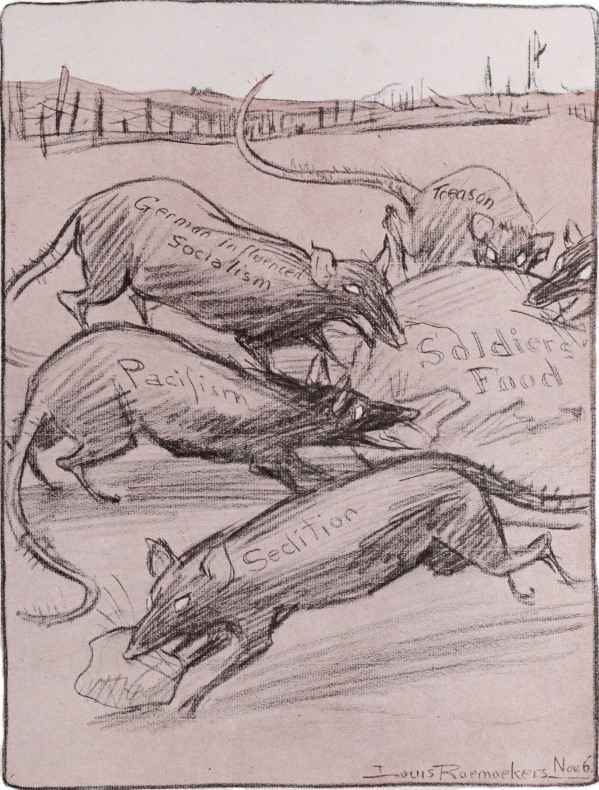
[Pg 52]
Canadian: “And you’ll soon see the Stars and Stripes.”
German: “Saw some already, sir.”
THIS is the voice that he hears from Germany:
“We Germans are God’s chosen people, His special favorites, and God is German Himself. God rules over us in the person of our Kaiser, whom He has appointed for that purpose. We are better than all other peoples of the earth; we are wiser and purer and nobler and more industrious and more learned and stronger and cleverer and kinder and braver and more spiritual and more warlike than all others.
“We are so much greater than they that whatever we do to advance our own interests, at the cost of theirs, is right and praiseworthy. If we kill a great many of them, those who survive will in the end be improved, because they will work for us and learn something by observing us. Any deceit is proper and morally correct if it benefits us; and when we practise a policy of terror upon those who oppose us it is really philanthropy and shows how gentle we are, because the survivors learn through our cruelty that it is useless to oppose us, therefore they the sooner submit their wills to ours. We can not do wrong, no matter what we do, so long as all that we do is for our own benefit. By our bright swords we will take possession of the earth which ought to belong to us, because we are Germans. We believe in the heaviest possible breeding of babies, that they may grow up and be trained to carry liquid fire and poison against any opposition to us. All the same, we are the only real peace-lovers in this malign and prejudiced world, which, except for us and the Austrians and the Bulgarians and the Turks, is composed exclusively of stupid ruffians who were so jealous and envious of us that they forced this war upon us, hoping to make some money out of us by annihilating us. We love peace, and are fighting for our mere existence—that is, the right to adjust our frontiers so that they will include the countries which we have conquered by the sword. We must never AGAIN be threatened by those rascals of Belgians!”
BOOTH TARKINGTON.
[Pg 53]
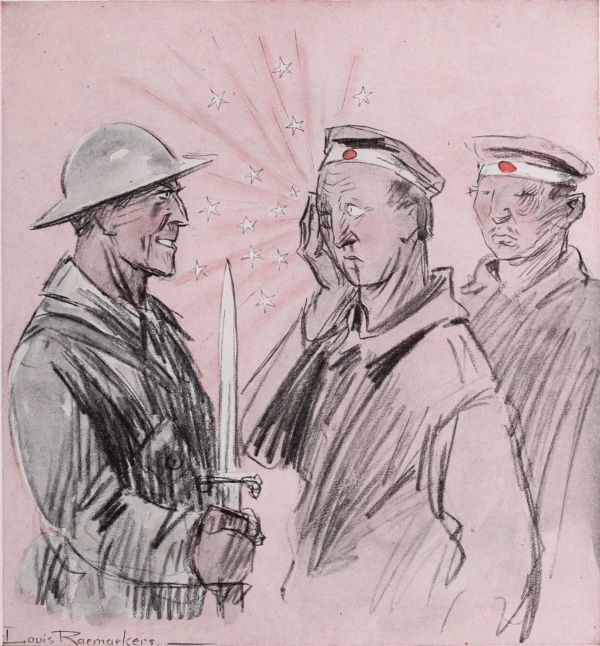
[Pg 54]
Germany: “I destroy!”
America: “I create!”
UNCLE SAM has given the Germans three surprises.
It was believed in Germany:—
1st—That America would not break diplomatic relations;
2nd—That America would never fight;
3rd—That America could not fight.
Forced to it, in self-defense, we are now giving all our energies to war, led by a President, whose vision meets the extent of the calamity brought on the world by the selfish ambitions of material Germany.
American built ships will end the menace of the slinking U-boat.
And after the war the flags of the American Merchant Marine once more will float on every sea.
JAMES W. GERARD.
New York, July 12, 1918.
[Pg 55]
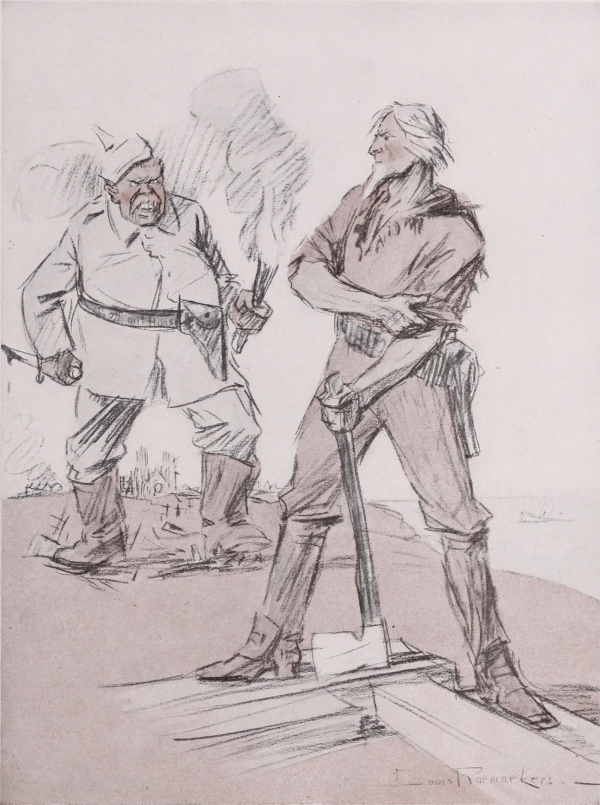
[Pg 56]
THE four greatest events in history; the advent of Christ, the discovery of America, the Reformation, and the French Revolution, are all we can compare with the days in which we are living—and dying.
In a cyclone of desolations surpassing the terrors of the insane, the world, so far from recoiling, rolls forward into vast and irrevocable changes that seemed but yesterday the remotest goals of laborious evolution; rolling up the precipitous steep of custom in all the fury with which we should look to see it roll down. And the unique wonder of this fifth and last of these supreme events is that only it has sprung primarily from an evil design and can attain its true end only by that design’s everlasting overthrow.
So speaks the matchless hand of Raemaekers. The vastest murderer the race has ever borne and, at his heels, his most remorseless waster of blood together watch the glass of time, abhorring every upward plunge of a maddened world and daily hounded by one implacable question, one four-headed dog of hell: Will their treasury, will their sinking of ships, will their delusion of their own people, last?
No. One or another will presently fail, and when one fails all fail and the world, refined by fire, will be, shall be, saved.
GEORGE W. CABLE.
[Pg 57]
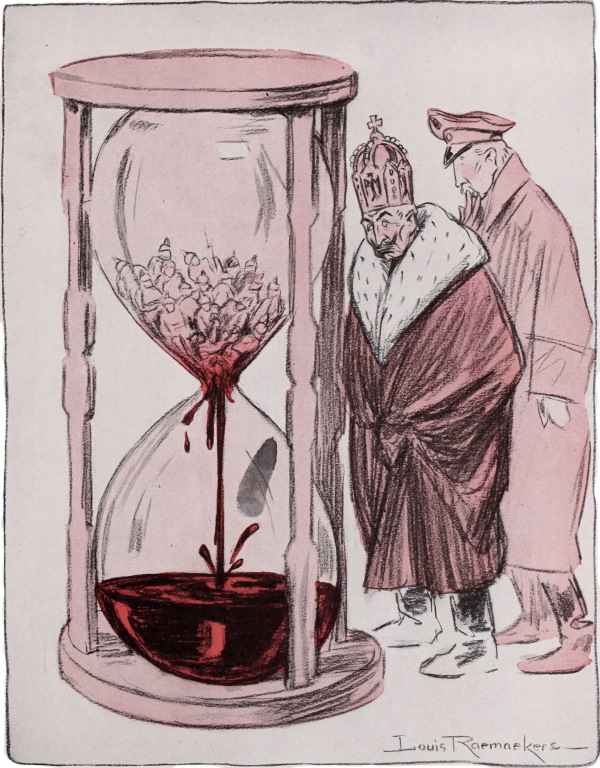
[Pg 58]
THE attitude of scorn, of contempt and of defiance with which Raemaekers in his cartoon, “America’s Choice,” represents Uncle Sam as he confronts the treacherous Kaiser, bearing the olive branch in his talons, well expresses the attitude of the United States towards Germany at the time we entered the war, and this attitude will probably continue for a generation or two after the war ends.
“The Intolerable Thing,” which President Wilson so aptly named the irresponsible German Government, can never disguise itself so that we will not detect the terrible menacing claws with which Raemaekers portrays the Kaiser. It will continue to be an Intolerable Thing until the horrors of this war are forgotten.
The German philosophers brazenly justify their nation’s course in this aggressive war with all its attendant horrors, by an appeal to the Darwinian doctrines of the struggle for existence, and the consequent survival of the fittest, which play such a prominent part in biological evolution.
Germany must be taught the lesson that while man is the product of evolution like all other creatures, yet in his case new factors come into play—he is a part of the animal kingdom, but is a new kind of animal, and new factors, not operative in the orders below him, have played leading rôles in his development. These factors are his reason, which gives him a sense of the true and the false, and his conscience, which gives him a sense of right and wrong. These faculties subordinate the rule of might to the rule of right, and they have resulted in the establishment of conduct for individuals, for communities, and for organized governments that do not exist in the lower animal orders, and only in a limited sense in the lower human orders.
Amid a national rejoicing, a waving of flags and ringing of bells, such as are evoked by a great national festival, the Germans celebrated the Lusitania murders—the entire nation suddenly slumping into a barbarism worse than that of their ancestral Huns. The Hun was again triumphant, gloating over his unspeakable crimes, his plunders and piracies, his orgies of crime and lust—a spectacle to make the Genius of Humanity veil her face and weep tears of blood.
It is a comfort to know that the Allies have killed or rendered harmless several million of these modern barbarians, and that many of their carcases have gone to enrich the soil of France and Belgium. In this way a dead Hun may help to undo some of the evil which a living Hun has wrought. If two or three of their bodies could be planted in every shell hole which their guns have made in France and Belgium, though the inoffensive soil might sicken, yet in the course of years the poison of the Hun would disappear, rendered innocuous by the beneficient alchemy of Nature.
JOHN BURROUGHS.
Tryon, N. C.
February 12, 1918.
[Pg 59]
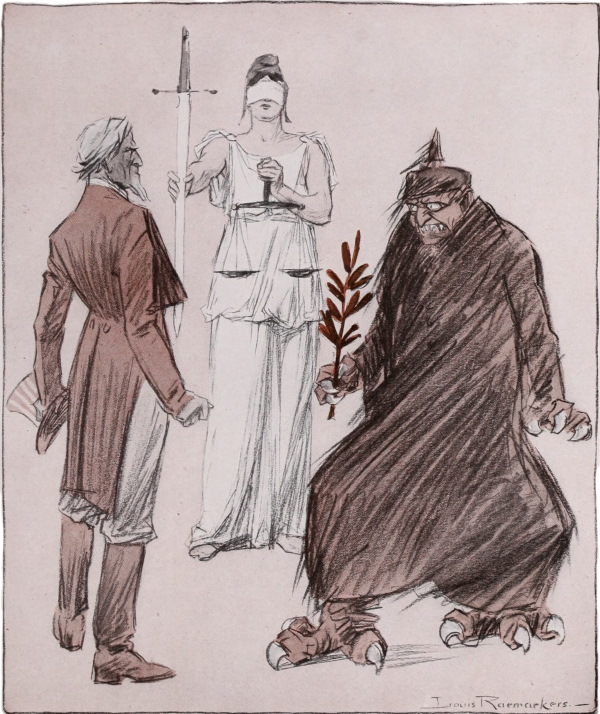
[Pg 60]
IT is with good reason the Prussian covers the thick bone of his head with a helmet, for into it ideas of right and justice can only be battered with a club. The tough, club-resisting helmet is the arch-symbol of Prussianism. From its earliest days Prussia has taught its neighbors the Prussian theory of right and justice by means of a club. When the Prussian wishes to educate his neighbors to an appreciation of Prussian ethics he puts on his helmet, picks up a club and slugs the neighbor on the head.
The Prussian theory of right and justice is this: “What is mine is mine. What is yours is also mine if I want it.”
This idea is deep buried beneath the thick bone of the Prussian head. He holds it with stolid stupidity and deep, prehistoric crudity, like a pig or an idiot. He cannot understand that there are any rights higher than Prussian greed. “If I want it, it is mine because I want it.” It is the logic of the primitive human animal, the cave-man.
Cornered and accused of his thefts he clings to his loot like the pig that has stolen a carrot. When asked to disgorge he is shocked by the suggestion. “But they are mine! I wanted them, so they are mine!” he says. Right and Justice answer, “They are not yours; you stole them.” “Maybe so!” says the Prussian. “But just the same they are mine—I stole them a long time ago.”
The logic of the Prussian fills ten thousand volumes. It is written in hundred-line paragraphs and six-inch words. It can be condensed into two short words—piggish greed: piggish because it knows neither right or justice, greed because it is greed.
ELLIS PARKER BUTLER.
[Pg 61]
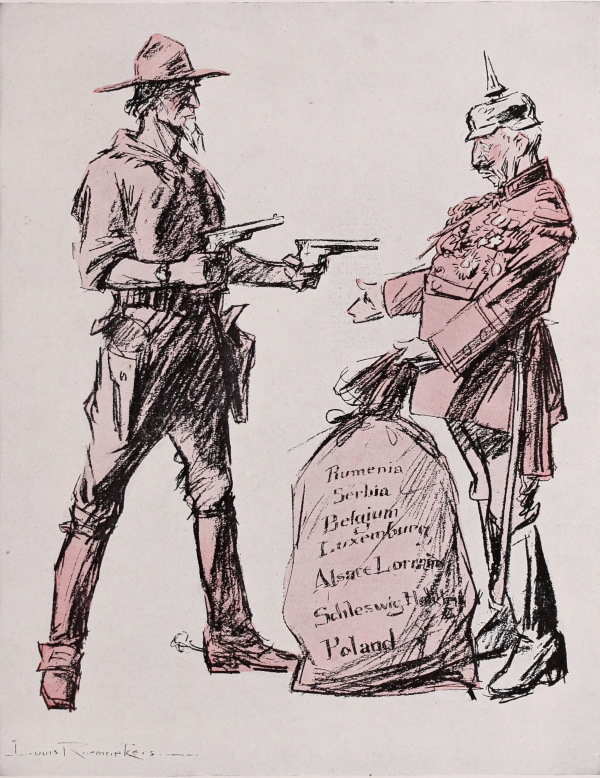
[Pg 62]
WHILE the submarine controversy was at its height, a Hun high in authority in his nefarious land said that it was impossible for the United States to enter the war, because there were a half million German reservists in our country. “That is true,” replied the American to whom this contemptuous remark was addressed; “but there are also a half million lamp-posts.”
Since the German reservists have failed to fulfil the expectations of the Fatherland, the lamp-posts of the United States are as yet unadorned with their lifeless bodies. But history has shown that while Americans are an easy-going race, when once their anger is aroused there is no withholding it; therefore let the traitors in our midst take warning from the cartoon upon the opposite page.
One may pardon a murderer who kills in a moment of passion, one may even revere a military spy who penetrates an enemy’s lines to gather information needful for victory; but for the skulking traitor who whispers sedition within the land which harbors him and seeks to hamper the efforts of its government by a stealthy means, no punishment seems too severe, since of all crimes his is the most despicable.
It is not to the half million German reservists alone that Mr. Raemaekers’ warning is addressed; for, inconceivable though it be, there are native-born traitors aplenty to shame the land which gave them birth. For these, the only position which will seem possible to Uncle Sam, when once his anger, ever slow to rise, bursts forth in righteous indignation, will be the one which Mr. Raemaekers has depicted. Let these traitors remember that there is an abundance of lamp-posts in the land as well as a goodly supply of hempen rope.
H. C. CHATFIELD-TAYLOR.
[Pg 63]
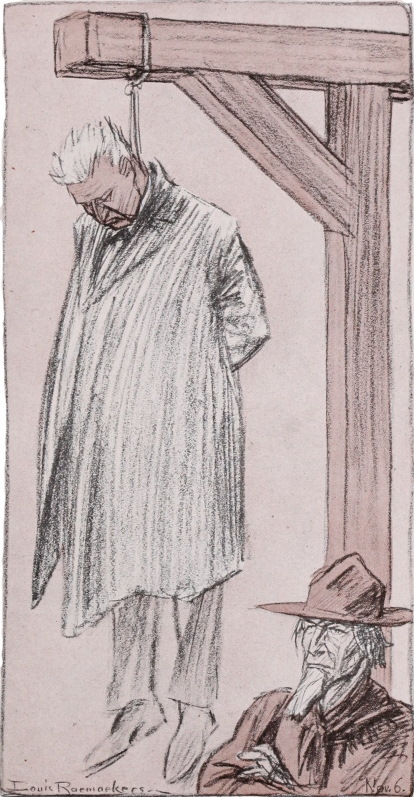
[Pg 64]
“GERMANY has once more said that force, and force alone, shall decide whether justice and peace shall reign in the affairs of men, whether right as America conceives it or dominion as she conceives it shall determine the destinies of mankind. There is, therefore, but one response possible for us: Force, force to the utmost, force without stint or limit, the righteous and triumphant force which shall make right the law of the world and cast every selfish dominion down in the dust.”
—From President Wilson’s Message on the First Anniversary
of the Declaration of War, April 6, 1918.
[Pg 65]
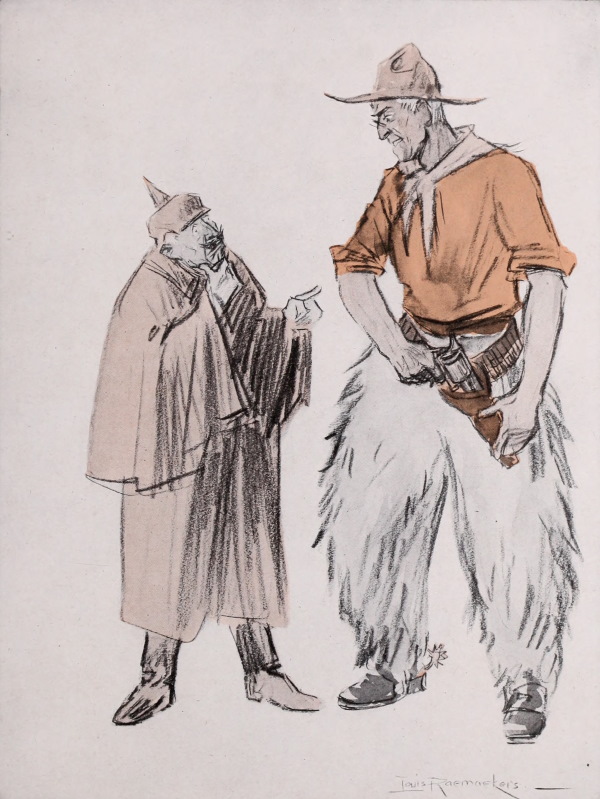
[Pg 66]
THE woman figure called Justice in Raemaekers’ cartoon has a Greek name. She is Themis, consort of Zeus, Themis, who sits by his side on the judgment seat. The scales are the scales of Ægina, in her day a great money centre, whose talent was the standard of value then, as the American dollar is to-day. Ægina was the mother of Æacus, one of the three great judges of the lower world, and be it remembered, it was Æacus that administered justice. Ægina is called by one of the greatest Greek poets the place where Themis is worshipped more than anywhere else on earth, and he tells us further that there was much weighing in Ægina, the Merchant State. Heavy weights there were in either scale. Much care was needful in the weighing, no little balancing doubtless. So there were many in our Ægina who felt the draw of kindred, of friendship, of fellowship. But this is the Day, the Day of Decision, the Day of Lord Æacus. After the knife edge of the balance comes the knife edge of the guillotine.
BASIL LANNEAU GILDERSLEEVE.
[Pg 67]
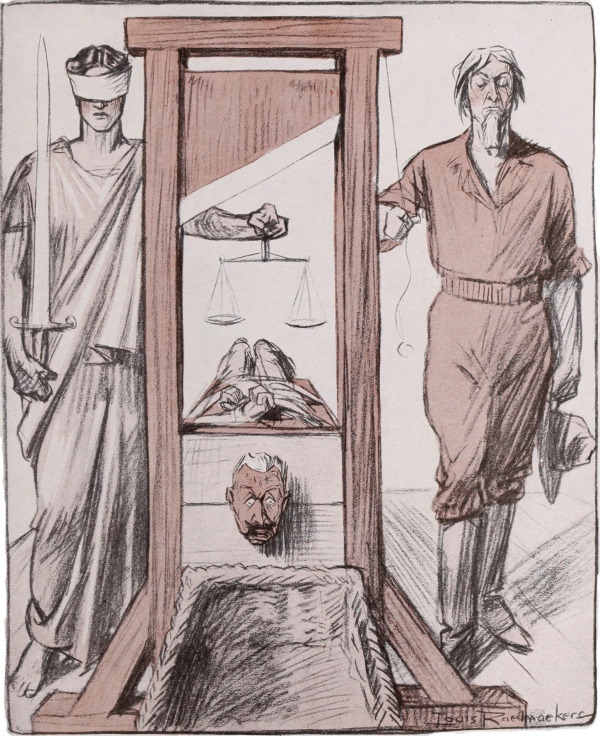
[Pg 68]
THE artist has depicted a spectacled Old Gentleman wearing a triple crown and a pontifical mantle, who is offering a proposal of peace to a heroic young woman, torn, bleeding, thorn-crowned, but dauntless, who spurns it with scorn. The spectacled Old Gentleman is the Pope; the heroic young woman is, I take it, outraged Justice.
Since Justice is our cause, we must try to be just. The Pope is not lying on a bed of roses. He is in a position of the utmost difficulty. He has faithful adherents on both sides, he dislikes war, and finds his perplexities, great enough in time of peace, now magnified an hundred-fold. He is not a hero; he is old, he is a lover of ease, and would dearly like to wear a King’s crown and hear multitudes in St. Peter’s cry out “Papa-Rè, Papa-Rè.” Let us be just. The first Pope (according to Roman Catholic reckoning), received the grace of a great opportunity to be true to his Master, but he denied Him thrice. Why should we be surprised to find Benedict XV denying his Master? Fate has held out her hand to him, as she held it out to St. Peter, and offered him his opportunity to be greatly true. In the old happy days when all the world cried “hosanna” to Justice, the Pope also had professed himself a disciple of Justice. But now Justice has been taken by bloody-minded men to be crucified, and the Pope has stayed afar off. Many witnesses have remarked, “This man also was a professed disciple of Justice.” And now the Pope denies it vehemently. He has put forward a series of humiliating proposals that Justice—heroic, bleeding Justice—should hold out her hand to the murderers of Belgium and confer, as if there had been equal error on both sides, upon the crafty schemes of peace by which Germany hopes to dominate the world.
Poor Old Gentleman! Timidity, love of ease, fear of Austria, and fantastic ambition, have induced him to deny his Master. The cock will crow, and he will weep bitterly. Poor, pitiable Old Gentleman.
HENRY DWIGHT SEDGWICK.
[Pg 69]
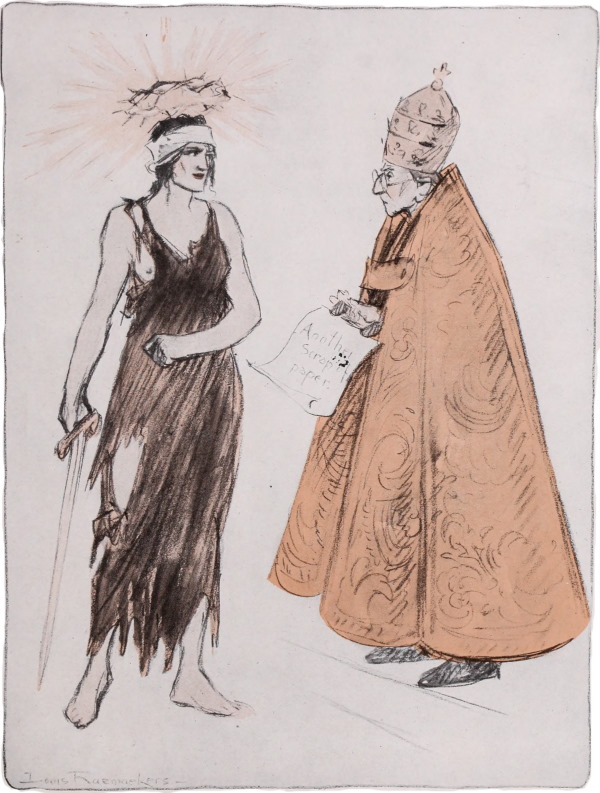
[Pg 70]
G. E. WOODBERRY.
[Pg 71]
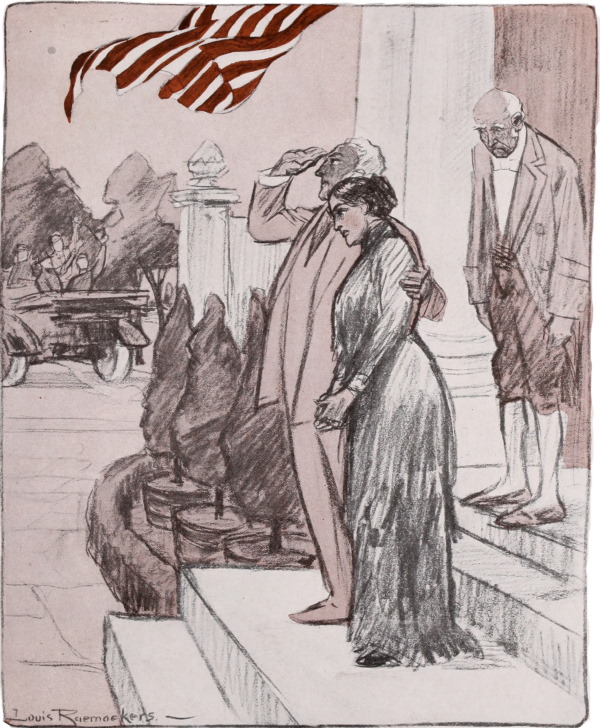
[Pg 72]
ALIENS in this country must assist in maintaining the liberty they enjoy, or we shall know the reason why.
“Ninety-five per cent. of the people of the United States would die as willingly for their beliefs as the men of 1776. It is for the other 5 per cent. to show not the slightest manifestation of disloyalty.
“Our message to them will be delivered through the criminal courts all over the land. And may God have mercy on them, for they need expect none from an outraged people and an avenging government.”
—Speech of Attorney-General Gregory in New York,
November,
1917.
[Pg 73]
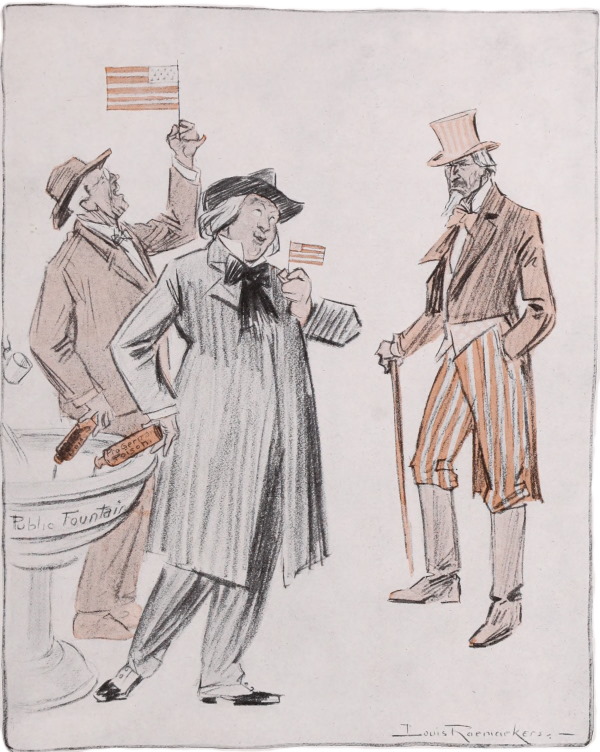
[Pg 74]
NOT even the prodigious Cruelty of the Germans in this Atrocious War has shocked the moral sense of mankind as much as has their Deceit. We are horror-stricken by the reports of their premeditated cruelties which link the Germans with the beasts—the wolf, and tiger, and boa constrictor, and vulture. The beast does these things because he has never risen to a higher plane than that of the beast. But Deceit is the attribute of Man; of one who dwells above the standards of the brute creation, who has had the moral sense developed in him, who has known the compulsions of conscience, who has acknowledged the obligations of duty, and has recognized himself as being a striver after the Ultimate Good. Through some flaw in the German’s nature all these qualities in him changed, turned bad, and he hailed Evil as his guide and inspiration. Whatever of good there was in him he uses to promote his wicked designs. Had he not been human he could never have understood how to make his perverted nature work successfully to deceive his fellow-men. The snake and panther do not deceive us, we know their ways and guard against them. But the moral pervert can deceive, because he hides his purpose and his method behind the mask of a counterfeited virtue.
Lying is the commonest form of Deceit. The German Emperor practised it for twenty-five years, when he proclaimed to the world his ardent desire for peace; and it was natural for him to lie when, on making war, he declared that the sword was forced into his hands. Then the German nation, fed so long on falsehood, accepted this. Another common form of German Deceit has been to accuse their enemies of the very enormities which they themselves invented and carried out. Diplomatic chicane is a commonplace tool which the Germans employed, only clumsily. But we cannot measure the full extent of German Deceit unless we follow it in its varied propaganda among foreign peoples, in its spies, its instigators to violence, its corrupters of the press. It poisons food and wells; it sets fires to burn crops or forests; it hires ruffians to burn factories or blow them up, to hide bombs in ships; it incites sabotage and strikes.
So universally do Germans take to Deceit, that it has evidently become their national trait. The soul of Germany is a lost soul, which worships Satan as its master and welcomes Evil as its Good.
WILLIAM ROSCOE THAYER.
[Pg 75]
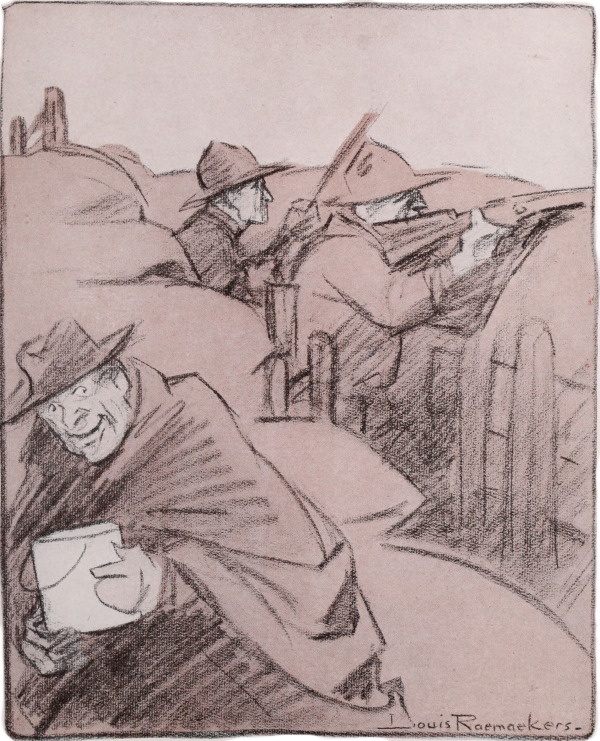
[Pg 76]
BEHOLD this group of sinister and menacing forms surrounding the nation as typified in the person of its President. For four years past they have been coming, one by one, out of the darkness. We can now only too well recognize them and the dangers with which they threaten us. In front, there is arrogant, boastful, jealous and unscrupulous Hate, with its policy of “might before right,” and its doctrine of “frightfulness,” conscienceless and cruel, in its murder of the innocent, its arson, its robbery, its slavery of the weak, and its outrages of womanhood. Crouching, while it tramples on our flag, is Treachery, ready to use pistol and dagger, to burn bridges, to place bombs, to blow up ships, to hide and sneak and cringe, if only it can deliver its blow more surely and safely. And back of both, is hypocritical and lying Diplomacy, with its protestations of innocence and friendliness,—studiedly polite in manner, but really black at heart.
Behind, all engaged in tying the nation’s hands, lest it might strike promptly and forcefully, is Pacifism, cowardly and self-seeking, more anxious to avoid temporary suffering than to preserve the honor and safety of the nation; and Divided Allegiance, traitorous to both causes which it vainly endeavors to harmonize; and Intrigue, working in secrecy to part friends, and stir up strife between those whose interests are common, or even identical.
But out of the darkness comes also the call to the nation: “America! awake. Open your blinded eyes. Banish partisanship. Abjure political jealousies. Leave it to the men who know. Make your hearts stout. Grasp the sword firmly. Listen to no compromises, until the nation is proved worthy of its birthright, civilization is rescued, and the world made safe for Democracy.”
GEORGE TRUMBULL LADD.
[Pg 77]
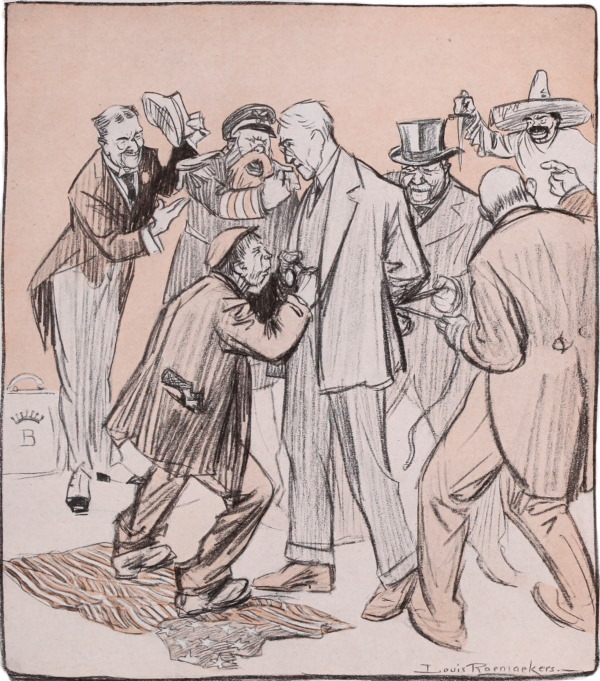
[Pg 78]
“Dieu le Veult!”
THE Prussian outdoes the world in his single-minded devotion to physical things. He believes and frankly declares that mercy and honor weaken human power, that if you consider them you must eventually fall before the strong who disregard them. Germany’s attempt to prove the soundness of the Prussian thesis has gradually loosened the moral consciousness of the world. It has gathered to defend the things of the spirit in what is as truly a crusade as that which Peter the Hermit led, a crusade to preserve the sanctity of contract, the few laws between nations that men have worked out, the right of the weak to their chance. Germany, disbelieving in the strength that love of mercy and of honor give men, cannot counter-attack in kind. Every day develops more clearly that the weak place in the Prussian armor is its indifference to moral considerations.
IDA M. TARBELL.
[Pg 79]
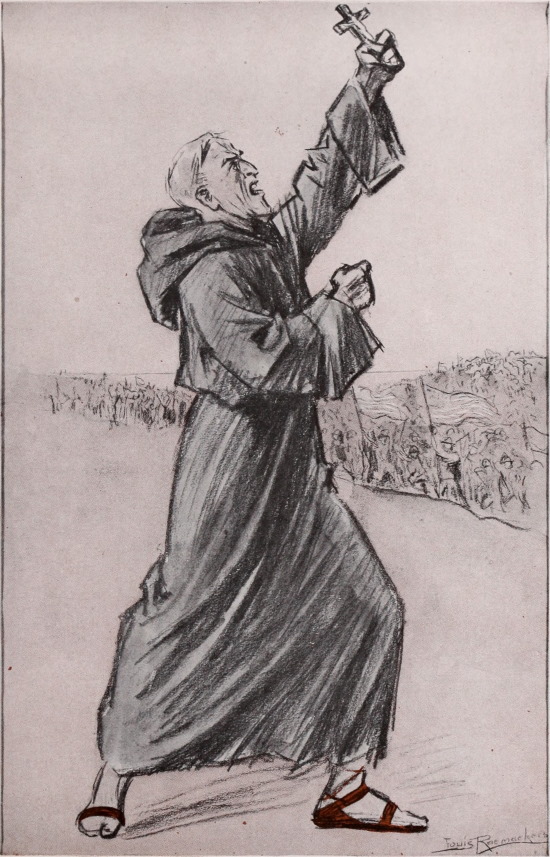
[Pg 80]
THE stout gentleman on the opposite page wears a pleased look, as if he were enjoying his occupation. That is natural, for he is a scientist engaged in a very pretty process—the propagation of lockjaw, typhus and other malignant germ cultures with which he expects to speed up the annihilation of his enemies. How does he propose to accomplish this? I will tell you: he is going to introduce those young and vigorous colonies of germs into those little packages marked with a cross which you see lying on the table before him. Those are Red Cross bandages, and they will presently be binding the wounds of our soldiers, and the lockjaw and typhus hordes in them will awake, and rally in a silent loathsome attack that will lay torture and death upon thousands which the noisy, mis-aimed guns have failed to destroy. The germ-man is assured that his atomic missiles will not be mis-aimed. His government has efficiently arranged for those packages to go to the hospitals of Roumania and Belgium and France. That is why he smiles—that is why he has that roguish look.
In the germ-man’s smile is incarnated “Deutschland über Alles” and its correlative, “The end justifies the means.” We in America have produced exponents—criminal exponents—of a similar psychology, and we have generally (when we could catch them) hung or electrocuted or imprisoned for life these moral perverts, in order to make the world a safer and cleaner place to live in. Only a little while ago the State of New York electrocuted a man who, having set up his individual “Ueber Alles and General Justification” court, had proceeded cheerfully to introduce malignant germs and other deadly things into the foods and medicines of his wife’s parents, who stood between himself and fortune. Here we have an exact parallel. Those defenceless old people were doing him no wrong. They in fact admired and trusted him, just as Rumania and Belgium and America only a little while ago admired and trusted Germany. They stood in his way, however, and from the “Ueber Alles” standpoint any means for their removal was warranted.
Secret assassination is an ancient art. It has been practised in every age and in every nation and its votaries have been hunted down and exterminated by decent people. To-day, for the first time in the history of the world, we have the spectacle of stealthy death for the defenceless adopted as a government policy. For the decency and safety of mankind the allied nations have highly resolved that the government which promotes such a policy must “perish from the earth.”
ALBERT BIGELOW PAINE.
[Pg 81]
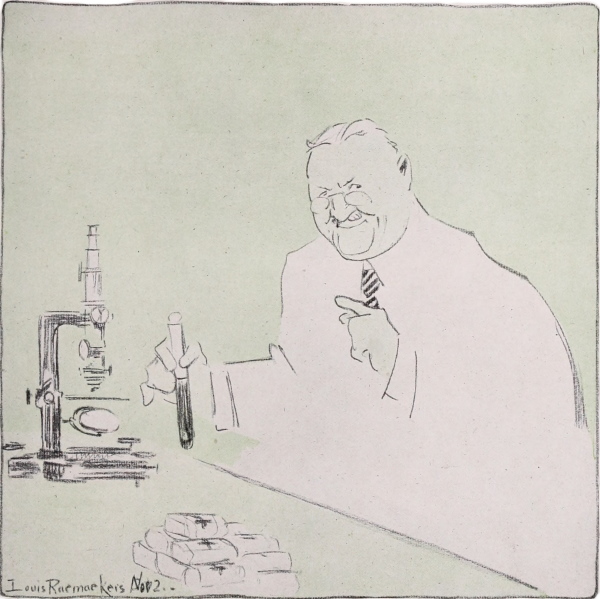
[Pg 82]
THE nearness to America of the European theatre of war so greatly fills our minds with the contest there raging that we give but little thought to the progress of events in the far countries tributary to the Tigris River. For a time, the heroic resistance of General Townsend to the Turkish forces which surrounded him aided by the natural obstacles of river and climate, claimed a share of our interest, and later, the splendid and successful work achieved by the new British army under General Maude, awakened renewed interest in a campaign designed to split Islam into two parts: one, acknowledging the domination of the Turk and his German masters; the other, a new Caliphat of Bagdad, Arabian, rather than Turkish, looking to the ideals of justice and freedom, rather than to the rule of the sword; finding its inspiration in the tradition of the enlightened and humane Haroun-al-Raschid, rather than the warring, bloody conquerors and Muhammed and Sulìman. Still later, the northward progress of British arms extended over the greater part of Palestine, and the capture of Jerusalem brought the sacred places of Israel and of Christianity within the control of Christendom after five centuries of Turkish occupation.
These campaigns are only second in importance to the progress of the German invasion of France; for if the British successes in Arabia and Palestine shall be maintained, and the Islamites of Egypt, Arabia and Mesopotamia shall look in the future to the Caliph of Bagdad, not to the Sultan of Turkey, as their spiritual head, the great German scheme of aggression in the Near East will have been defeated.
The subtle Teuton suggestion to the Turk of a Pan-Turanian league, was but a scheme for the promotion of a closer Turkish organization under German control, as Raemaekers’ cartoon, “A Tid-Bit for the Sick Man,” so cleverly intimates. The Turks should have said to themselves, “Beware of the Greeks—the Prussians—and the gifts they bring.” A German gift is like the shirt of Nessus,—it will consume utterly those who accept it.
Not alone on the shores of the Mediterranean, but on the Persian Gulf, on the Baltic, on the English Channel, in the Caribbean, on the Pacific,—there is no limit to the schemes of expansion of German control to which that nation in its mad lust of power has given itself. Never since the dawn of recorded history has an issue been made so plain. Aut Cæsar aut nullus. The world must choose between Germany, the highly developed, hyperorganized, scientific state, proceeding on the openly avowed theory that might alone makes right, and that no principle of ethics, morality or religion must be allowed to affect or deter a course which scientific militarism determines to be best calculated to attain a pre-determined end, and the other nations, who believe in God and in His justice, who conceive that it doth not profit a nation to gain the whole world at the cost of its soul.
Once this issue is manifest to the world, the result cannot be in doubt.
GEORGE W. WICKERSHAM.
[Pg 83]
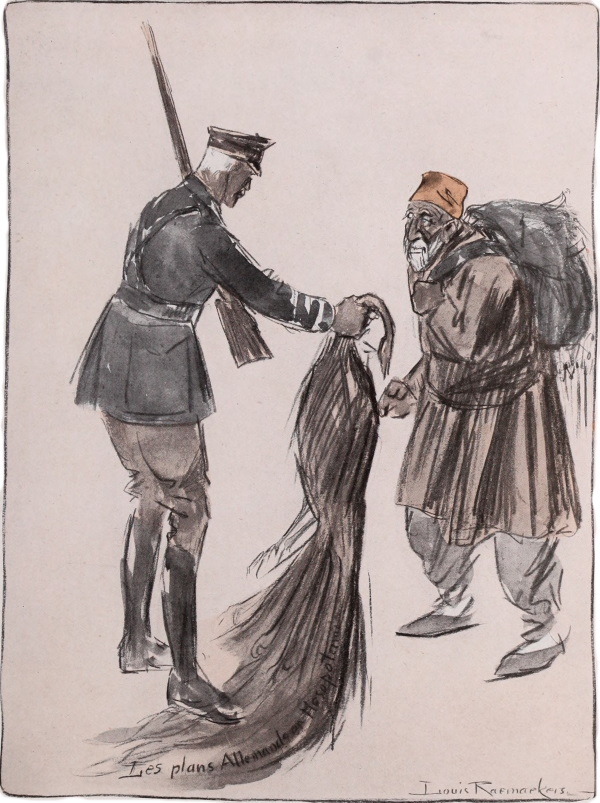
[Pg 84]
The Mexican-Japanese Plot
[Pg 85]
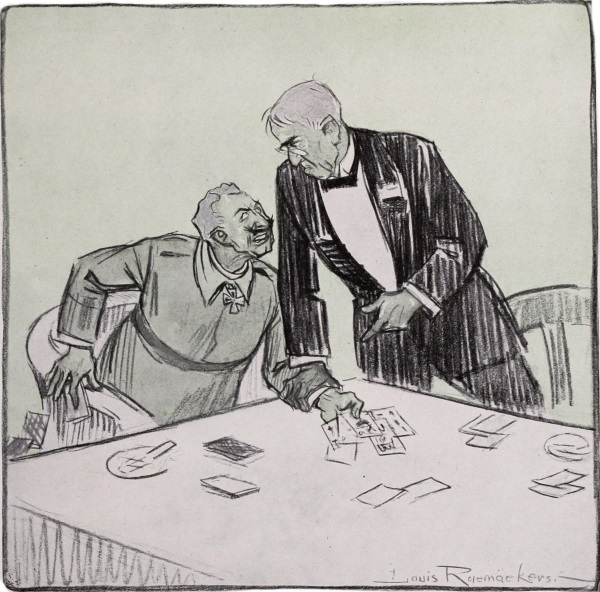
[Pg 86]
“WE regret being unable on this occasion to follow the counsels of our masters, the French, but the American flag has been forced to retire. This is unendurable, and none of our soldiers would understand their not being asked to do whatever is necessary to reëstablish a situation which is humiliating to us and unacceptable to our country’s honor. We are going to counter-attack.”
This was a message sent by an American general in command of American forces south of the Marne on Monday afternoon after the Germans had succeeded in forcing the Americans back towards Conde-en-Brie.
The French commander had informed the American general that the early German success could not have any great effect on the fate of the battle; that it was understood perfectly that after hard fighting the Americans had slowly retired, and that it was not expected that they immediately launch a counter-attack. He added that a counter-attack could be postponed without risk, and it might be better to give the American troops an hour’s rest.
Immediately after the American general sent the above message, which is quoted by the correspondent of the “Matin,” the Americans launched their counter-attack and the lost ground was soon recovered, with an additional half mile taken from the Germans for good measure.
The New York Times, July 18, 1918.
[Pg 87]
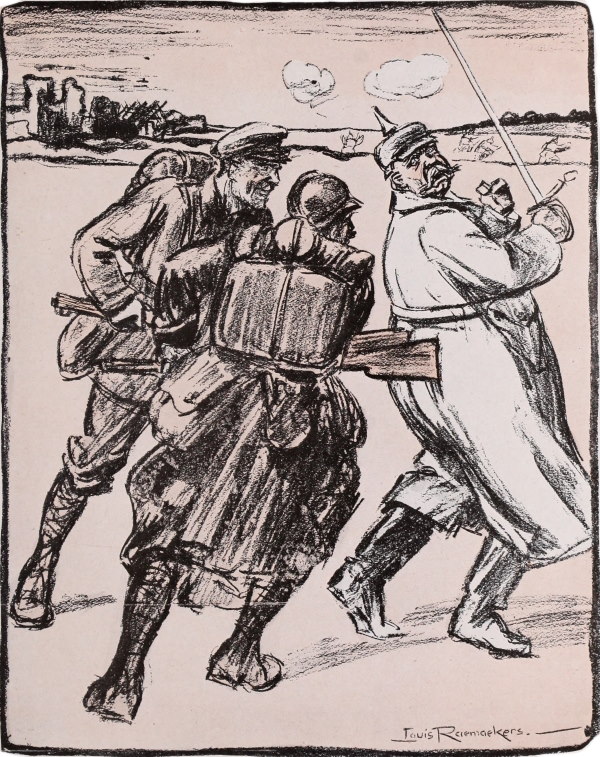
[Pg 88]
The All-Highest: “Only a sham war with Uncle
Sam? Oh, Hollweg, you are a bad prophet!”
ONE of the delusions the German Government and its General Staff have been laboring under for many years is that the United States could not create an army that was worth consideration as a foe. That Government and its General Staff are tasting the quality of our troops in the field, and the flavor is bitter on their tongues. One hundred and twenty-six years ago there was fought a battle in France (at Valmy, within the zone of war today) on the date that France first called herself a republic. Kellermann won that battle against the Prussians and Austrians with levies of new troops from the lower and middle classes of France, who “found that they could face cannon balls, pull triggers, and cross bayonets without having been drilled into military machines, and without being officered by scions of noble houses.” They had, it seems, the same spirit we like to think animates our army, which the Germans abroad and some critics at home denied our men: “they awoke to the consciousness of instinctive soldiership.”
The Army and Navy Journal.
[Pg 89]
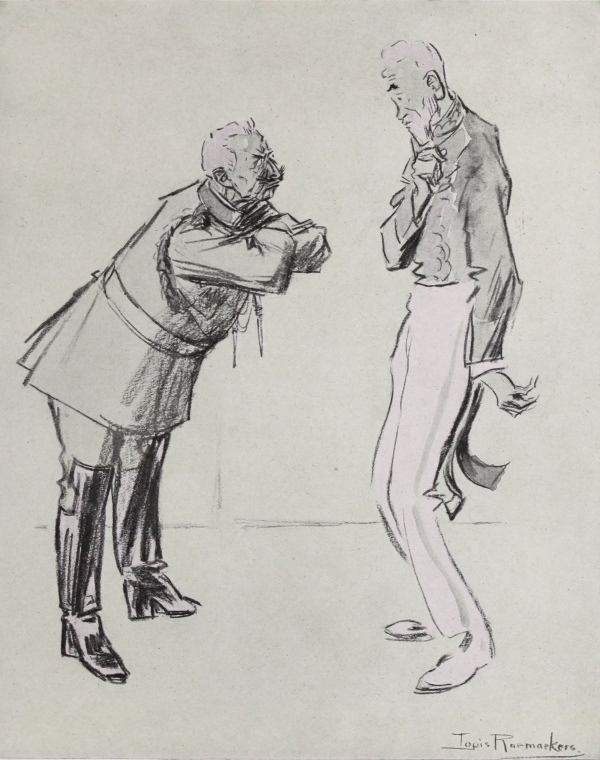
[Pg 90]
WHETHER the war be
long or short, the
quickest road to peace
is the road straight ahead of us,
with no division among the American
people.
WILLIAM JENNINGS BRYAN.
[Pg 91]
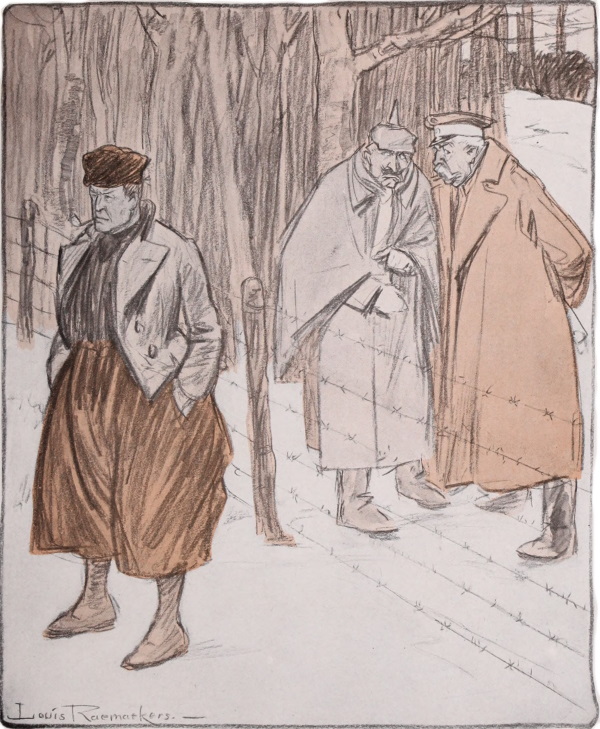
[Pg 92]
“When I say, Down with Wilson! you all cheer!”
[Pg 93]
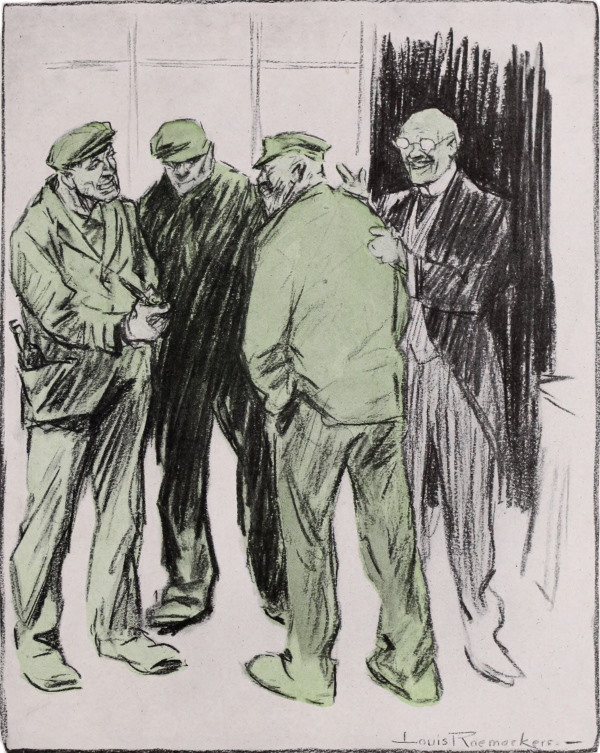
[Pg 94]
EDWIN MARKHAM.
[Pg 95]
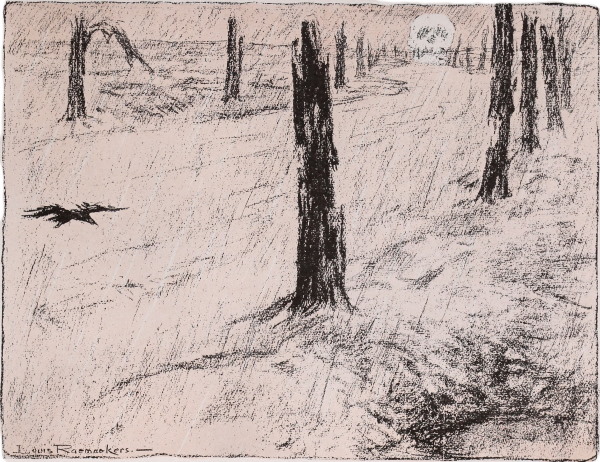
[Pg 96]
France crowns with laurel the dead American
aviator.
THO’ the American mother mourns across the seas for her hero son, who has touched the skies in France, the foster mother lays her laurel of glory on the bier of Youth, whose brave spirit in passing welds an eternal bond of sympathy and union to the end.
GERALDINE FARRAR.
June 23, 1918.
[Pg 97]
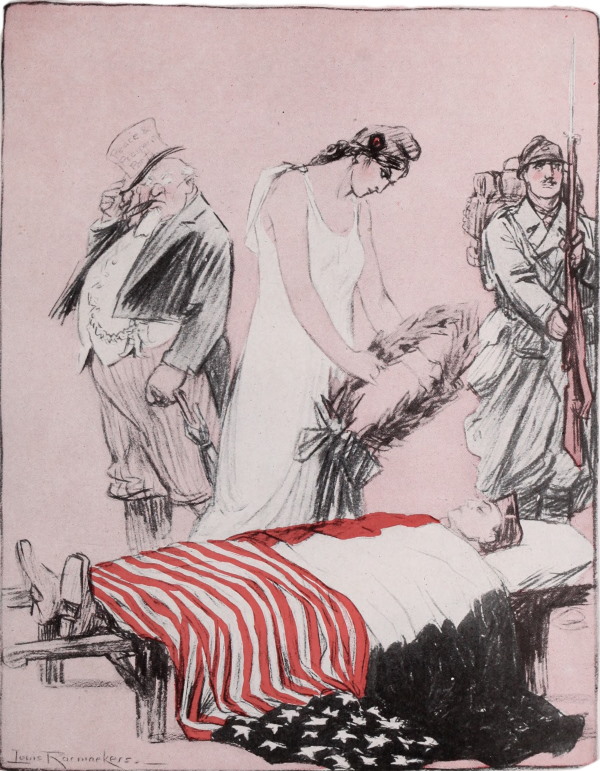
[Pg 98]
THE great poet of Victoria’s reign, in his wondrous vision of the future,
Dealing not with the shadowy future but with the actual present the great Artist of the Great War sees aerial navigation, not in terms of commerce nor of battle engines, but as the “Eyes of the Army”; the sense without which the terrestrial movements of war, both by land and sea, tend to become mere blind and purposeless blundering. With one graceful figure in a finely balanced design the artist tells the story.
Future generations will be grateful to the Prussians for one thing—and one thing only. From war—that “noble art of murdering,” as Thackeray called it, they have stripped the last vestiges of romantic glamor. They have not hesitated to press the premises of militarism to their logical conclusion,—with results that have staggered humanity.
In one field only has it been possible for something of the old knightly chivalry to linger. Romance, driven from earth, has taken wings; and the world, sated with horrors of trench and shambles, thrills with eager wonder at the new science of the sky; at the individual skill and daring of its pilots and their wonderful service to their fighting brethren on earth.
But even as we read of these things come tales of Zeppelin raids over defenseless cities and the deliberate dropping of bombs upon hospitals.
Civilized warfare! it is a contradiction in terms. It may be necessary,—it has proved to be necessary, for civilized men to fight the barbarians in order to uphold and preserve the great principle of individual liberty; but war must come to an end among civilized peoples; and to that end there must be a closer and closer union of such as care for law and order, believe that the weak have rights which must be protected, and are willing to base their governments on the firm and enduring foundations of Liberty, Equality and Fraternity.
THOMAS MOTT OSBORNE.
July 19, 1918.
[Pg 99]
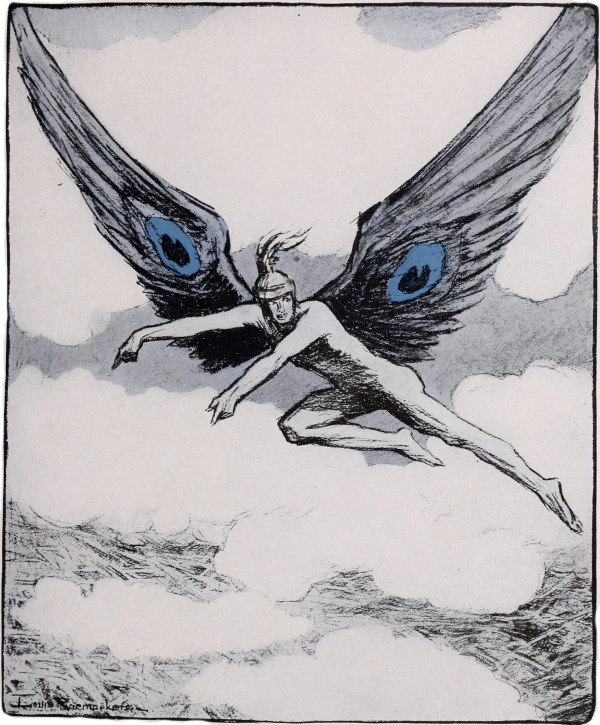
[Pg 100]
ALL we need to remember hour by hour is that we are living through the greatest crisis in the history of the world; that the greatest number of people are concerned in it ever concerned in one thing before; and that the most important epoch concerning humanity since the birth of Christ is now at hand; that humanity is about to fall to a lower plane of living or rise to a higher one than it has ever reached; that we can only do our little share toward that rising by stiffening ourselves to a long endurance. We have proven our mere ability to give valuable service. What we must prove now is our patience and steadfastness, without which brilliancy is worthless. We must strike a pace which we can hold, both mentally and physically and plod on together. We must and we will be ready, for our own sake, for our country’s sake and for the sake of what the world was created for.
RACHEL CROTHERS.
[Pg 101]
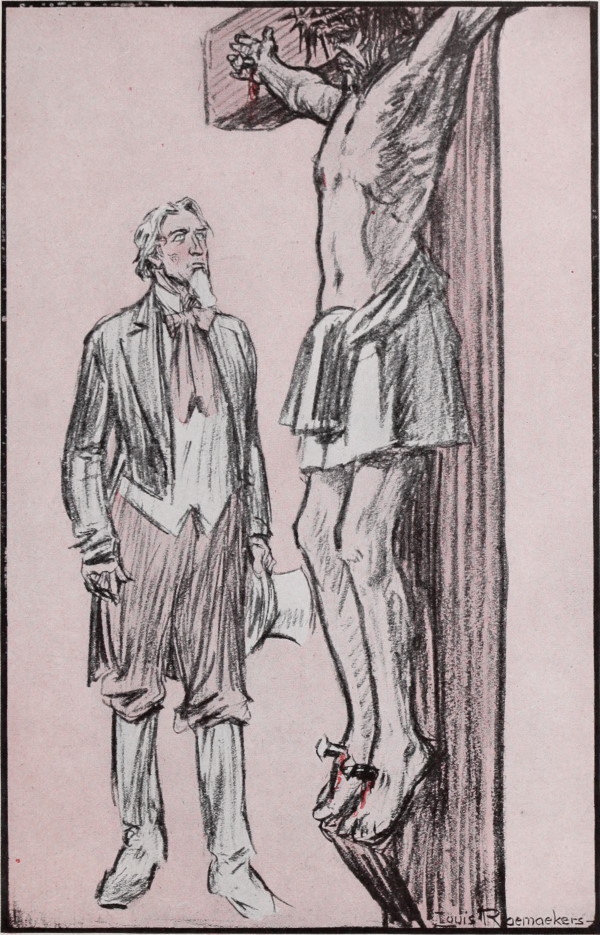
[Pg 102]
AS the rainbow is heaven’s token of faith, so have we faith in these modern knights journeying to beloved France to give battle to invading barbarians.
Ponder a moment over these men of the Rainbow Division, lads with minds clean as their hearts are true, and compare them with the blood-craving hordes reared in a school having no other aim than to kill their fellow beings. One is Man in the superlative, and for the other there is no name sufficiently abhorrent.
When an American soldier enters Hun territory we know how scrupulously the laws of humanity will be respected: he will at least be knightly and merciful.
And the four years’ record of German savagery is so well known that it must forever befoul the pages of history.
Lack of opportunity in the library has prevented a thorough exploration of the unspeakable atrocities of the early Huns who under Attila ravaged a great part of Europe. But sufficiently have I read to be convinced that the Huns and Vandals and Goths of early history, compared with the Hohenzollern-inspired fiends, were scarcely more than bungling altruists. We know it to be fact that German soldiers murdered priests and raped nuns in Belgium, violated practically every young woman in the Aisne and Champagne, razed defenseless towns and hamlets in these French Departments, murdered old people and children and mutilated youths everywhere, delighted in destroying hospital ships and treated Red Cross signs as targets for their guns, inoculated French prisoners as a means of furthering the Berlin plan to diminish the French race, and in cold blood murdered scores of women and children on the Lusitania.
These are awful indictments, with not one excusable on the ground of military need or expediency. Given trial at the bar of civilization their perpetrators must forever be judged as outside the pale of humanity and hereafter can have no standing in lands where the principles of Christianity and humanity have a meaning. With my own eyes I have seen scores of proofs of German “frightfulness”; with me it is not hearsay. And remember that it was none other than Goethe who wrote that “the Prussian was born a brute, and civilization will make him ferocious.”
Positive is it that the United States and her Allies will crush the conscienceless militarism of Germany, and ever of good omen is the Rainbow, telling of improving skies and perfect conditions for the morrow.
FREDERIC COURTLAND PENFIELD, American Ambassador
to Austria-Hungary, 1913-1917.
[Pg 103]
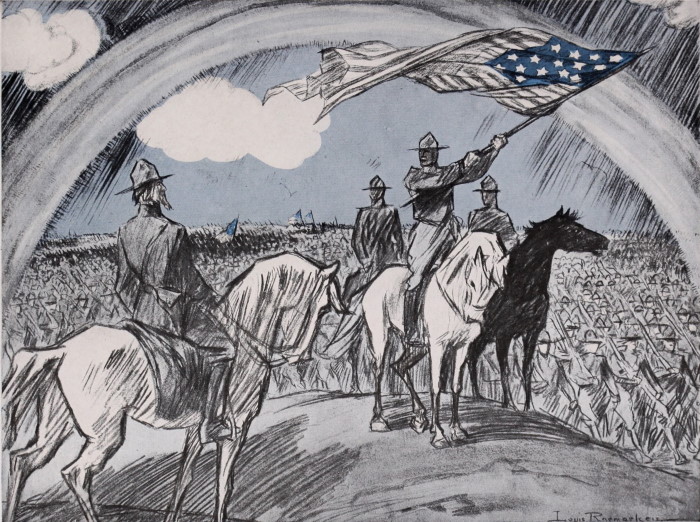
[Pg 104]
IN a hundred years no people has been so tortured and abused by rulers of its own blood and faith as the Russians. The free peoples have nothing in their experience by which they can imagine the greed and cruelty of which the subjects of the Romanoffs have been the victims. No adequate picture of the diabolical old régime can be painted till scholars have had time to explore its archives and expose the dark forces that operated it.
Let no one look for Freed Russia to be shining and beautiful. From the gloomy caverns in which they have mouldered the Russian people stagger out upon the sunlit heights of freedom weak, bent, half blind. Few of the older will ever conquer the dense ignorance in which they were kept by autocracy. Few of the characters twisted and deformed by oppression will ever become quite straight. In the behavior of this people there will be exhibited folly, fanaticism and brutality that will make the peoples born free uneasy as to the new sister.
Whatever happens, doubt not that the Russians are gifted and great-hearted. Their excesses have proclaimed how much they were held back and brutalized by the Tsars. It will take long for them to rid themselves of the traces of their servitude and misery. Even the children born in the new era will catch from their parents some of the evil heritage. Only the grandchildren of the common people of today will come into the full birthright of the free and prove the worth that is in the Russian race.
EDWARD ALSWORTH ROSS.
[Pg 105]
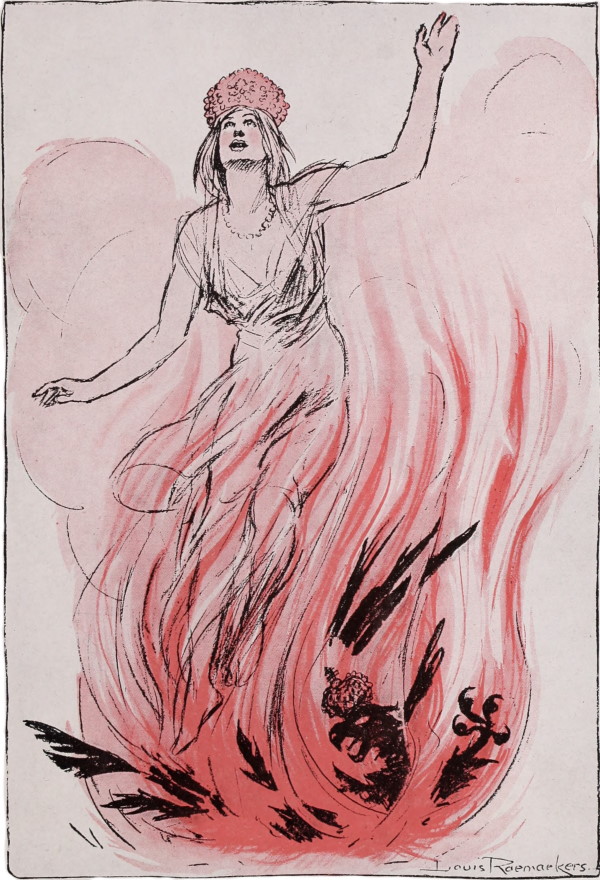
[Pg 106]
OTHER wars end with those who made them. It is the will of the German Emperor that his war should pass on like a blight from generation to generation upon those whose fathers dared to stand against the ravager. To this end he has not only slaughtered and enslaved the defenders; he has sought to destroy the very fruitfulness of the land whereby their descendants must live.
To me the deliberate, coldly reckoned murder of the invaded countries’ trees and vines so that the children of the slain and enslaved and their children’s children may draw no sustenance from the kindly earth—that seems the most perverse, the most detestable, the most typical of all the crimes of Kaiserism.
The sterilization of Mother Earth! It took the mind of a Wilhelm to conceive it. And for that offence against generations unborn he shall hang, higher than was ever ruler before him, gibbeted in the righteous hatred of an outraged posterity.
SAMUEL HOPKINS ADAMS.
[Pg 107]
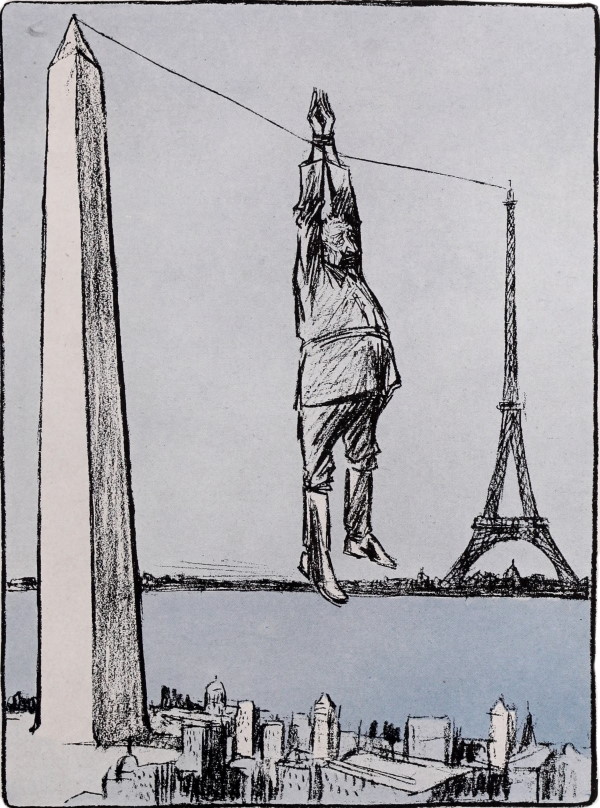
[Pg 108]
“PEACE must be framed on so equitable a basis that the nations would not wish to disturb it. It must be guaranteed by destruction of Prussian military power, so that the confidence of the German people shall be put in the equity of their cause and not in the might of their armies.... Europe is again drenched with the blood of its bravest and its best, but do not forget the great succession of hallowed causes. They are the stations of the cross on the road to the emancipation of mankind. I again appeal to the people of this country and beyond that they should continue to fight for the great goal of international rights and international justice, so that never again shall brute force sit on the throne of justice nor barbaric strength wield the sceptre over liberty.”
From the Rt. Hon. David Lloyd-George’s Glasgow speech
on war aims, June 29, 1917.
[Pg 109]
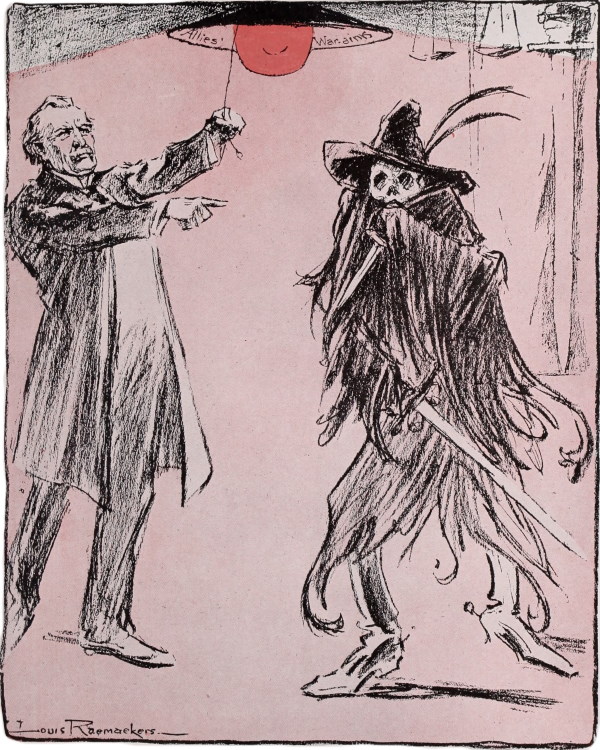
[Pg 110]
ON the day of the Nativity, the Infant Brother of Humanity was born and was laid in a manger, there being no room for his human mother at the inn. But wherever he lay—there, through the mystery of his kinship, was the shining Gateway of Heaven. That translucent Light, from the moment of its appearance, intensified, as by opposite polarity, the baleful lights from all unholy fires in human breasts. Herod was first aroused to the Slaughter of the Innocents, and he has had his successors in every age during the growth of Christendom.
As the Light of the World has expanded these nineteen centuries, shining in the hearts of men, ever awakening new ideas of Truth, Justice, and Mercy, against every fresh gleam, promising wider horizons of human Love and Sympathy, have been arrayed the brutish hosts, with Hatred and Murder in their hardened hearts. For the present generation has been reserved the vision of the very Armageddon of this Conflict, in which the world is divided against itself. The Powers precipitating it inaugurated it and have in its whole course attended it with every conceivable form of atrocity and outrage against noncombatants—innocent men, women, and children. But that Heavenly Light which shone in the stable at Bethlehem can never be put out!
HENRY MILLS ALDEN.
[Pg 111]
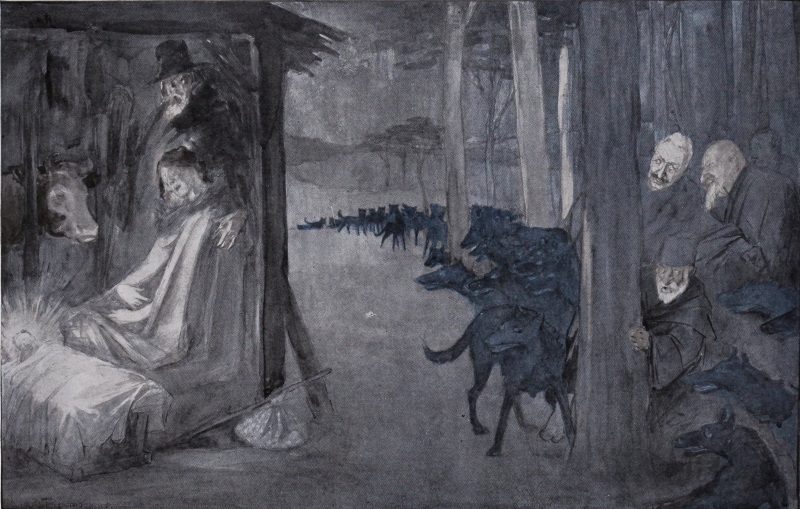
[Pg 112]
“THE military masters of Germany denied us the right to be neutral. They filled our unsuspecting communities with vicious spies and conspirators and sought to corrupt the opinion of our people in their own behalf. When they found that they could not do that, then agents diligently spread sedition among us and sought to draw our own citizens from their allegiance....
“They have learned discretion. They keep within the law. It is opinion they utter now, not sedition. They proclaim the liberal purposes of their masters; declare this a foreign war which can touch America with no danger to either her lands or her institutions ... and seek to undermine the Government with false professions of loyalty to its principles.
“But they will make no headway. The false betray themselves always in every accent.... The facts are patent to all the world, and nowhere are they more plainly seen than in the United States, where we are accustomed to deal with facts and not with sophistries; and the great fact that stands out above all the rest is that this is a people’s war, a war for freedom and justice and self-government among all the nations of the world.”
From President Wilson’s Flag Day Address, June 14, 1917.
[Pg 113]
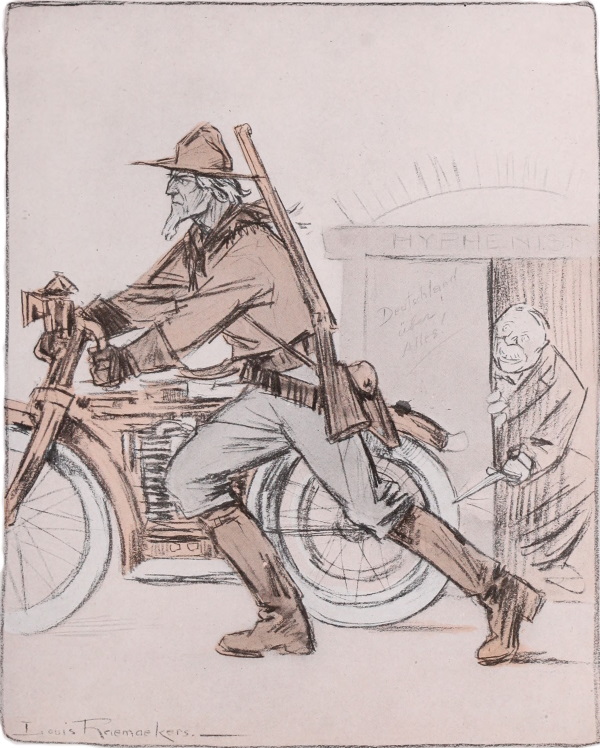
[Pg 114]
“WITHOUT doubt, the majority of the German nation is still monarchist. The different peoples of Germany still hold to their princes, more or less, according to the individual character of the sovereigns. But that confidence in the supreme chief of the Empire is still entirely intact is an affirmation which, after three years of war, cannot be maintained.... Confidence in the direction of the Empire has begun to disappear among the German people.... They begin to ask themselves how it happens that nearly all the world is in arms against us, and who is responsible for it.”
Reply of Prince von Hohenlohe to the clerical deputy, Spahn,
in the Reichstag.
[Pg 115]
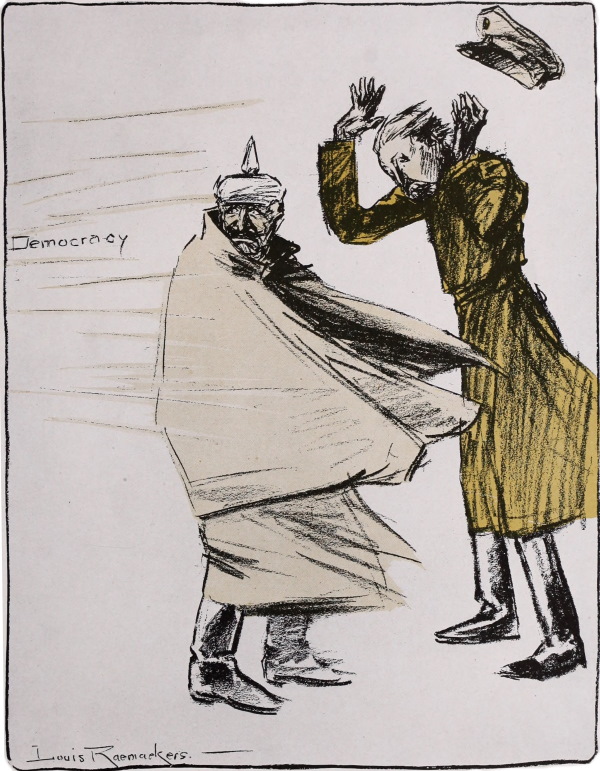
[Pg 116]
GERMANY, in her war against Civilization, has disregarded not only International Law and the ordinary laws of humanity, but has ruthlessly set aside the four great laws of the social order which all civilized nations recognize as having a divine sanction. “Thou shalt not bear false witness.” She has broken her treaties and lied openly, frequently, brazenly. “Thou shalt not commit adultery.” She has permitted, if she has not given official sanction to rape committed upon a scale never before known in the history of the civilized world. “Thou shalt not steal.” She robbed her neighbor’s hills of their coal and iron, her neighbor’s fields of their standing crops, her neighbor’s banks of their money, her neighbor’s houses of their pictures, statuary and books, and what she could not carry away she has in mere wantonness destroyed. “Thou shalt not kill.” She has murdered thousands of defenceless men, women, children, and little babes, and has done this not in a sudden and feverish rage, but as part of a deliberately conceived and carefully executed policy. One must multiply Raemaekers’ picture by the thousand in order to get its full significance.
LYMAN ABBOTT.
[Pg 117]
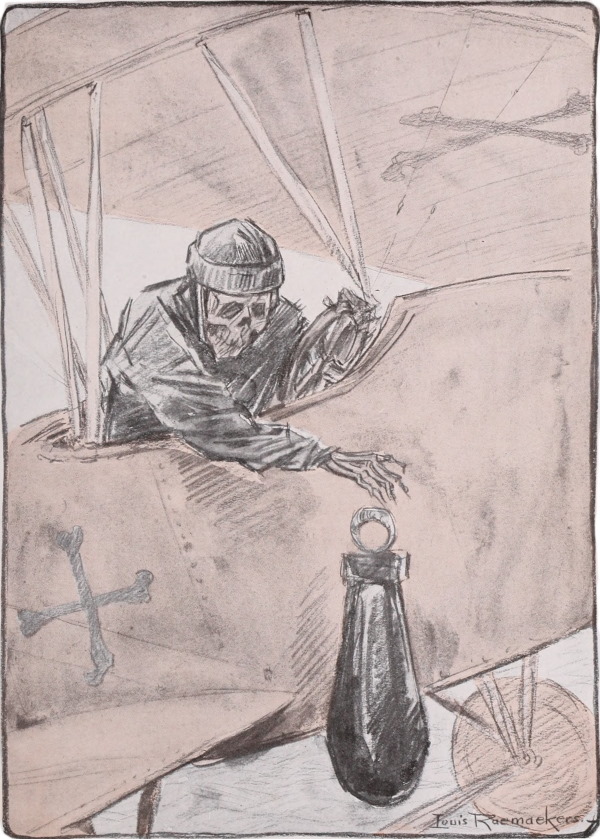
[Pg 118]
“INFINITELY interesting is our contact with the American troops. They have occupied the sector immediately beside ours. We have seen them at work, and could form an idea, and it should be told and retold that they are marvelous. The Americans are soldiers by nature, and their officers have the desire to learn with an enthusiasm and an idealistic ardor very remarkable. There is the same spirit among the privates. They ask questions with a touching good-will, setting aside all conceit or prejudice. Naturally they have the faults of all new troops. They show themselves too much and expose themselves imprudently, letting themselves be carried away by their ardor, not knowing when to spare themselves or to seek shelter or when to risk everything for an end. This experience will be quickly learned.
“As for bravery, activity, and discipline, they are marvelous. They absolutely astonished us on a morning of attack. The cannonading, suddenly becoming furious, had just thrown me out of my bunk. No doubt about it, it was a Verdun attack. Taking time to seize my revolver, put on my helmet, and gather up several documents, I descended to the streets. When I arrived there they were already filing by with rapid, easy, decided steps, marching in perfect order in silence with admirable resolution, and above all with striking discipline, to their fighting positions. It was fine. You can have no idea how cheering it was to my Poilus.”
—From a letter of a French officer published in the Paris
“Temps.”
[Pg 119]
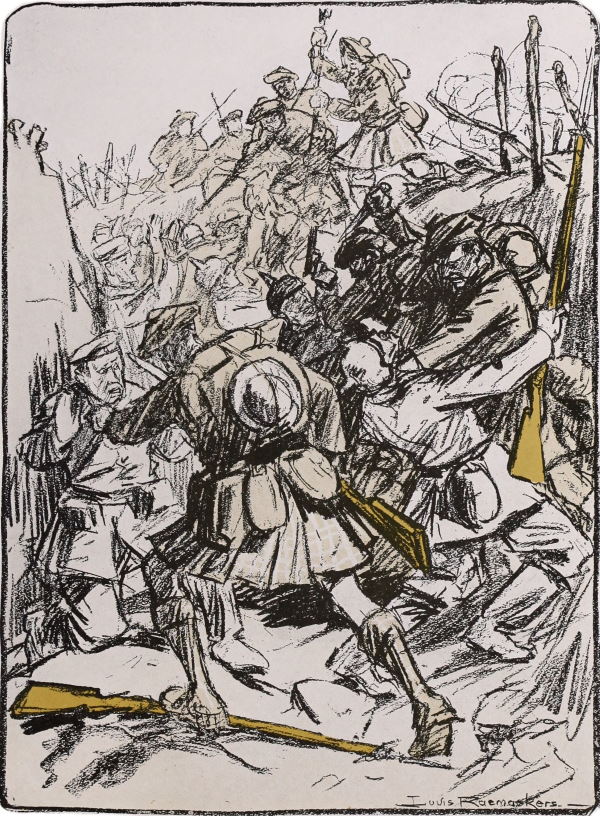
[Pg 120]
The Kaiser: “He has managed to fool the German
Socialists. Why should he not fool the Russian
Socialists?”
FEW things have been more disheartening in the course of the War than the way in which the Teutonic foes of liberty have used so many friends of liberty in Russia as unwitting instruments to undermine and destroy the resistance of the Russian people to the German armies.
Vast territories, amounting to nearly half a million square miles in area, have thus been abandoned to German domination, practically without a struggle; and over fifty million people in the abandoned regions have seen their prospects of freedom vanish.
The German armies thus released from the eastern front and poured into northern France, have enormously increased the difficulties of the Armies of Liberty, battling in France and Belgium to save the world for Democracy.
J. G. PHELPS STOKES.
[Pg 121]
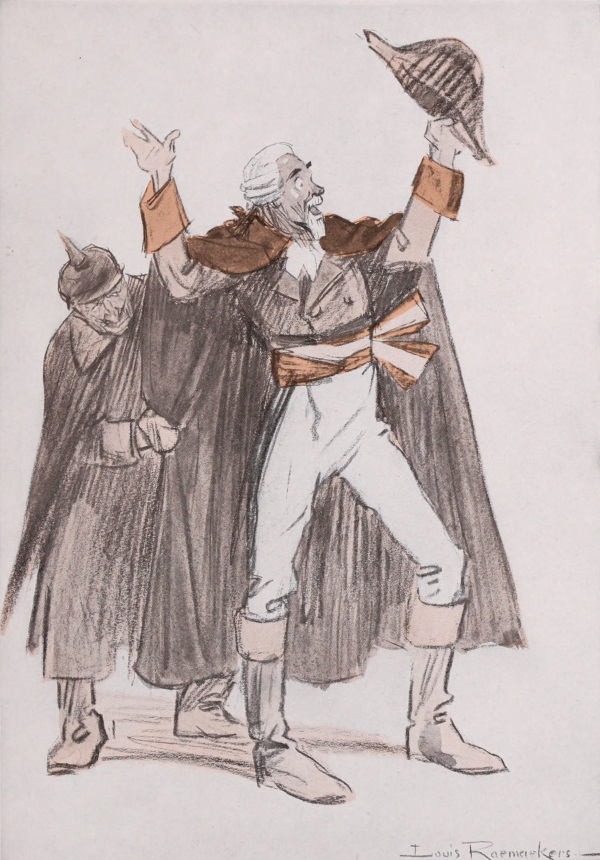
[Pg 122]
RAEMAEKERS is, here, having the President say:
“When Germany is defeated, and peace can be discussed, we shall pay the full price of peace,—namely, justice for all the nations.”
We know what justice will be for the nations spoiled. But what will be justice for the spoiler? We know what this latter would be to an individual; and a nation is only a greater individual, capable of greater mischief, subject to greater punishment.
An individual, who, with progressive malice, had broken all the laws of his country, society and God, from simple lying, through perjury, robbery, piracy, up to wholesale murder, would be destroyed—for the good of his fellowmen and as a warning to others. If he should escape the noose the quieter but no less inevitable force of public morality would destroy him. Neither man nor nation has ever long lived by force, flaunting his crimes in the face of the world, committing, threatening yet others. Nor will Germany. She is now, I believe, in the way of destruction, either by the public executioner, or, more likely, by the slower, but not less certain, process of isolation and decay.
She has unmasked herself and we now see the hideous, distorted face of her. How can so monstrous a Thing have friends after this? Who will trade with her? Who will ever again accept a promise of hers? Who but must be ashamed of her name and her language? Anathema she will be to all peoples—the outcast of nations—living for and upon herself, where her life-doctrine of force must inevitably turn to her own destruction. This has been the fate of every world-conqueror and his nation. And, surely, none of them all has so richly deserved it as this intolerable Germany. Ask History! And, yet, to the individual, there is always left repentance and restoration—even though he, himself, must be destroyed.
So, if this besotted Germany had but the courage and virtue to lay down her arms and retire behind her own borders, she could have the peace she pretends to wish for in twenty-four hours—for so little and simple and right a thing as that!
I think, indeed, that the nations she has so wantonly spoiled would permit her to go without further punishment at their hands, leaving that to the very God she has so vilely exploited as her partner in her monstrous crimes. I think they would accept back the goods which she has stolen, damaged as they are, beyond redemption, glad to be rid of her and her debasing contact. But she is mad. Germany is quite mad. She would laugh, like a blood-smeared, amuck-running lunatic at any such proposition. Whom the gods wish to destroy they first make mad. The madness is accomplished. I believe that it will be for the peace of the world that the rest shall be.
JOHN LUTHER LONG.
[Pg 123]
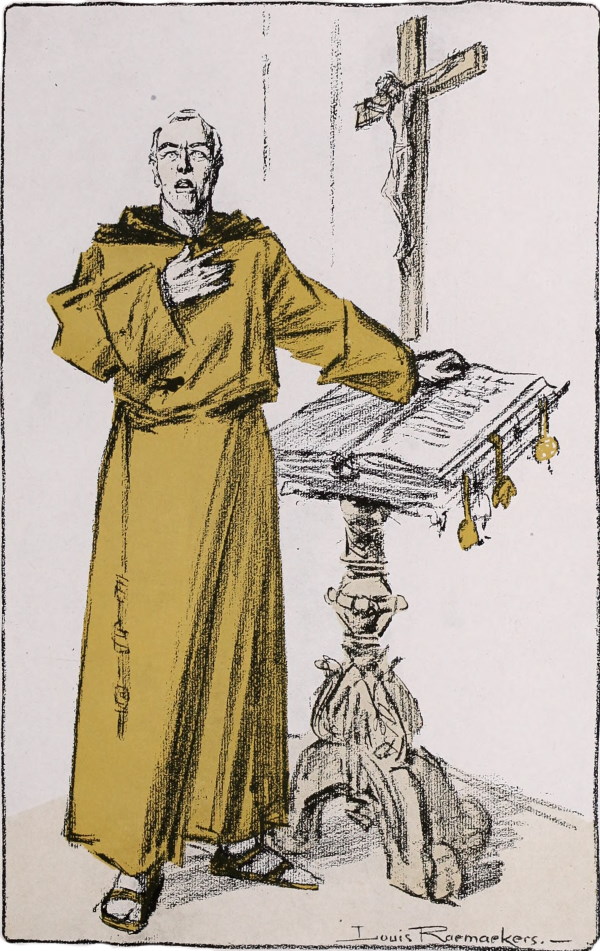
[Pg 124]
ALL wars bring their full measure of miseries and misfortunes, and this world war, initiated by Germany for the purpose of imposing a military domination upon Europe and America, and conducted with methods which combine the barbaric standards of the Huns and Mongols with the skilled mechanism of the twentieth century, has brought upon the world miseries that can hardly be estimated or described. There are some offsets, however, even in a contest like the present, which is a fight for the preservation of civilization against the onslaughts of scientific barbarism. No nation can take up arms for the defense of its rights and liberties and for the fulfilment of its obligations without bringing into the souls of the people some development of national and patriotic spirit.
The soldiers in the trenches and the citizens working at home are fighting and working for a common cause.
They come in this manner to have realization of what they owe to each other, to their country and to their consciences.
We may feel assured that through the sacrifices that are being made today in our country, of lives, of labor and of wealth, there will be developed from a people which had in its prosperity been growing rich and lazy-minded and forgetful of national morality, the soul of America.
Louis Raemaekers has done more than any one man to bring into expression the spirit of fierce indignation and horror that has come not only upon the people of Belgium and of northeastern France, who have been directly exposed to the brutal despotism of the Prussians, but upon all of those who are fighting to rescue the people of these imprisoned devastated provinces, and upon the whole civilized world.
Raemaekers has been able with the powerful genius of his pencil to give expression in cartoons that belong to the history of art and of the world, to this protest of civilization.
He is a poet as well as an artist.
His weird and sombre conceptions gave evidence of a powerful imagination. His work has been compared to that of Gilray, but the caricatures which in 1805 amused English men and frightened English children were merely clever pieces of drawing.
The wonderful designs of Raemaekers set forth the devilishness of the policies and the actions of the Prussians as incisively and as conclusively as if he had been sitting as judge in the court of final appeal.
These grim pictures constitute indictments of great criminals. It is impossible to tell how far they may as yet have penetrated Germany, but sooner or later these irrefutable judgments of criminal acts will be brought home to the consciousness not only of Prussia, and of the leaders who are directly responsible for the murders and the other horrors, but of the whole people of Germany who, poisoned by the fumes of prussic acid from Berlin, have been willing to give their strength and their force to the attempt to impose Prussian tyranny upon the peoples of the world.
GEO. HAVEN PUTNAM.
February 1, 1918.
[Pg 125]
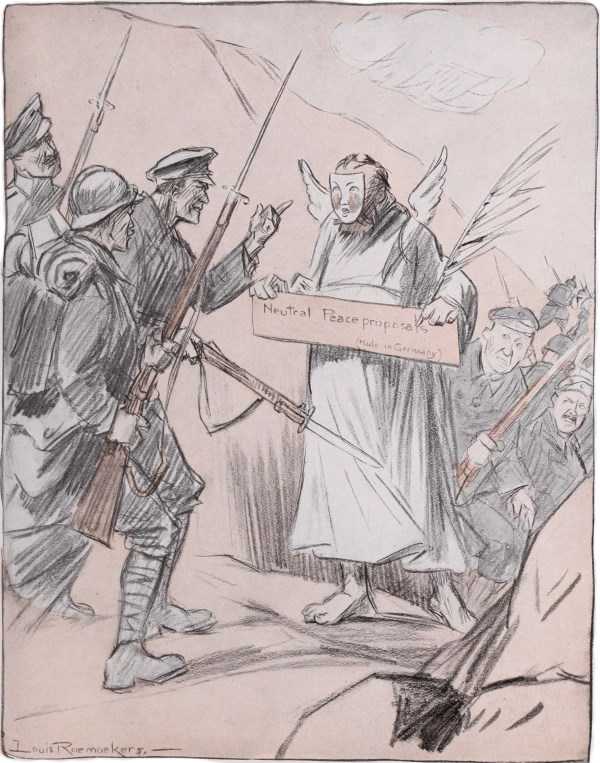
[Pg 126]
A LAYMAN’S PRAYER FOR AMERICAN SOLDIERS
OUR Father which art in Heaven, bless and inspire our armies in the field, our ships upon the sea. Watch over the sons of America fighting for Liberty. Strengthen and hearten them in the hour of pain and peril. Grant them victory, we beseech Thee, and lead them safely home. Make us who love them do our part loyally. Keep us united in our will to bring upon earth a reign of right and freedom. Amen.
CLEVELAND MOFFETT.
[Pg 127]
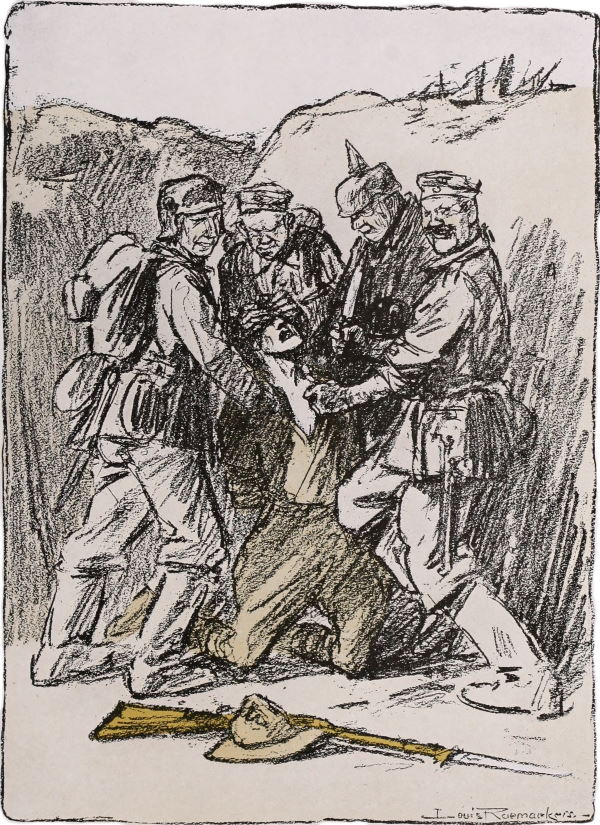
[Pg 128]
“Dog-gone it, Hindenburg, don’t make your
strategic moves when I am standing directly behind
you!”
ON one occasion, when Hindenburg reported having “carried out his retreat according to plan,” the Kaiser, encamped at the rear, received a very discomfiting bump. Evidently, the “plan” was no less an inspiration of the moment than many others the Germans have announced, in order to put a good face upon their reverses.
[Pg 129]
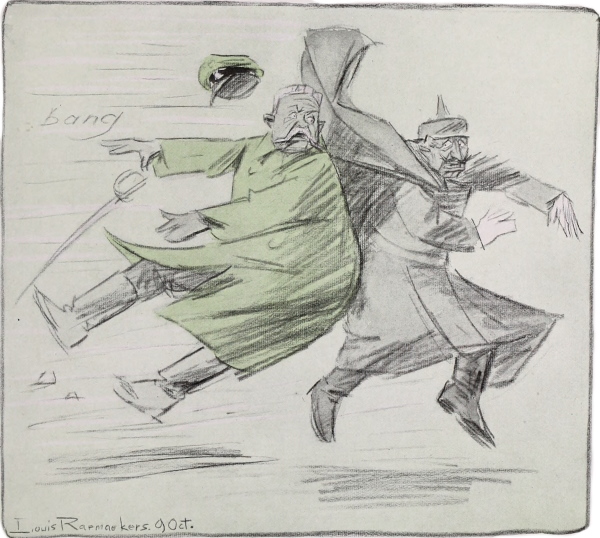
[Pg 130]
THE small speck that at first seemed a dull mist hanging over the Western Hemisphere caused little else than sarcastic flings at our own Republic, and had it been possible to awaken pity in the breast of the Arch Demon, striving to spread his wings over the whole world, some sympathy might have fallen to us, for the weak mind we showed in presuming we could do anything to check the Imperial army in its brutal course. But happily great oaks from little acorns grow, from stationary mists dark clouds may rise, from low uncertain rumblings the ear-splitting thunder clap may spring, and make man and beast seek cover. So, by the Grace of God, things have developed, and the mist that was a banquet joke, is transformed, and spread into a veritable storm, and its direction is across the wide ocean; it is an on-rusher that awakens a craven fear; and it well may. It is no autumn cloud, whose fleecy skirts the sun has painted with gold; but something equalling the harbinger of death, that the soothsayers saw driving over Rome when Cæsar’s end was nigh; on which could be seen “Fierce fiery warriors in ranks, and squadrons and in right form of war”; and from which blood is drizzling, not only to fall over France, or Flanders, but perhaps to darken the sky, and crimson the soil, even at that nest of iniquity, Potsdam.
PALMER COX.
[Pg 131]
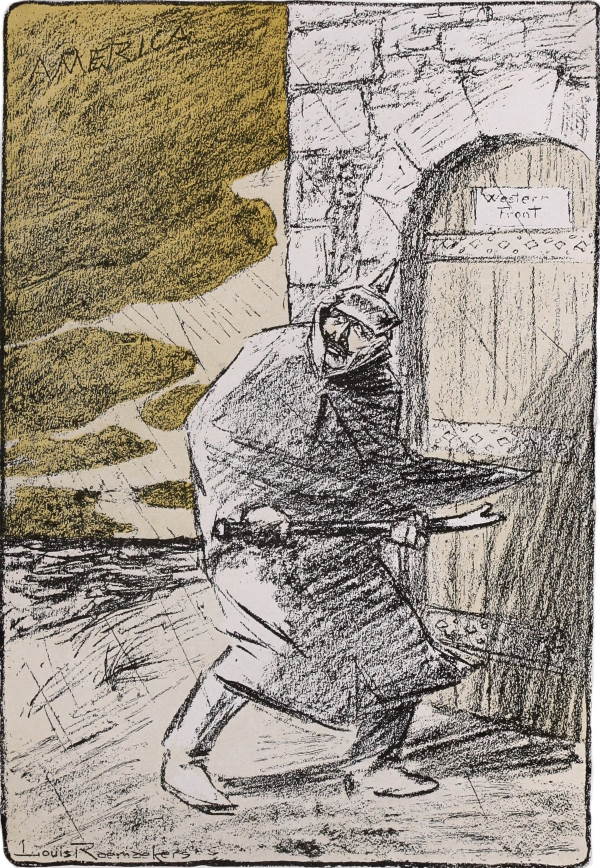
[Pg 132]
CHARLES EDWARD RUSSELL.
[Pg 133]
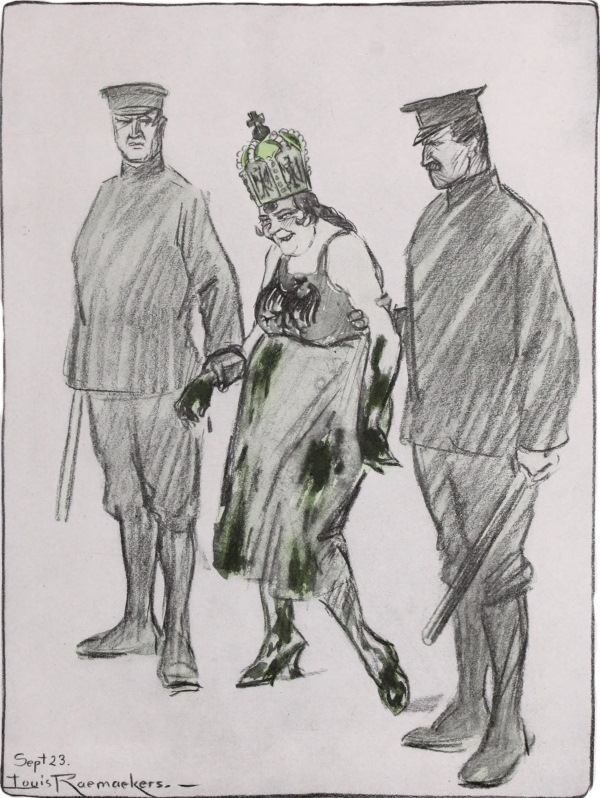
[Pg 134]
COUNT HERTLING asks resentfully: “Who dares to suggest that I am not on the side of justice?” Count Hertling is undoubtedly sincere. Until this war began the world had almost forgotten the record for duplicity and inhumanity of the military tyrants of Prussia,—the treachery and barbarity of the race of which he and they are the offspring. They are running true to type, but for the time we had forgotten what the type was; yet it was known well enough to Julius Cæsar and to the others who ruled the Roman world. For him the Germans were “that treacherous race which is bred up from the cradle to war and rapine,” who “practise the base deception which first asks for peace and then openly begins war,” who are “outside the pale of negotiations”—yet Cæsar had not heard of the treaty of Brest-Litovsk! History is repeating itself after two thousand years, yet two thousand years ago it was then only repeating itself. The Prussian has always been the same. His instincts are today as they were when he roamed the swamp lands, naked and with a stone club in his fist, pig-eyed and bull-necked, like the mastodon of his native forests. Raemaekers has done well to symbolize him in his treatment of helpless Russia, as a hairy prehistoric beast crushing out the life of a bleeding nation beneath his ponderous feet. Count Hertling says he is on the side of justice. He is—of German justice, the justice of which the butchered civilians and outraged girls of Belgium, the crucified Canadians, the murdered Edith Cavell, and the martyred babies and their mothers of the Lusitania, are examples. It is the justice of the mammoth and the cave-man, the sabre-toothed tiger and the woolly rhinoceros,—all of whom would agree that Count Hertling in his dealings with Russia was actuated by the only recognized Prussian ideal—the right of the strongest brute to ravish and destroy.
ARTHUR TRAIN.
[Pg 135]
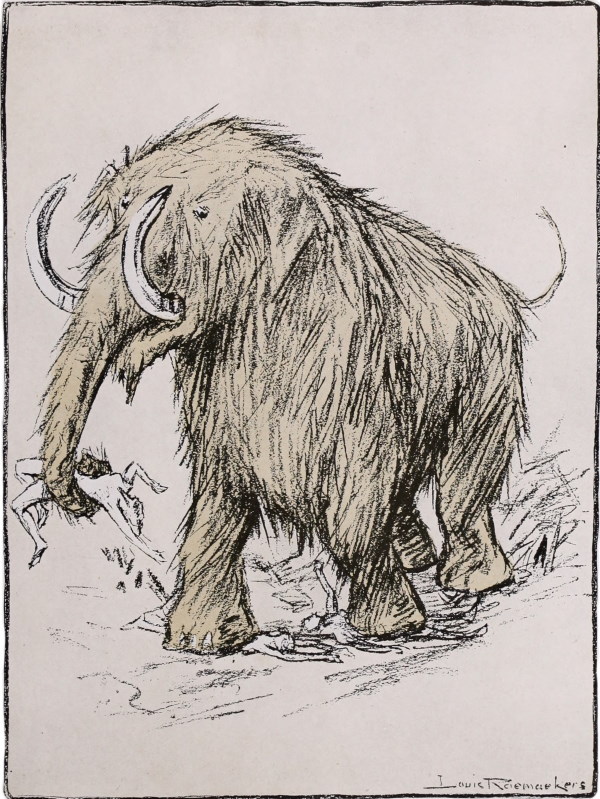
[Pg 136]
CANADA’S PART IN THE WAR
“BOUND by no constitution, bound by no law, equity or obligation, Canada has decided as a nation to make war. We have levied an army; we have sent the greatest army to England that has ever crossed the Atlantic, to take part in the battles of England. We have placed ourselves in opposition to great world powers. We are now training and equipping an army greater than the combined forces of Wellington and Napoleon at the battle of Waterloo.”
Speech of Sir Clifford Sifton at Montreal.
[Pg 137]
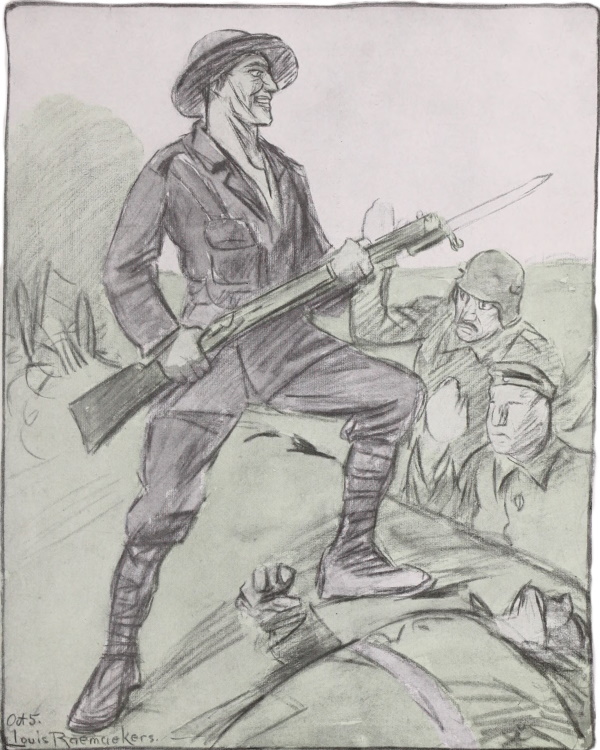
[Pg 138]
THERE is a part of Germany that longs for freedom; but that is not the Prussian part. The soul of Germany is not entirely killed by her mortal sins of money and land-lust; and Raemaekers here paints the remorseful soul, crowned with the blurred cross. Germany turns her back to the sky; she prefers to look at the dark ground of her dungeon rather than to face that light. She is chained by her own will, and yet her inmost soul revolts.
Let us not imagine that there are two Germanys. Before the war the Social Democrat was the official hater of the despotism of the Hohenzollerns. The war came, he ceased to be a Social Democrat when he became a Prussian. Before the war, the Centrum defended the rights of conscience against the Hegelian dogma of the absolute supremacy of the State. The Kaiser rushed from Norway, war was declared, and the recalcitrant Centrum,—the creature of the indomitable Windhorst, whom even Bismarck could not terrify,—becomes subservient! The Emperor does not say, “The State is I.” He says,—“Germany over all, and the German God must rule.”
Germany has chained herself. For more than ten years, I have lived geographically in Germany,—for Denmark, though one of the freest nations of the world, is a few miles from Berlin,—and I have seen the Old Germany growing into the New, materialized Germany. Bismarck helped this process with blood and iron. The New Germany has a soul, but she has chained it to avarice and pride and power.
MAURICE FRANCIS EGAN,
American Minister to Denmark.
May 28, 1918.
[Pg 139]
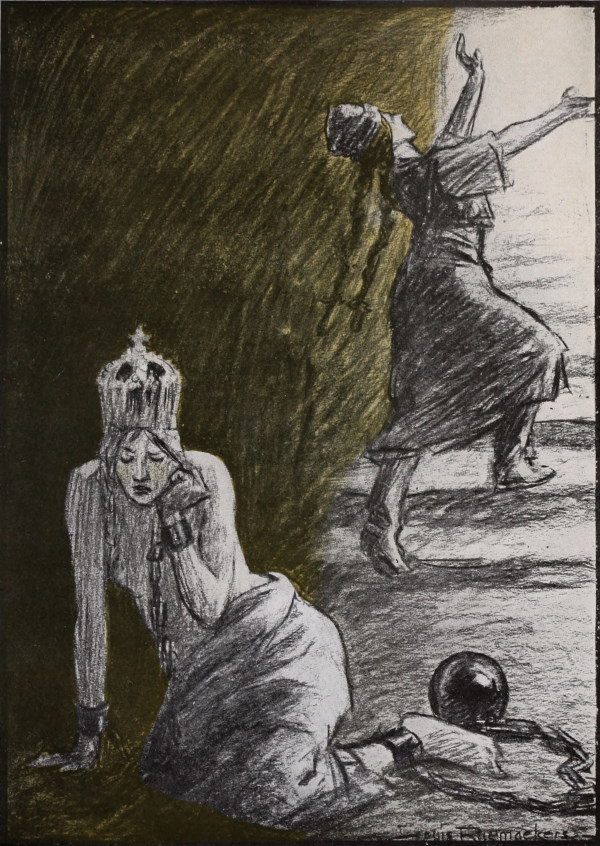
[Pg 140]
EARLY in the war the great writers and poets of the Allied nations joined in combating, with all the inspiration of the cause of liberty, the campaigns launched in varied guise by seditionists here and abroad. In this effort literature has made a worthy contribution to the battle for civilization. It remained, however, for the art and genius of Raemaekers to rout the propagandists of the enemy by delineating the great basic truths of war as waged by the Huns. It has been his work, more than that of any other person, to delineate the righteousness of the Allied cause.
His portraiture is a protest, an indictment, and an inspiration. He destroys the foe’s misrepresentation and exposes his mendacity while constructively informing the mind and awakening the imagination. He enables us to grasp all the details of sorrow, of devotion, together with all the splendor of modern battle behind his story. He horrifies us with the brutality of uncivilized warfare, and at the same time arouses within us the determination to right the wrongs of an outraged world. His very shock is a stimulus, for in telling us of the horror of war, Raemaekers makes us understand that to stop it forever by victory is the only thing worthy of thinking and feeling human beings. By speaking the universal language which art alone possesses, he has made the war clear to those who cannot read. Because of this genius for arousing our emotions, he is the premier recruiting agent of the armies of civilization for and behind the battle-line. He is truly a mainspring of our armed forces.
S. STANWOOD MENKEN,
President of the National Security League.
January, 1918.
[Pg 141]
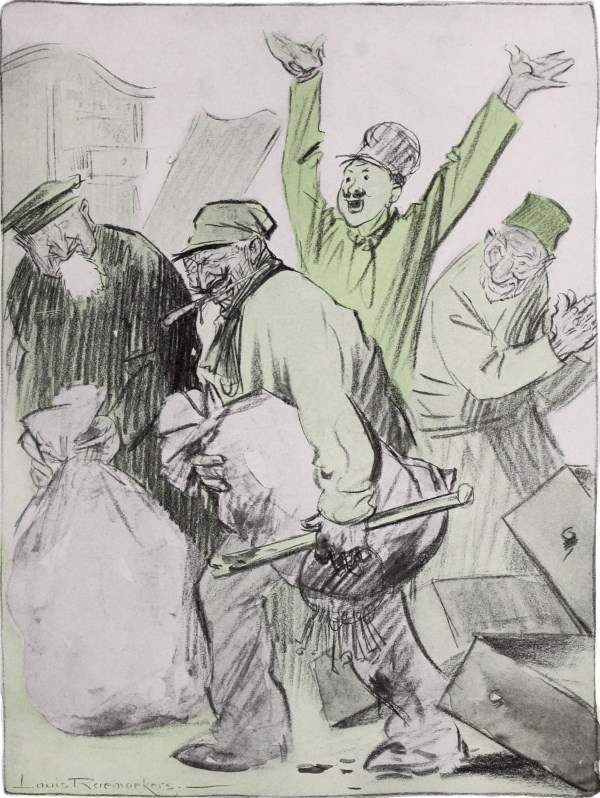
[Pg 142]
ROBERT W. CHAMBERS.
New York, April 30, 1918.
[Pg 143]
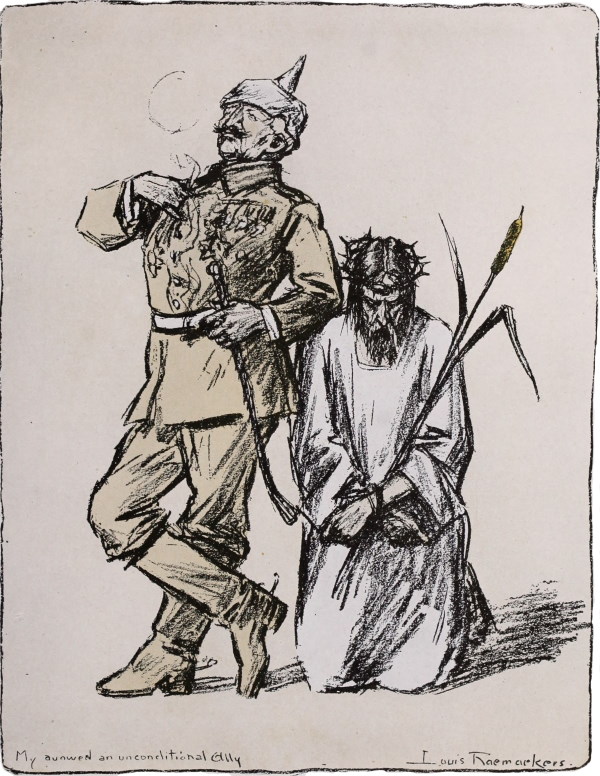
[Pg 144]
HEINE, when he warned the world that the real God of Germany was Thor and that when the Christian veneer wore off the old pagan god would with his hammer break in pieces the Gothic Cathedrals, especially warned France, whom above all the Beast hated. The warning has been justified by history. Before the war I have heard Germans speak gloatingly of what they did to France in 1870, and of what they meant to do next time. The phrase “bleed France white” had become a commonplace of German speech.
This hatred is rather mysterious. England fought France many times during five hundred years, but whenever peace was declared Paris would be full of Englishmen to celebrate, to shake hands and be friends. There never was this ferocious hate, and France has always been generous and chivalrous and human. Germany hates Great Britain and America with her head, but she hates France with her soul.
It must be that the modern Hun feels that there is something in his hated enemy which he does not possess and never can possess. And because the rest of the world loves France, he hates her all the more, with a cold and cruel and scientific hatred, as our artist depicts it in his terrible cartoon.
Perhaps some light is thrown on the problem by a typical piece of Gallic wit. A French writer commenting on the wanton destruction of the Cathedral of Rheims declared it to be the greatest single calamity to art that was conceivable, and then added that there could be another greater calamity—to allow the Germans to restore it! It adds fuel to the flame to know that the only great period of German literature—the period of Heine himself—was when it was under the complete influence and inspiration of France.
In a true sense the whole civilized world is fighting for France, to decide whether it is to lose all that France stands for, or whether the future is to be dominated by the ugly bestial force, without conscience and without heart, which Germany represents. The world knows that if it is a case of alternatives, civilization can do without Germany, but would be eternally poor without la belle France.
HUGH BLACK.
[Pg 145]
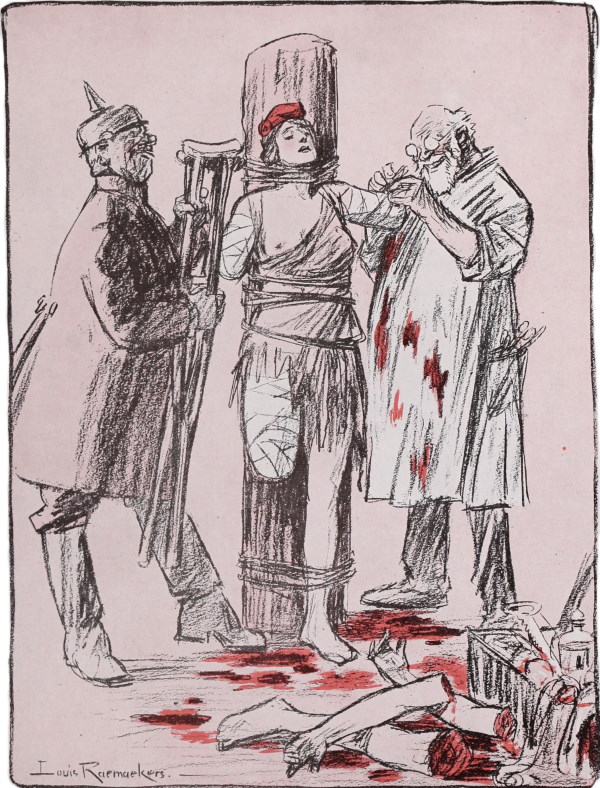
[Pg 146]
“Can the Japanese mouse free the Russian bear
from the German netting?”
“JAPAN must act on the broad principle that she is the guardian of peace in the Far East, and I am sure that to fulfil her duty she will utilize every resource at her disposal. Her part, instead of attempting the impossible, will be to stand on safe and reasonable ground. Through her control of the Southern Manchuria Railroad she is in a position to cut off communication between Harbin and Vladivostok now afforded by the trans-Siberian line. Harbin is the military, economic, and political base of Russia in the Far East. That means that the Russian possessions in East Siberia would be protected by Japan from German domination or aggression. Let me say, however, that any suggestion that Japan intends to seize these Russian possessions is monstrous. Japan would offer protection and assistance, but that is all.”
—Dr. T. Iyenaga, in the New York “Tribune.”
[Pg 147]
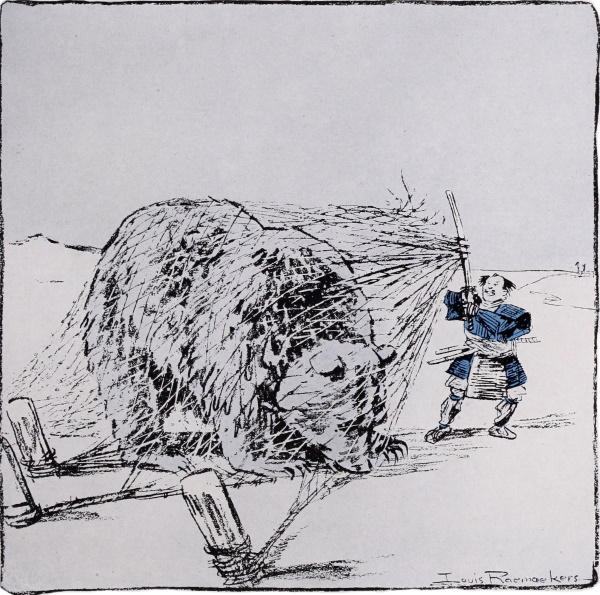
[Pg 148]
[Pg 149]
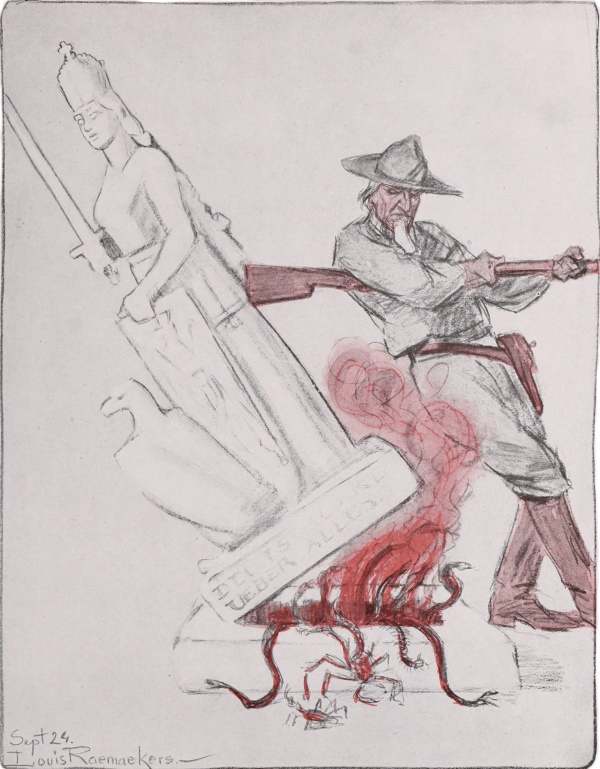
[Pg 150]
“WE cannot take the word of the present rulers of Germany as a guarantee of anything that is to endure, unless explicitly supported by such conclusive evidence of the will and purpose of the German people themselves as the other peoples of the world would be justified in accepting.”
—From President Wilson’s Reply to the Pope, August 27,
1917.
[Pg 151]
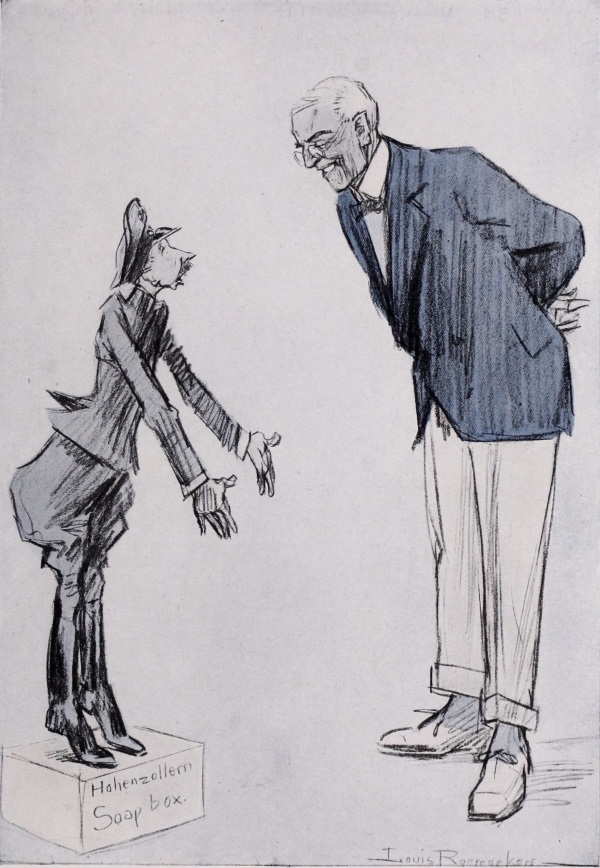
[Pg 152]
Bernstorff: “We have defeated Wilson!”
Wilson: “Wait a moment!”
[Pg 153]
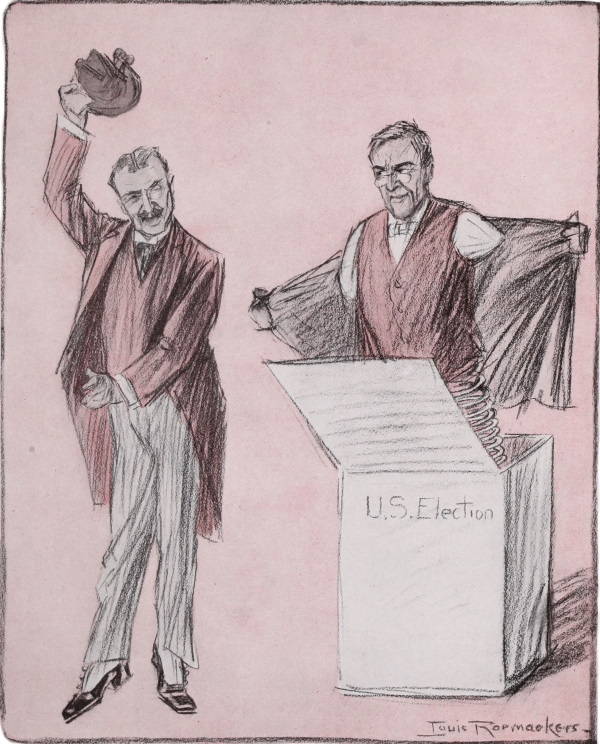
[Pg 154]
THE GERMAN SUBSTITUTE FOR THE TWENTY-THIRD PSALM
THE Kaiser’s our shepherd, we shall not rest.
He maketh us to desecrate green pastures; he forceth us to kill in still waters.
He claimeth our soul, he leadeth us in the paths of frightfulness for his name’s sake.
Yea, though he plunge us into the valley of death, we must call him not evil, for he is our master, his rod and his staff they drive us.
Surely horror and evil shall follow us all the days of our life till we flee from his rule forever.
ALICE HEGAN RICE.
March 16, 1918.
[Pg 155]
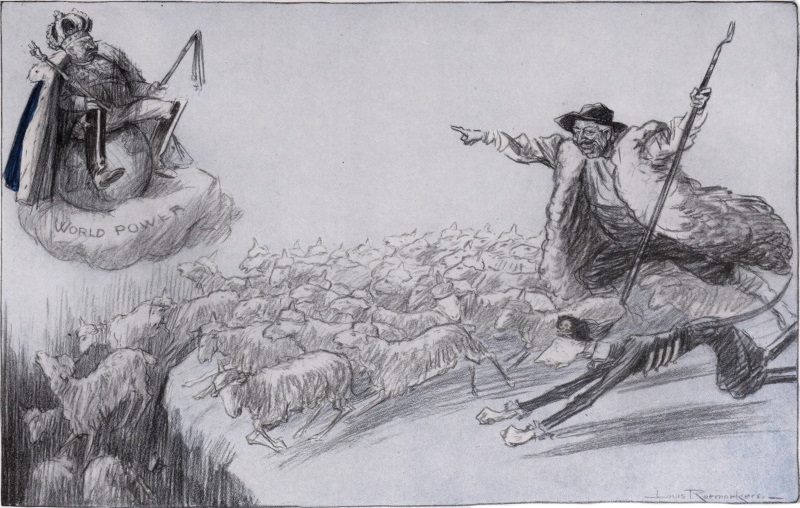
[Pg 156]
OLIVER HERFORD.
[Pg 157]
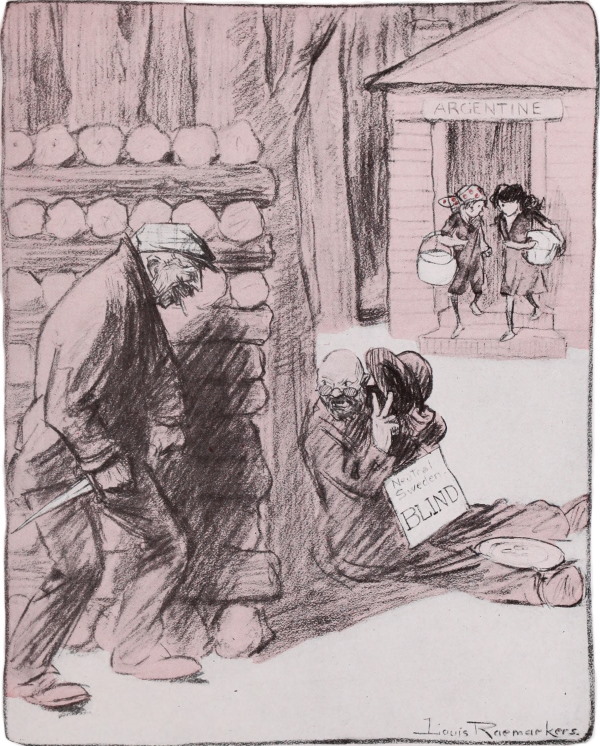
[Pg 158]
WITH the entrance of the United States into the Great War, we Americans laid aside forever our spiritual isolation. We accepted our share of responsibility for the assaulted civilization of the world, and our share of danger at the hands of its great assailant. A free people, we willingly chose the path of uttermost pain, and we chose it for the sake of our nation’s honor, our nation’s ultimate safety, and the salvation of our nation’s soul.
When Germany denied us the waterways of the world, she struck hard at our commerce, at our just rights, and at our decent pride. What were the Hohenzollerns to us that we should have taken our orders from the Kaiser, tied up our ships in harbor at his behest, and, cowering by our own firesides, have waited for his permission to carry our flag across the sea? Was it for this that our forefathers had bought our freedom with their lives? Had we revolted when we were colonists, weak, poor, and without resources, from the tyranny of Great Britain (a stupid but never a brutal tyranny), only to bow the strength of our manhood before Germany’s shameful threats? Had we preached the sacredness of human rights for over a hundred years, only to acquiesce in Germany’s campaign of murder; and, by consenting to her crimes, become a partner of her guilt? We had suffered cruel injury at her hands. Were we also to lose our souls through ignoble submission to wrong-doing?
Our answer was given when President Wilson asked Congress to declare a state of war. We had then, and we have now, no choice but to fight for our liberty, or to lose it. Our ships had been sunk, our seamen drowned. Treacherous officials had plotted to embroil us with friendly nations. Treacherous hands had fired our factories and murdered our citizens. The careless lie or the insolent taunt which were Germany’s alternate answers to our remonstrances, and which she seemed to think would keep us quiet until she had leisure to turn her arms upon us, are silenced now. We are upholding the safety and decency of the world, which has been as deeply degraded by vandalism as when Attila swept his hordes across the ravaged face of Europe. Our young soldiers are changing guard with the war-worn veterans of France and Great Britain. Valiant and gay, they face the oppressor. “He that loveth his life shall lose it”; and these men stand ready to lay down their lives for all they hold sacred and dear. Faithful to their country, faithful to their allies, faithful to the freedom in which they were reared, they strike their blow in the great name of America, and for the peace of God.
AGNES REPPLIER.
[Pg 159]
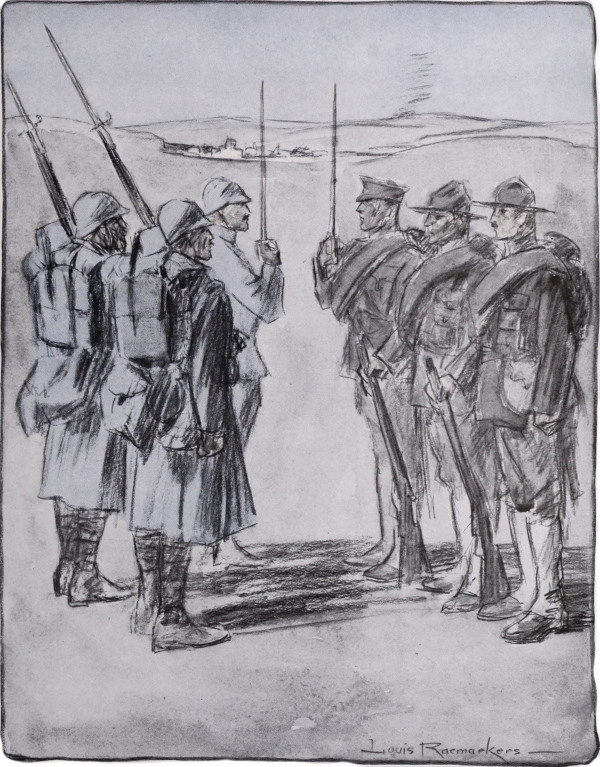
[Pg 160]
“I will never make drawings against the Yellow
Peril again!”
THE Kaiser has a good many things in his past to live down, but he certainly never foresaw that some day his inept activities as an artist would stand across his path. Raemaekers, who was not likely to forget anything that Wilhelm had done in this particular line, shows him on his knees to Japan (and incidentally to Mexico), as the infamous Zimmermann note to the German minister at Mexico City revealed him, full of remorse for those drawings he once made against the Yellow Peril. And what is Japan’s reply? The expression which Raemaekers has caught certainly agrees very well with the following statement of Count Terauchi, Japanese Prime Minister: “Nothing is more repugnant to our sense of honor and to the lasting welfare of this country than to betray our friends and allies in time of trial and to become a party to a combination directed against the United States, to whom we are bound not only by the sentiments of true friendship but also by material interests of vast and far-reaching importance.”
[Pg 161]
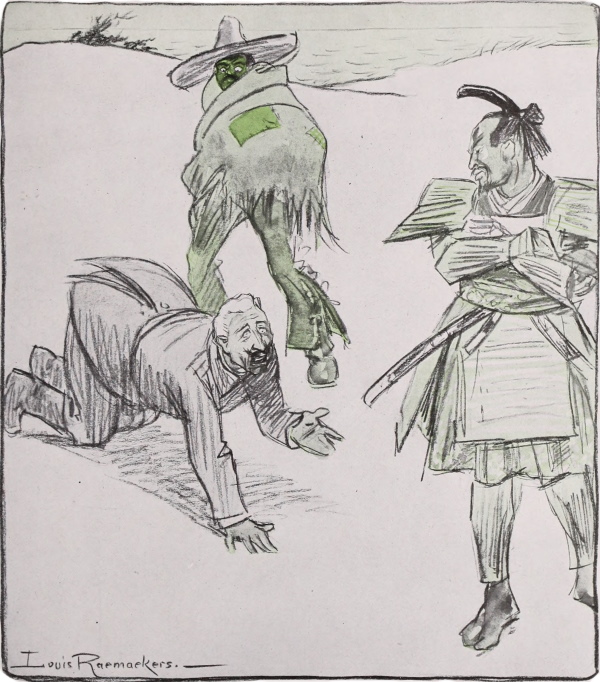
[Pg 162]
William: “Go, my doves; your charms may
prove more fatal than my armies.”
[Pg 163]
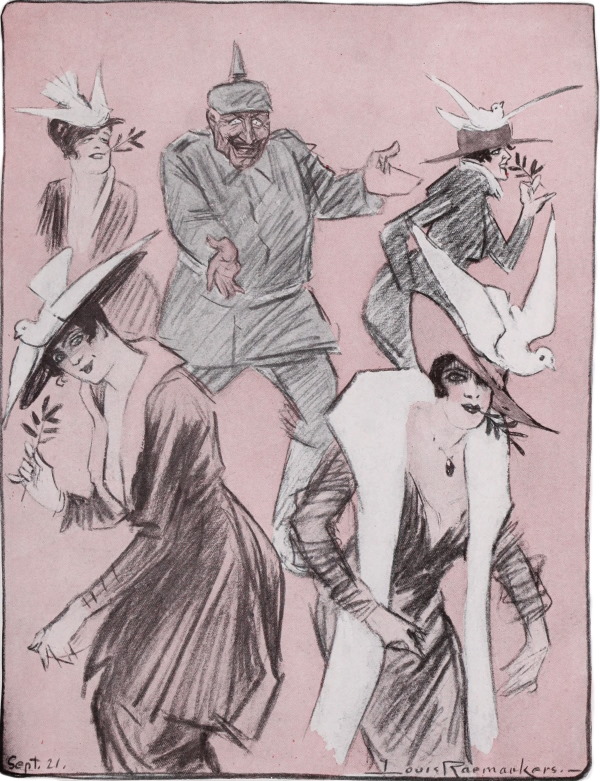
[Pg 164]
Germany Sinks British Hospital Ships
THE British Admiralty issued a statement on April 23 [1917], announcing the sinking of the two hospital steamships Donegal and Lanfranc without warning by submarines; nineteen British and fifteen wounded German officers were drowned. In their statement the British authorities denied the German charge that hospital ships were employed to transport troops and military supplies.... Germany was notified that, if her course was persisted in, reprisals would follow, yet the British hospital ship Asturias was torpedoed without warning on the night of March 20. The ship was steaming with all navigation lights burning and the proper Red Cross signs brilliantly illuminated.... On the night of March 30-31 the hospital ship Gloucester Castle met with a similar fate. On this occasion the Berlin official wireless message again published a notification that she was torpedoed by a U-boat, thus removing any possible doubt in the matter.
—The New York Times Current History.
[Pg 165]
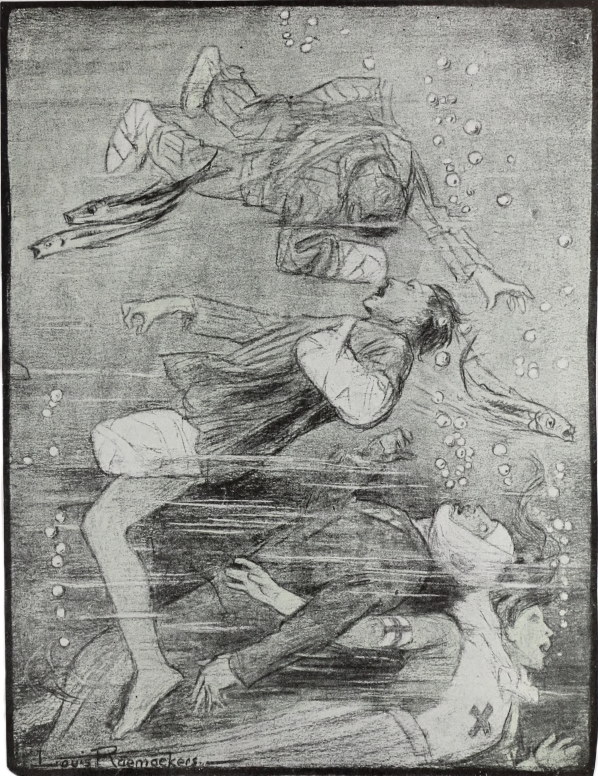
[Pg 166]
“I think, All Highest, we had better not insist
upon the annexation of America.”
IN the inscription “Ten Million Men Between 21 and 30” on the Statue of Liberty, Raemaekers has as usual gone to the heart of things. Ten million trained citizen soldiers!!! What an insurance of peace and security against attack or insult. Universal Citizen Military Education and Training.
From the beginning the first article in our International Creed has been the Monroe Doctrine—America for Americans. If the result of the present war shall be to add two additional items to that creed, namely, Universal Military Education and Training, and the United States, the First Air Power in the world, it will be worth all that it costs, and this great nation can go on in peace and security to work out the mighty destiny awaiting it.
Raemaekers’ placing “All Highest” and his aide upon the conning tower of a submarine, suggests another most vital matter at this present time.
The submarine has held the world’s spotlight for the last two years. Its deadly efficiency is universally conceded. That deadly efficiency is the direct result of Admiral von Tirpitz’s unyielding insistence on a centralized, independent, untrammeled Department for the submarine.
We must adopt the same methods if we expect to attain equally deadly efficiency in the air.
But the possibilities of the aeroplane are greater than those of the submarine. The aeroplane is capable of offensive in the air against aeroplanes or dirigibles, on the surface of the sea against ships, and under the sea against submarines. The offensive capabilities of the submarine can and soon will be restricted to under-surface activities.
Again, the submarine is limited to the oceans. The aeroplane is limited by nothing. It can go wherever there is air, and that means everywhere. In other words, the aeroplane is the master of the submarine.
If we today had a thousand swift, heavily armed seaplanes continuously patrolling the water within a radius of three hundred miles of Sandy Hook (from Portland, Maine, to Norfolk, Virginia), we should have our five Atlantic sea gateways well guarded, and could feel secure against any further serious damage from these pests.
Thus equipped, submarine raids upon our coast would be an impossibility; and even the imagination of a Raemaekers would not dare to conceive of a hostile submarine within sight of the Statue of Liberty.
PEARY.
[Pg 167]
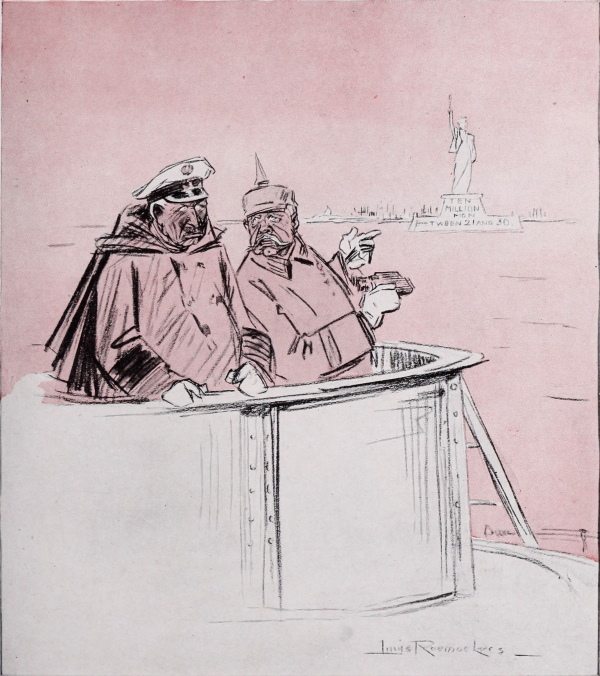
[Pg 168]
“I AM in the happy position of being, I think, the first British Minister of the Crown who, speaking on behalf of the people of this country, can salute the American Nation as comrades in arms. I am glad; I am proud. I am glad not merely because of the stupendous resources which this great nation will bring to the succor of the alliance, but I rejoice as a democrat that the advent of the United States into this war gives the final stamp and seal to the character of the conflict as a struggle against military autocracy throughout the world.”
—From the Speech of the Rt. Hon. David Lloyd-George at
the American Club in London, April 12, 1917.
[Pg 169]
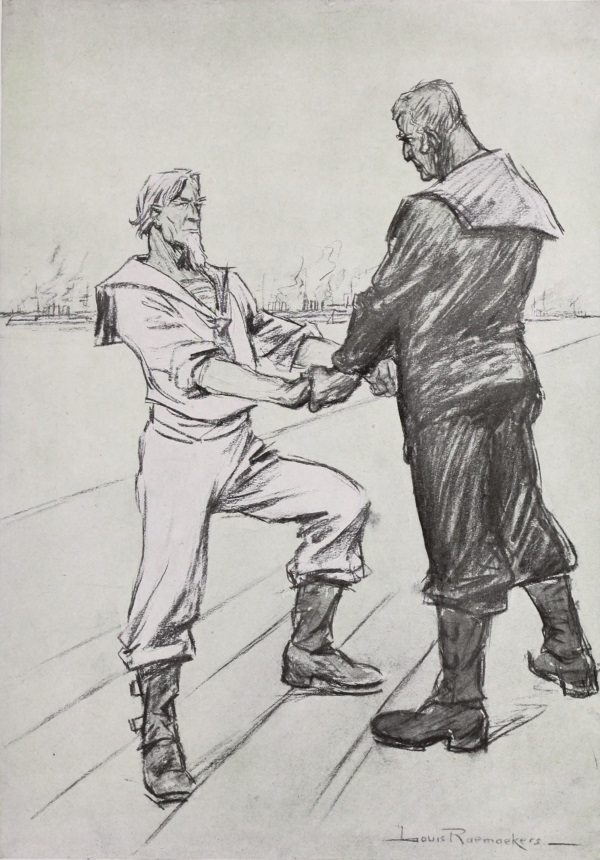
[Pg 170]
“Use always the American flag and commit as
much high treason as you like.”
“WOE to the German-American, so-called, who, in this sacred war for a cause as high as any for which ever people took up arms, does not feel a solemn urge, does not show an eager determination to be in the very fore-front of the struggle; does not prove a patriotic jealousy, in thought, in action and in speech to rival and to outdo his native-born fellow citizen in devotion and in willing sacrifice for the country of his choice and adoption and sworn allegiance, and of their common affection and pride. As Washington led Americans of British blood to fight against Great Britain, as Lincoln called upon Americans of the North to fight their very brothers of the South, so Americans of German descent are now summoned to join in our country’s righteous struggle against a people of their own blood, which, under the evil spell of a dreadful obsession, and, Heaven knows! through no fault of ours, has made itself the enemy of peace and right and freedom throughout the world.”
—From Otto H. Kahn’s “Right Above Race.”
[Pg 171]
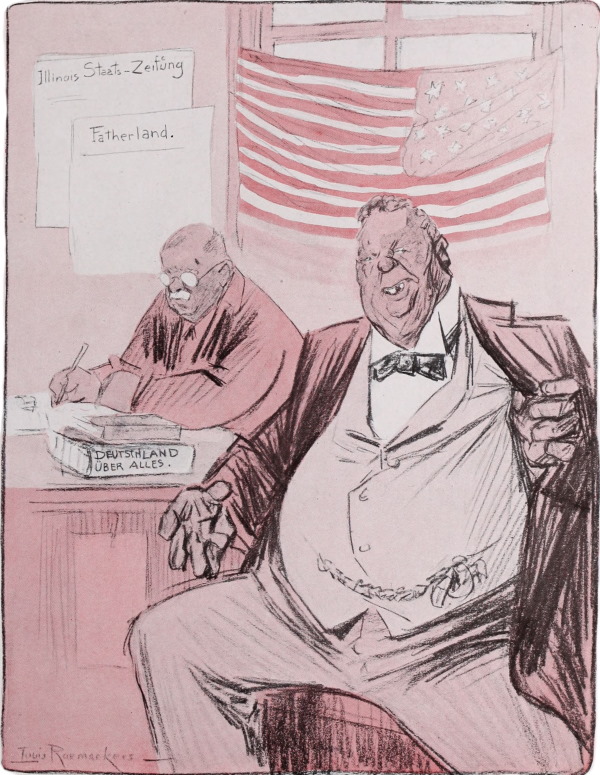
[Pg 172]
MANY things in the present war have aroused and enraged the people of the United States against Germany. The defilement of Belgium, the ravage of Serbia, the assassination of Armenia, all crimes against human nature in which we Americans share. Besides that, some revelations apply especially to us,—grievances, injuries and outrages, things that seem so far removed from the secret thoughts of decent and self-respecting nations that we hesitated to believe them. We must believe them now for we know at last that Germany has for not less than twenty years been working against the influence and good name of the United States. It was not for nothing that one of our best-known public men, when he visited Germany as far back as 1911, said that it was a country where he felt that “every man, woman and child looked upon him with hatred,” because he was conspicuous in this country which had become rich and powerful and prosperous by the road of democracy instead of by the German path of militarism.
Every day reveals some new evidence that the German mole was working in South America, in Central America, in almost every American state and city, to prepare the minds of those who were to take part in the infamous conspiracy. Before the war broke out in Europe, Germans were trying to organize an active cohort within our boundary. The effort to arouse Mexico against us while we were still neutral, is no worse than other German diplomacy such as the “spurlos versenkt” radiograms of the scoundrel Luxburg, directed against the Argentine; but the appeal to Mexico to “reconquer” Texas and the Southwest was worse than a crime, it was a blunder, especially resented by the people of that part of the country. Nothing but an absolute breach with Germany has made possible the revelation of the cynical violation of diplomatic privileges by German and Austrian officials in this country from titled Ambassadors down through consuls-general and consuls-particular and military aides and secretaries and clerks and hangers-on and spies and jackals, all uniting to stab the land which gave them hospitality. Whatever else may happen, a hundred years will not efface from the minds of the people of the United States the belief that “Germany cannot be a Gentleman.”
ALBERT BUSHNELL HART.
[Pg 173]
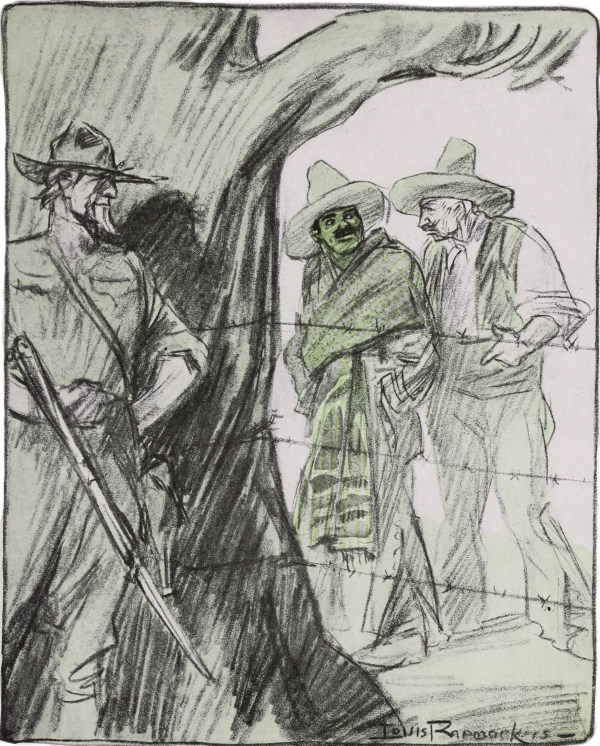
[Pg 174]
DOES not the cartoonist Raemaekers fail in this cartoon? The artist Raemaekers is inspired—here as always. But does the cartoonist succeed this time in burning the right idea, his idea, into the reader’s brain?
Here is the real Kaiser and here are real German workingmen. It is they who are carrying the burden of Kaiserism. All this is convincing. But do not other workingmen in other countries carry burdens?
The failure is only at first glance. Raemaekers is not concerned to reproduce the conventional cartoon of workingmen carrying a burden of other classes on their shoulders. The point lies not in the burden, but in the nature of the burden, the contrast, so perfectly portrayed, between the character of the Kaiser and the characters of his proud and willing slaves. The Kaiser, crafty and contemptuous, but neither so ignorant nor so stupid as to be wholly unconscious of the foolish and contemptible position he occupies! The workingmen evidently once strong, intelligent and enthusiastic, though now blinded and crippled, are utterly unconscious of what they are doing. Carrying the heavy burden of Kaiserism seems no more to them than their day’s work.
You see Raemaekers knows both Kaiser and workingmen, and so will have nothing to do with the conventional portraits of either. The Kaiser is neither a beast nor a fool—however foolish his position may be. The workingmen are neither labor heroes ready to revolt, nor conscious and beaten serfs.
So much for the picture—at second glance. It leads to an endless chain of reflections. But the first and most obvious is on the sort of burden these men are carrying. Here is an accepted ruler who is allowed to monopolize the force of the nation, as the cartoon clearly indicates. This of itself gives him an absolute and unlimited power over his workers. The only possible alternative use of that force is to make slaves of the workers of other nations. The German workingmen, it is suggested, lend themselves blindly to this work of enslavement also—naturally, for it is no different for their Kaiser to rule by force and lies over non-Germans than to rule by force and lies over Germans. The face of the Kaiser shows a subconscious realization of these lies. The workers show utter unconsciousness. The rule of autocracy over themselves and the extension of that autocracy over others by means of their blood is to them as much a part of nature as the motions of sun and moon or the rise and fall of the tides!
Indeed, the workingmen are clearly proud of their burden and his successes and undoubtedly feel that any people is blest to be brought under his benign rule. And here is the moral of the tale. It is the Kaiser’s successes that have so utterly blinded his serfs. Then there is one remedy and only one. We need hardly say what that remedy is.
WILLIAM ENGLISH WALLING.
[Pg 175]
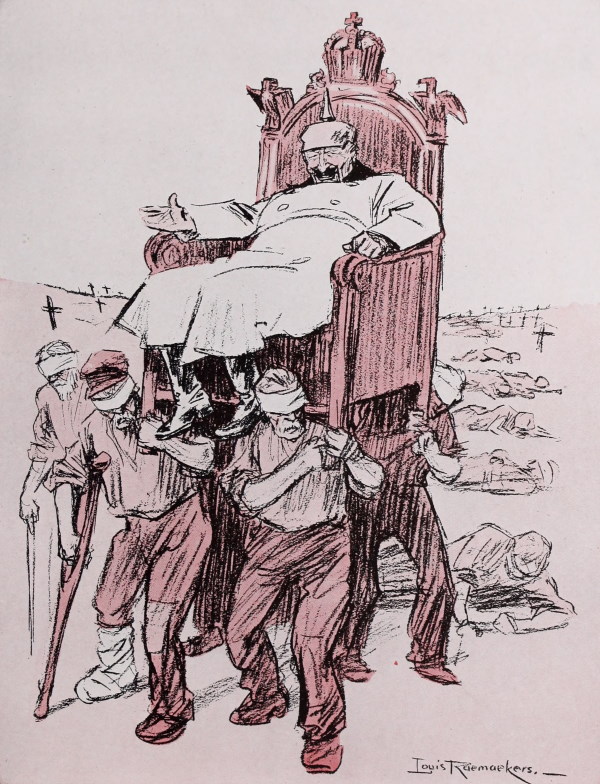
[Pg 176]
President Wilson elected for a second term.
[Pg 177]
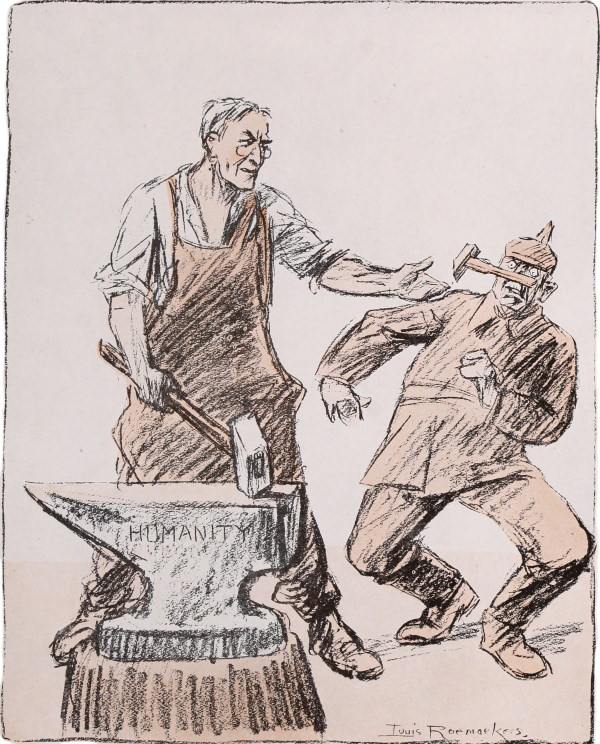
[Pg 178]
President Wilson’s answer to Hertling.
“WOODROW WILSON is in no sense a herald. The revolution of betrayed idealism has been in progress for more than a century, and in the last decade particularly there has been steady assault upon evil and outworn institutions. These passionate gropings of the spirit in the direction of ideals professed and not practised have merely lacked great leadership and authoritative expression. This is what Woodrow Wilson gives. He comes as a leader, as a nucleating force, as a clear, rallying cry to the almost mystic passions that are peculiarly the dominant note of the day. He fits the need of the bloodless revolution as skin fits the hand, bringing purpose and courage to the struggle for nobler fulfilment of the hopes and aspirations that thrilled those who first sought refuge in the New World from the oppressions of the Old—the struggle for real democracy.”
—From George Creel’s “Wilson and the Issues.”
[Pg 179]
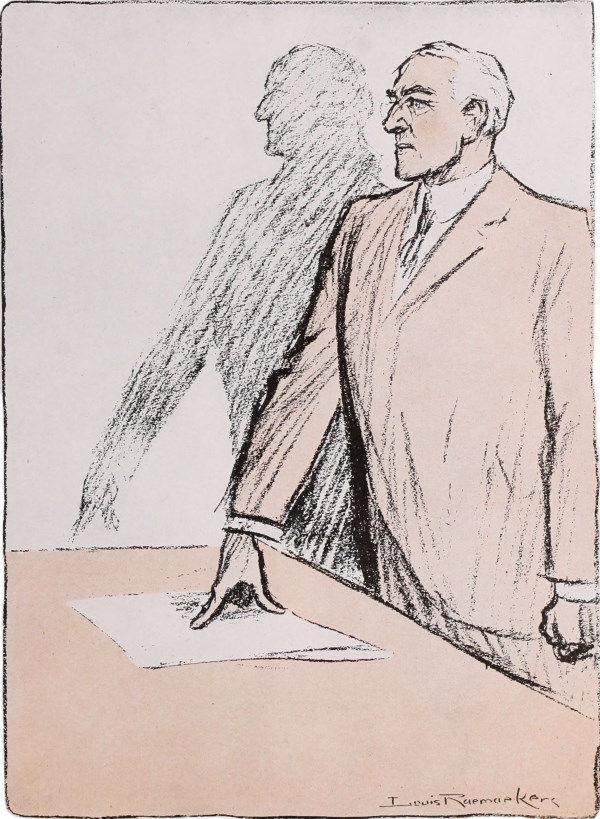
[Pg 180]
[The following lines are dated July, 1916. “As it stands,” writes Mr. Howells, “the poem ignores the glorious retrieval of our former sufferance. It might better now be called A Shame Lived Down.”—Ed.]
The American People
The Captain of the Submersible
The American People
The Ghosts of the Lusitania Women and Children
WILLIAM DEAN HOWELLS.
July, 1916.
[Pg 181]
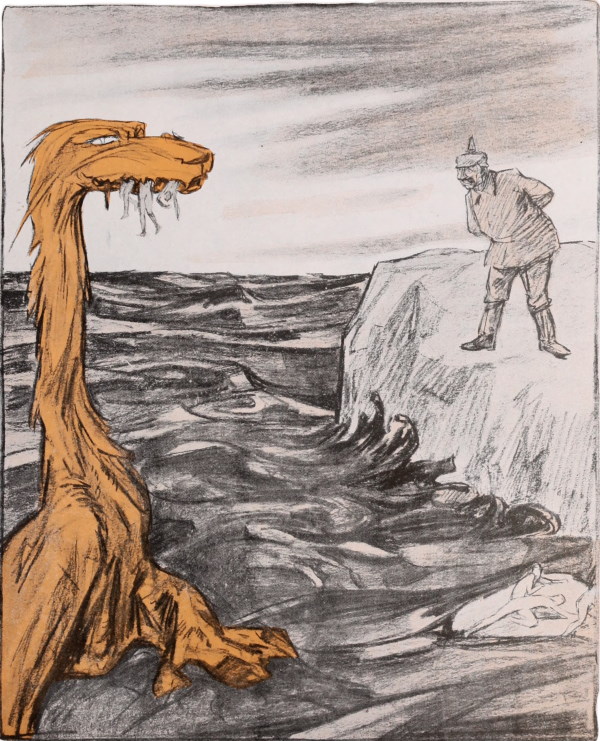
[Pg 182]
IT is Ambassador Gerard’s opinion that when the German government issued its final insult to the United States, all the Kaiser’s advisers were convinced that no provocation would make the American people fight. President Wilson, they argued, had just been re-elected on a peace platform. They counted, it was evident, upon the influence of the millions of German-Americans to frustrate hostilities, and Herr Zimmermann of the Foreign Office openly threatened the revolt of 500,000 German reservists in America if the United States dared “to do anything against Germany.” The Western States were reported to be indifferent to the technicalities of the submarine dispute. The East was described as interested in the submarine sinkings only because they interfered with the traffic in munitions and the profits therefrom. The whole country was supposedly averse to war, unwilling to enter into European entanglements, and devoted solely to peaceful industry and money-grubbing.
Yet within a year afterwards, America had accepted conscription and raised an armed force of two million men. It had contributed billions of dollars to the war through government loans that were more popularly subscribed than even the German or the English loans. Government control had been accepted without question in every sort of private activity. Food regulations, fuel regulations, the regulation of industry, shipping, labor and transportation, voluntary censorship of the press, military censorship of the cables and the telegraph and the mails, prohibition of distilling, the enforcement of price-fixing, the curtailment of profits and the levying of confiscatory taxes had all been submitted to without a murmur. It had come to be a byword in Washington that “the people could not be asked to do enough”; that the fund of patriotism was so great it was difficult to find channels for it; that no war in the history of the nation had ever been supported so unanimously.
What explanation is there for the miracle of that change? Washington believes that it is chiefly due to one man. It believes that President Wilson, by his patient efforts to maintain peace, convinced the whole nation of the impossibility of avoiding war before he gave voice to that conviction. It realizes that, even then, a great mass of the people were loyal but unenthusiastic, until he outlined the country’s war aims in his famous messages, and at once lifted the conflict to a higher level of purpose and gathered to his fervent support every sentiment and hope of democracy in the land.
Washington is now convinced that the war can have but one issue. There is no question of the outcome. The leaders of the nation are aware that the United States is “in the ring to stay.” As the Secretary of War has said: “The American people were slow to rouse to this war. They will be as slow to cool. They wished peace. They still wish it. But they have learned that there is but one way to obtain peace, and they propose to obtain it that way. They know what they are fighting for, and they will fight till they achieve it.”
HARVEY O’HIGGINS.
[Pg 183]
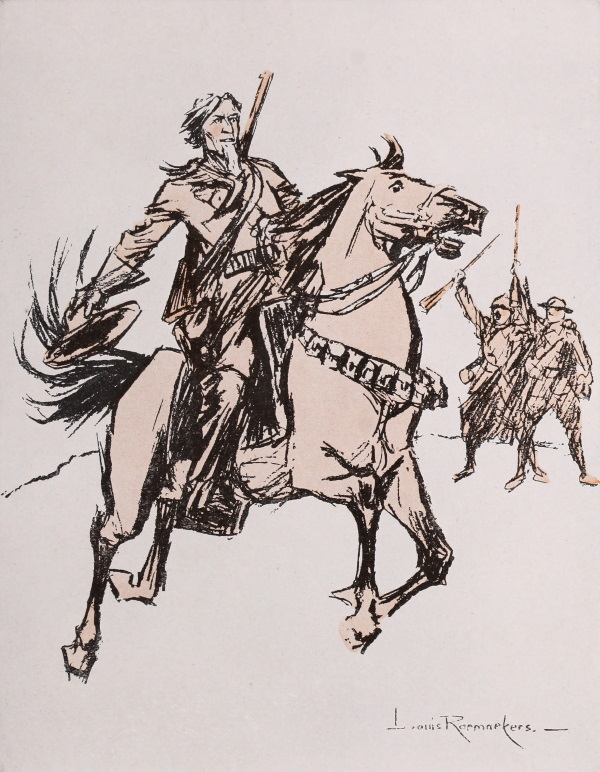
[Pg 184]
[Pg 185]
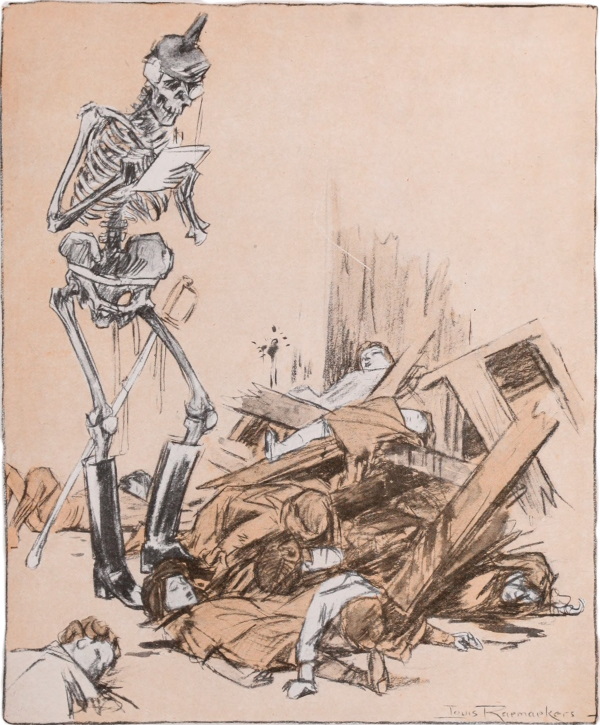
[Pg 186]
CAN a Republic fight a successful war? Can a people with a century and a quarter of free thought, free speech and free press change suddenly from words to deeds? Can custom and tradition yield gracefully to necessity? Is the heart and brain of the Republic so impressed with the magnitude and importance of this war as to induce it to forget the things which are past and to press forward to the things which are needful?
The Imperial German Staff thought not. It imagined that a people, whose daily sport was carping criticism of their public officials, whose army was hardly as large as a policeman’s squad, whose sentiments were all for peace and arbitration, whose ordnance was archaic and whose only gas-bombs were perfervid oratory could never right-about-face and set themselves to engage in the horrific warfare desolating the fields of Europe.
The mistake in this German opinion sprang from a misconception of what liberty really means and of the things for which freedom really stands. Its assumption was that there could be no courage with kindliness nor strength with flexibility. To the slow-going mind of the methodical German his mistaken view is beginning to appear. His first jolt came when the traditions of a century and a quarter with reference to military service were, without riot, tumult or disorder, set aside and 10,000,000 young men of America, without murmur, submitted themselves to conscription. He was further prodded when he learned that, as each successive liberty loan was presented to the people of America it was promptly taken, and what is more important, taken by larger and larger numbers of citizens.
No wonder Uncle Sam and the world think it no bad start that we have made. Like all reforms, it has been accompanied by lapses, by weaknesses, by mistakes of judgment, but through it all there has run the golden thread of a cohesive, coherent and indomitable American public opinion that this country, having set itself to the task of assisting the Allies in forever freeing the world from the menace of German military power, will never turn back in the breaking of a single furrow until the blood-guiltiness of the German race shall be put underneath the sod and the world shall be planted with the asphodels of a permanent peace.
Uncle Sam still smiles confidently, knowing full well that every day is rectifying mistakes and that every day is adding to the bull-dog tenacity of a people, who are willing to defend to the uttermost the principles for which they stand against invasion from without and sedition from within.
THOS. R. MARSHALL,
Vice-President of the United States.
[Pg 187]
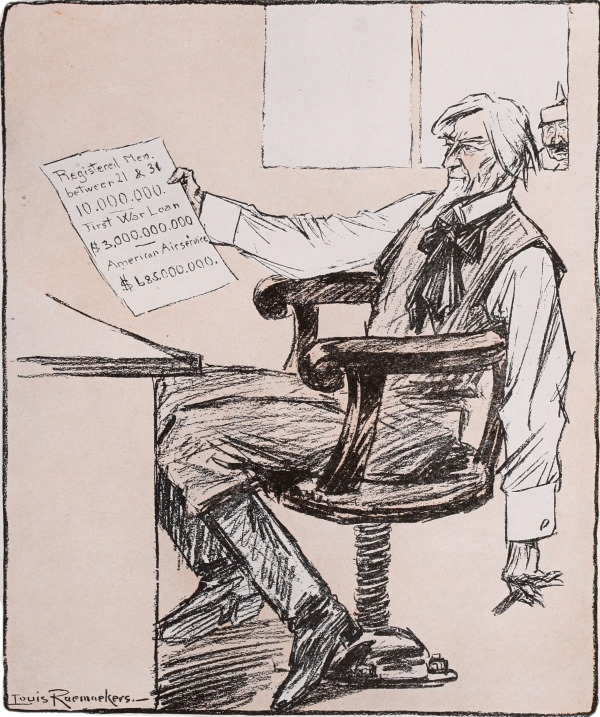
[Pg 188]
The Junkers: “These Lansing disclosures are bad. We don’t know how to counteract them because we don’t know how much more evidence he has got.”
[Pg 189]
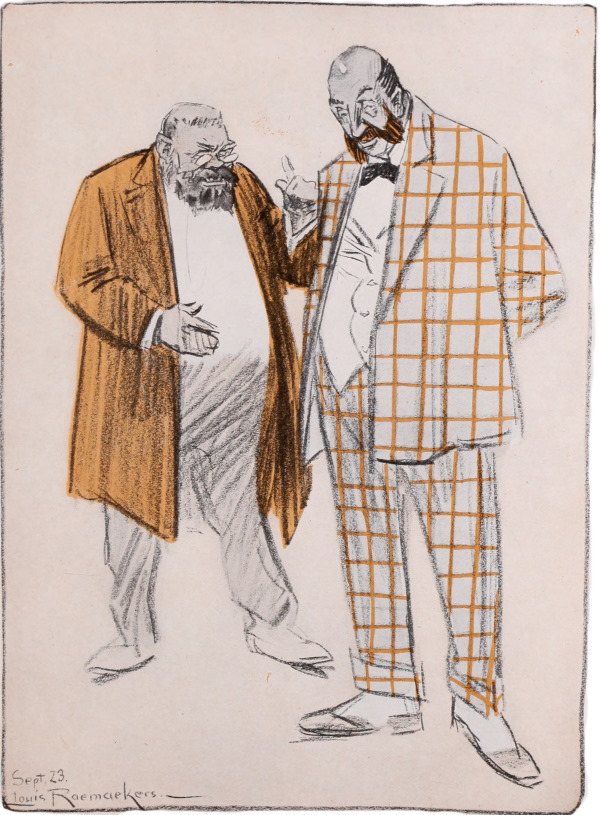
[Pg 190]
THEY do these things differently in France. While in France in May and June, I saw many squads of German prisoners working at the railroad stations, on the roads and in the factories. Of the several thousands I saw, not one looked underfed, ill clothed or abused. While their barracks did not have steam heat, electricity and all the comforts of home, the board and lodging they received compared favorably with that of the average French soldiers, and the franc a day thrown in as wages could all go for extras if desired. I was told that they all preferred to be prisoners in France rather than to return to the “freedom” of Germany while the war lasts.
Once I obtained permission to question a gang of Prussians working in France on an American road under a British guard. This is what they said to me: “We believe America intends to conquer France. Certainly you will never leave this country after having spent so much money on docks and wharves and warehouses and railroads.”
Evidently the common German mind cannot conceive of a people going to another’s territory and spending money there unless with some sinister, ulterior, selfish, political motive behind it.
As Irving Cobb says, we must extract the mania from Germania.
HAMILTON HOLT.
[Pg 191]
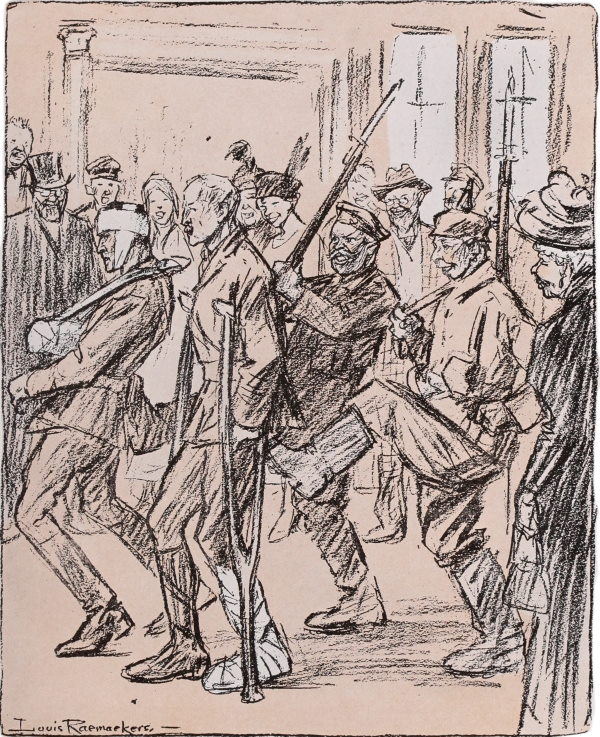
[Pg 192]
IT is one of the tragedies of history that the great Social Democracy of Germany, in which liberal thinkers of all lands reposed so much faith, proved, when the testing time came, to be utterly devoid of intellectual and moral integrity, a base betrayer of international Socialist ideals and a subservient tool of Prussian autocracy.
The great majority of the German Socialists, led by such men as Scheidemann, Sudekum, David and Legien, upheld the Imperial German Government and thus became the accomplices of the assassins of Potsdam. These so-called “Socialists” even stooped so low as to attempt to bribe the Socialists of other countries in the interests of the Kaiser and his cowardly crew. In Italy and in Russia in particular, and in other countries less effectively, they used their Socialist connections to assist the military schemes of Germany, notwithstanding the fact that these were designed to destroy every essential Socialist principle.
Herr David, perhaps the ablest of the leaders of the Majority Socialists, declared in the Reichstag that “The German armies must continue to fight vigorously whilst the German Socialists encourage and stimulate pacifism among Germany’s enemies.” The whole policy of the Majority Socialists has been based upon that sinister principle.
The small and uninfluential but heroic minority, led by Karl Liebknecht, Rosa Luxemburg and George Ledebour alone have exemplified the ideals of Socialism. They deserve our lasting honor as fully as the others deserve our lasting contempt.
Socialism is not dead in Germany: only the great political party of Socialism is shattered. In the hearts of the brave men and women of the Minority Socialists the sacred flame still burns. In that lies the only hope for German Socialism.
History will record this bitter judgment of the German Social Democracy: It was an active partner in the crimes of the Hohenzollern dynasty against civilization; it infamously betrayed the Russian Revolution and prostituted itself to the most malefic despotism of a thousand years.
JOHN SPARGO.
[Pg 193]
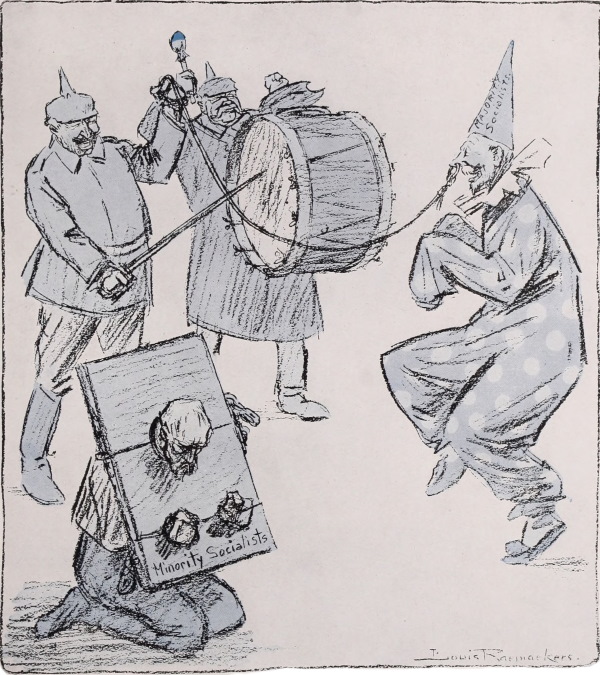
[Pg 194]
THE moral revulsion of the world against the Germans is justified by their use of science.
It is not a question of the excellence, amount, or character of science—all subjects of legitimate debate—but of the use the Germans make of science. While science has been used in war at all times and has been a formidable arm in the hands of those who have known how to use it, still the limits of its use have been fixed with more or less rigor. Even before the conventions of The Hague were formulated, there was the general recognition of the natural distinction between civilized and barbarous warfare. The savage’s poisoned arrow has been the symbol of what, though scientific, was barbarous. The murder of the wounded soldier or of the disarmed prisoner has always been condemned as the crime of the apache, not the method of the gentleman. Pity for the innocent—women, children, even the animals—and merciful treatment of the helpless—the drowning, the famished—seem to mark man, even in the profession of intentional killing of his fellow-man, as moved by a certain sentiment, a certain sense of human superiority to the brute which takes blood simply from the love of it.
Even against the legitimate foe there are certain means of offense so base—the use of poison in wells, the diffusion of microbes of disease—or so treacherous—the dynamite-loaded cigar—that the chivalrous man redresses himself at the thought of them with a shudder of mingled moral contempt and physical nausea.
This has been the use made of science by the Germans. They have abolished the distinction between the knight and the brute, between the man and the snake, between pure science and foul practice. This damns the German race.
Our grandchildren will say to their grandchildren: “You murdered people in open boats, you bombarded audiences kneeling in churches, you torpedoed hospital ships in plain ocean, you sent young girls into immoral slavery, you tortured prisoners, you poisoned the wells used by civilian populations, you did a hundred treacherous things that our fathers and mothers shuddered to recall. You Germans did it.”
To future generations this will damn the German race. No theory of the super-man, of the chosen state, of the alliance with God will ever gloss it over.
Their science may have honored the Germans, but the Germans have dishonored science.
German science has always had the credit of making happy application and practical use of abstract laws and formulas, chemical, physical, biological. In applying science in war, however, it has disallowed the moral laws which underlie all sound science and healthy life. Here German “applied science” will remain, let us hope, for all time unrivalled.
J. MARK BALDWIN.
[Pg 195]
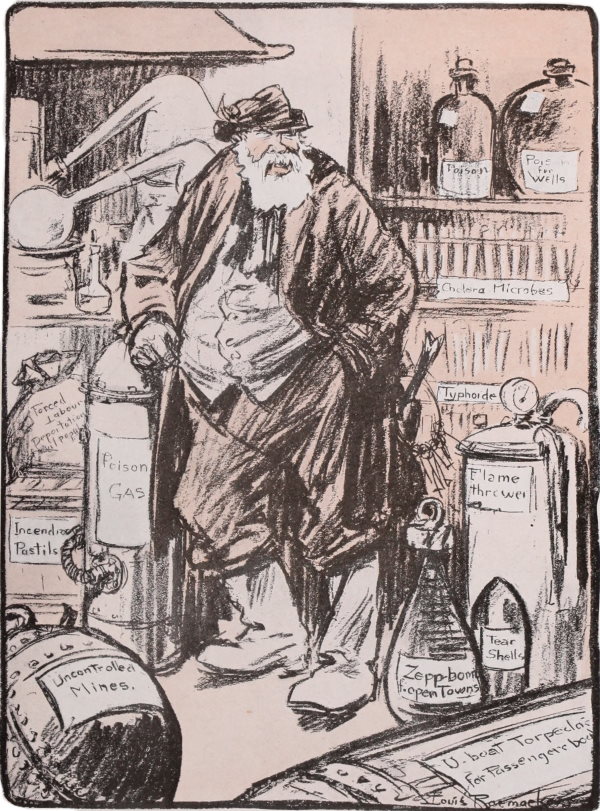
[Pg 196]
IT is not possible to judge Louis Raemaekers as an artist. He is a voice, a sword, a flame. His cartoons are the tears of women, the battle-shout of indomitable defenders, the indignation of humanity, the sob of civilization. They will go down into history. They are history. To take them, to turn page after page, is to know the European War, to see it face to face, as a child sees, and not through a glass darkly.
It is one of the great works of the world which he has done. Perhaps genius was only dormant, waiting for the cry of general catastrophe to bring it forth into vivid, terrific life. And yet—for who shall say that all things in heaven and earth are understood?—it may be that those same voices that called through the orchard of Domremy called to the cartoonist in the office of the Amsterdam “Telegraaf,” that into his simple soul, recommended to God by its love of flowers, there fell a tear from on high.
George Creel in “The Century Magazine,” June, 1917.
[Pg 197]
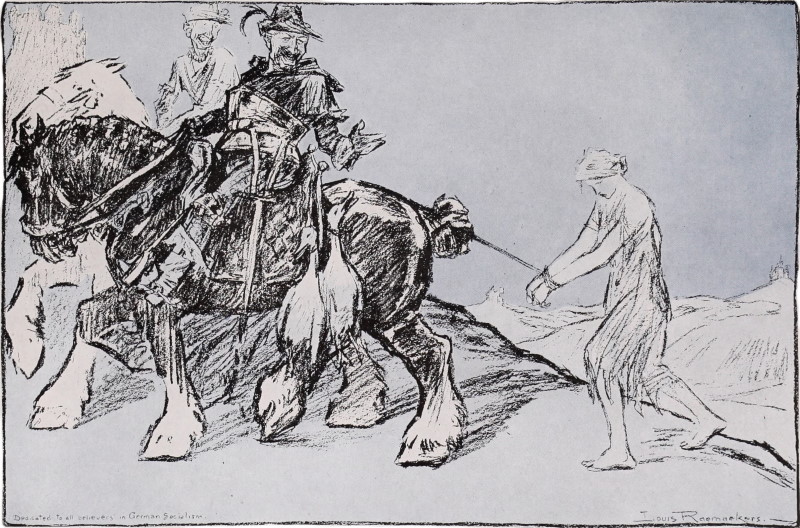
[Pg 198]
Striker to Agitator: “You speak very well, but when I see these fellows I’m ashamed I ever listened to you.”
RAEMAEKERS’ cartoons will prove an immortal comment on the great world war. He makes the world see that war does not create atrocities but that war itself is the supremest of all atrocities. When the names of battles have been forgotten the name of Raemaekers will be spoken with gratitude and reverence by coming generations.
CARRIE CHAPMAN CATT.
[Pg 199]
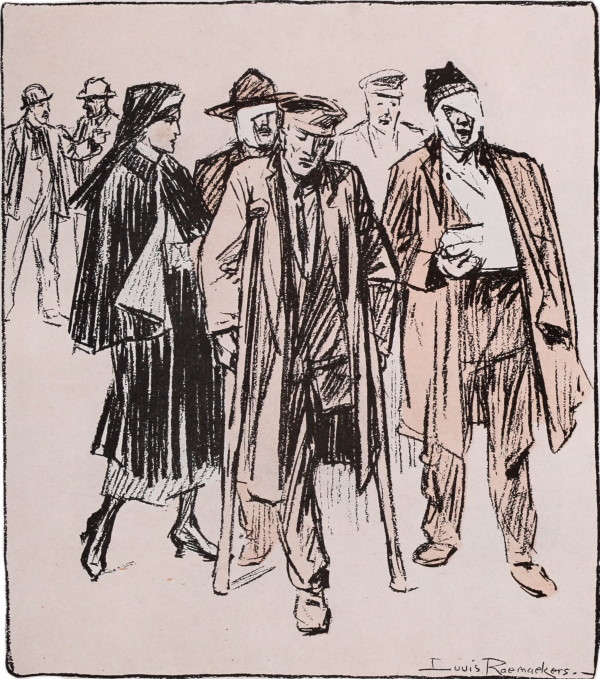
[Pg 200]
MEN, nations, and movements are symbolized by their moments of crisis. The long, tedious, humdrum years of life never get into picture, never fire human imagination; even though those years are the necessary foundations upon which great events rise. So America for nearly a century and a half has been symbolized—at least in European eyes—by that great moment when she rose in the world and asserted her independent status “among the nations of the earth.” The men of ’76 have stood for American valor, American military skill, American statesmanship. Now has come a time when “a decent respect for the nations of mankind requires” that Americans shall again stand for their portrait in history. This time we are standing among the civilized nations not for independence, but for interdependence! Where once we stood for a nation consecrated to freedom, now we stand for a community of nations consecrated to justice. Perhaps when the new portraits are painted in this great hour of crisis all the nations of the world will appear in history with new faces. The soldier of the revolution of ’76; the red-capped liberty girl of France, the conventional John Bull, the German war lord—all will “suffer a sea-change into something rich and strange.” And the old portraits that glimpsed the old truth about the old world shall in the new world have but an archaic interest!
WILLIAM ALLEN WHITE.
[Pg 201]
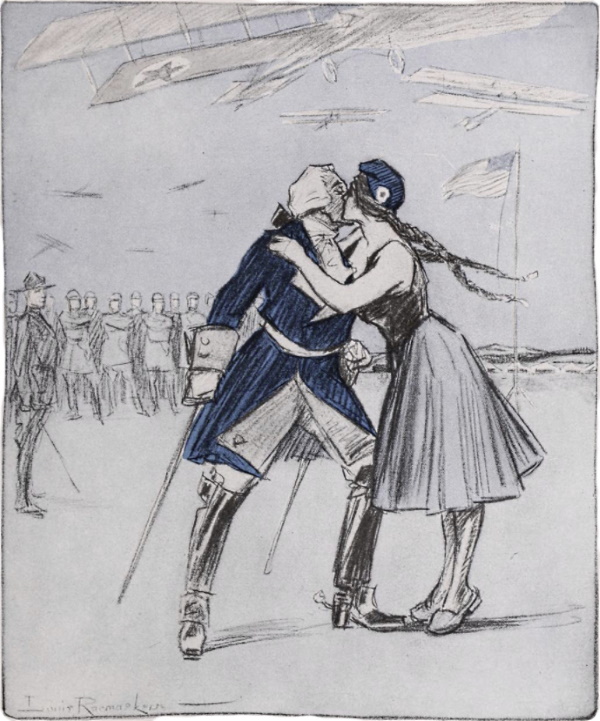
[Pg 202]
ALL of us who love the Old Germany we knew, who have dear friends there, and who have rejoiced in the happiness honest industrialism and widespread commerce were bringing to a great people before this terrible slaughter began feel a deep pang of sorrow as we look upon Raemaekers’ terrible picture of what the war has brought to Germania.
The dreadful pity of it is that Germania should have brought this upon herself by appealing to the Sword when the Temple of Peace stood open and all her present enemies were pleading that there should be no shedding of blood.
DAVID JAYNE HILL.
[Pg 203]
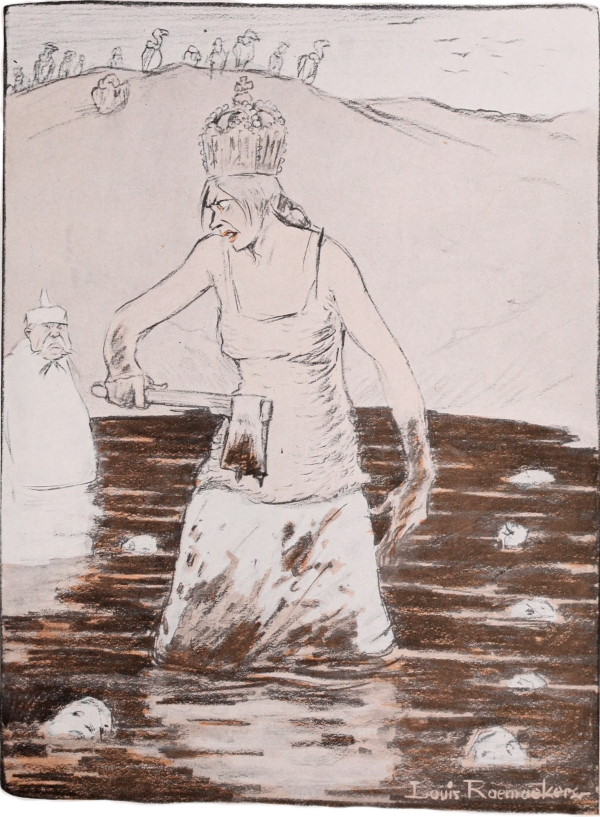
[Pg 204]
“Remember, Michaelis, every dog has his day!”
[Pg 205]
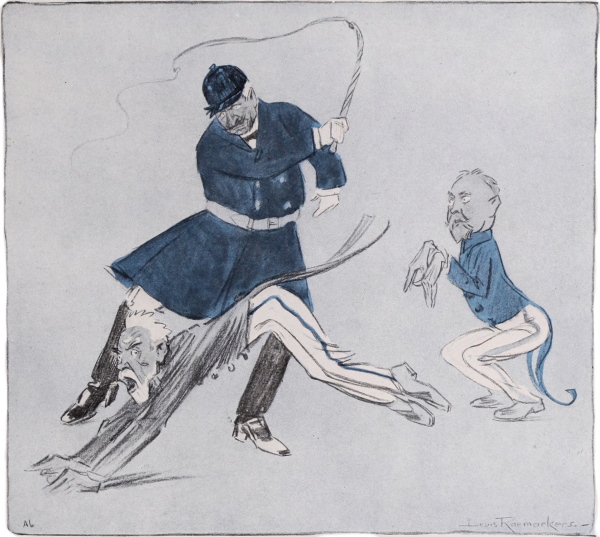
[Pg 206]
CALE YOUNG RICE.
[Pg 207]
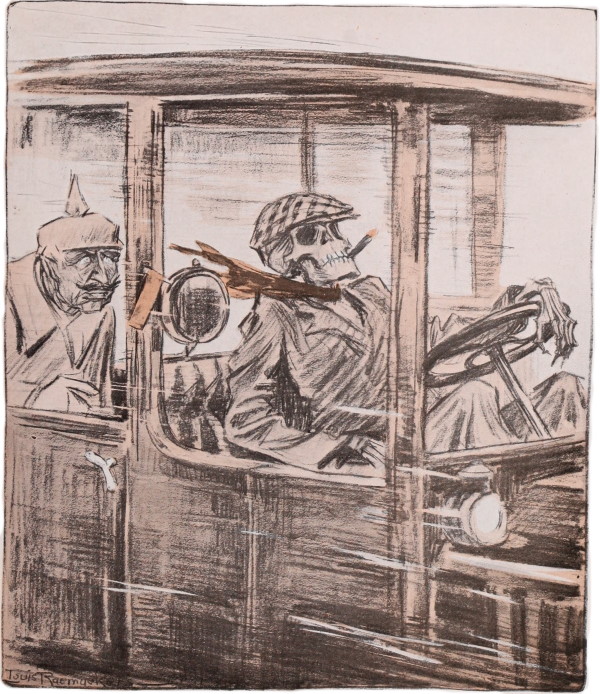
Transcriber’s Notes:
Variations in spelling and hyphenation are retained.
An exception is ‘Raemaekers’ for ‘Raemakers’ on page 174.
Punctuation has been retained as published.